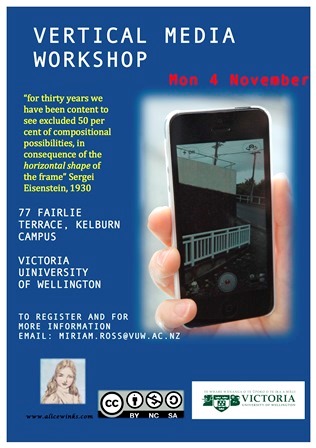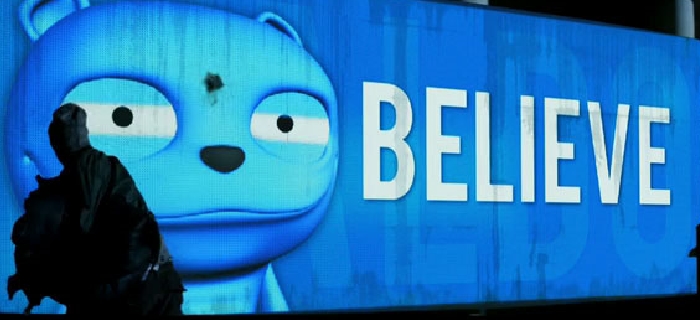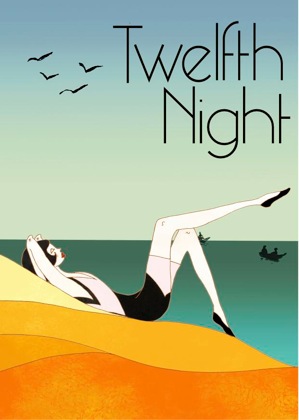Kathleen Kuehn
Kathleen Kuehn
Qualifications
BA Rutgers
MA Arizona
PhD Pennsylvania State
Current research projects
My research generally attends to the political economy of digital media/technologies and consumer culture. Current research projects center on:
- Digital privacy issues in New Zealand
- User/producer labour in digital cultural production
- Women's labour in the craft beer industry
Areas of supervision
- digital and social media
- surveillance
- digital labour
- creative labour
- branding and consumer culture
- political economy of media.
Recent publications
Books
Kuehn, K. M. (2016). The Post-Snowden Era: Mass Surveillance and Privacy in New Zealand. Wellington: BWB Texts.
Peer-Reviewed Journal Articles:
Kuehn, K. M. (2017). Framing Mass Surveillance: Analyzing New Zealand’s Media Coverage of the Early Snowden Files. Journalism.
Kuehn, K. M. (2016). Branding the self on Yelp: Consumer reviewing as image entrepreneurship. Social Media + Society, (October-December, 2016), 1-9.
Jackson, S. & Kuehn, K. M. (2016). Open source, social activism and “necessary tradeoffs” in the digital enclosure: A case study of platform co-operative, Loomio.org. triple-c, 14 (2).
Kuehn, K. M. (2015). Brand local: Consumer evaluations as commodity activism. Journal of Consumer Culture. [Online before print; print forthcoming].
Book Chapters:
Kuehn, K. M. (2016). An ‘Office Sex Romp’ and the Economic Motivations of Mediated Voyeurism. In H. Mandell and M. Chen (Eds.) Scandal in a Digital Age, pp. 119-130. London: Palgrave MacMillan.
View all publications by Kathleen Kuehn
Website
- Conferences
- Courses
- Exhibitions and Performances
- Information Events
- Other Events at Victoria
- Public Lectures
- Seminars
- Symposiums
- Theatre Productions
- University Community Events
- Workshops
The Cult of Cute: The Rise of Grotesque-Cute [Guro-Kawaii] as an Aesthetic and Affective Category
Date: 6 October 2016
Time: 12.00 pm
Presented by: Dr Cherie Lacey
Abstract:
Cuteness, or kawaii, is a growing trend in global popular culture, much of it flowing in and around East Asia. Some scholars (Dale 2016; Ngai 2012; Wittkower 2009) have declared cuteness to be one of the dominant aesthetics of digital and consumer culture. Yet, until very recently, little critical attention has been paid to this broad cultural phenomenon outside the fields of biology and psychology. In this paper, I will focus on one branch of cute: grotesque-cute (or guro-kawaii; otherwise known as ‘creepy cute’), which is personified in figures such as Waldo (from Black Mirror), Gloomy Bear, and the Japanese pop star Kyary Pamyu Pamyu. Specifically, I wish to explore our affective responses to the aesthetic category of grotesque-cute, which appears to imbue endearment with aggression, violence and revulsion.
Bio:
Dr Cherie Lacey received her PhD in Film Studies from the University of Auckland, and has lectured in film, media and writing studies in New Zealand and Australia. She has published both academic and creative writing and is most recently the co-editor of Extraordinary Anywhere: Essays on Place from Aotearoa New Zealand (VUP). Cherie is currently based at the International Institute of Modern Letters, where she’s writing a book-length essay on the manufacturing of emotion in the age of late capitalism.
Rory McKenzie & Marco Sonzogni
Date: 22 September 2016
Time: 12.00 pm
Venue: Room 103, 81 Fairlie Terrace (FT81/103)
Why can't you see the funny side?: An analysis of subtitling culture and humour
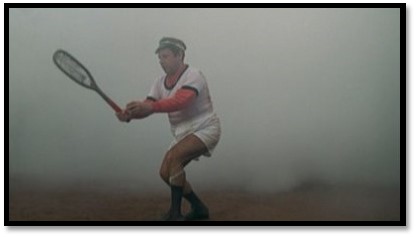
Abstract:
Humour is both universal and at the same time culturally specific. Anthropologists and sociologists as well as literary theorists and writers have amply demonstrated how deeply intertwined humour, culture, and language are. These difficulties confront a translator no matter what branch of translation, and they are challenging at the best of times. However they become even more difficult when physical restrictions are placed on the translation, as they are in the field of subtitling.
Traditionally dismissed as nothing more than a technical tool to enhance comprehension, quickly produced and cheaply made, subtitles are taken for granted and more often than not of poor quality. Yet subtitling is a growing strand of Translation Studies—academics and translators alike have been drawn to the challenge of negotiating meaning across languages and cultures in an extremely limited space.
This presentation will focus on the quintessential Italian comedic film character that is Fantozzi. We will first of all explore the character from a historical, cultural and comedic perspective, which will be followed by an analysis of the field of subtitling, the technical constraints that are placed on it, and some techniques that can be used to overcome these difficulties at both a linguistic and cultural level. We will conclude by providing both a cultural explanation of specific scenes, and propose how they can be translated to retain the linguistic humour present in the film.
Bios:
Rory McKenzie is a Masters student in Literary Translation Studies at Victoria University. His research to date has centered around the relatively new and, until recently, neglected form of inter-semiotic translation that is subtitling. Rory has started to develop an expertise in the field, having focused on the difficulties associated with subtitling and ways to overcome them; as well as having practical experience subtitling The Dark Horse (2014) into Italian.
Marco Sonzogni’s research revolves around the scholarly, creative and pedagogical aspects of literary translation. He is a widely published academic and an award-winning poet, literary translator and editor.
Dr Miriam Ross
Date: 8 September 2016
Time: 12.00 pm
Venue: Room 108, 85 Fairlie Terrace (FT85/108)
Stereotowns: A Videographic Work in 3D
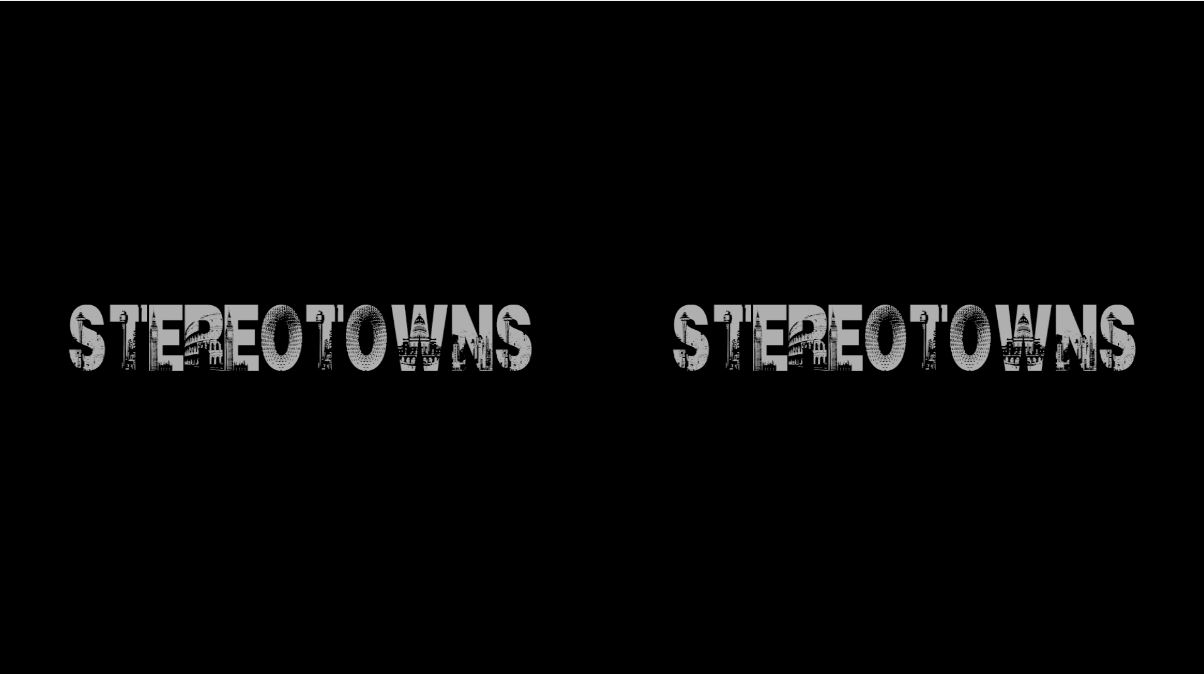
Abstract
In 2016, Miriam Ross and Jonathan Mines made an academic video essay, Stereotowns, dealing with the continuities between nineteenth century stereoscopic urban landscapes and more recent 3D Hollywood blockbusters. Produced in a period where there has been an explosion of academic videographic work, this was the first that was made in 3D – an attempt to sense and sensually work with the media to produce spatialized arguments that analyse and understand a hyper- spatialized visual form. This presentation will begin with a screening of Stereotowns and will then discuss the main findings of the video essay as well as the process of working with stereoscopic technology in this way.
Bio
Dr Miriam Ross is a senior lecturer in the Film Programme at Victoria University of Wellington. She is the author of South American Cinematic Culture: Policy, Production, Distribution and Exhibition (2010) and 3D Cinema: Optical Illusions and Tactile Experiences (2015).
Jonathan Mines is a research assistant in the Film Programme at Victoria University of Wellington. He completed his undergraduate study at Victoria University of Wellington and works as an editor and assistant director.
Dr Teresa Heinz Housel (Open Polytechnic)
Date: 11 August 2016
Time: 12.00 pm
Venue: Room 103, 81 Fairlie Terrace (FT81/103)
A Communication Perspective on LGBT Identity Constructions in Healthcare Contexts
Abstract:
LGBT people have worse health outcomes than their heterosexual counterparts in the United States. Among the major factors are inadequate healthcare access and lack of health insurance, and medical workers’ cultural incompetency in assisting LGBT clients. The result is a healthcare system that is not hospitable to LGBT people.
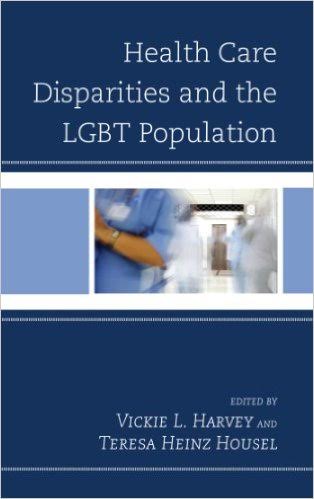 In light of this context, this talk highlights key points from selected essays in Dr. Housel’s recent co-edited book, Health Care Disparities and the LGBT Population. The essays use a critical communication perspective to examine how LGBT people negotiate identity in healthcare contexts. For example, one study examines how trans patients perform identities in the face of communicative micro-aggressions from healthcare providers. Another essay analyses how lesbians manage risks in disclosing sexual orientation to their physicians. Finally, the talk concludes with key points from a rhetorical analysis of media coverage, which argues that the silencing of LGBT people can be a resource for health-giving activism. Collectively, the studies argue that the American healthcare system should go beyond just providing universal insurance and ensure equality for all.
In light of this context, this talk highlights key points from selected essays in Dr. Housel’s recent co-edited book, Health Care Disparities and the LGBT Population. The essays use a critical communication perspective to examine how LGBT people negotiate identity in healthcare contexts. For example, one study examines how trans patients perform identities in the face of communicative micro-aggressions from healthcare providers. Another essay analyses how lesbians manage risks in disclosing sexual orientation to their physicians. Finally, the talk concludes with key points from a rhetorical analysis of media coverage, which argues that the silencing of LGBT people can be a resource for health-giving activism. Collectively, the studies argue that the American healthcare system should go beyond just providing universal insurance and ensure equality for all.
Bio:
Before relocating to Wellington in 2013, Dr. Teresa Heinz Housel was a tenured associate professor of Communication at Hope College in Michigan. She is an adjunct Communication faculty at the Open Polytechnic. In addition to co-editing three books, her research has appeared in Critical Studies in Media Communication, Journal of Critical Inquiry, and Information, Communication & Society. Her forthcoming co-edited publication, “Impact of Technology on Interpersonal Relationships,” will be published as a special edition of the Electronic Journal of Communication later this year. Her co-authored essay, “The Impact of Smartphone Educational Use on Student Connectedness and Out-of-Class Involvement,” will appear in the issue.
Philip Steer: Speculative Utopianism: Colonial Debt, Futurity, and Greater Britain
Date: 4 August 2016
Time: 12.00 pm
Venue: von Zedlitz Building, Room 802, Kelburn campus.
All welcome!
What might we find if we view New Zealand’s colonial writers as active participants in what the Victorians called “Greater Britain”? Utopian speculations about New Zealand not only engaged in a transnational debate over the location of British identity, but were caught up in disputes about the security of colonial investment following Julius Vogel’s borrowing in London under the Public Works Act and the subsequent collapse of New Zealand’s credit in 1878. Narratives such as Samuel Butler’s First Year in Canterbury Settlement (1863) helped establish the settler colony as a British space of guaranteed future returns, and this rhetoric was actively “leveraged” by Vogel to help stimulate huge levels of overseas investment. Horrified metropolitan reaction against such “speculative utopianism” is seen equally in The Economist and Trollope’s dystopian novel set in the South Pacific, The Fixed Period (1883), but investment continued even in the final decade of the century as New Zealand writers continued to locate British values in the settler colony: works such as Henry Crocker Marriott Watson’s Decline and Fall of the British Empire (1890) depict the future subordination of the metropolis to the colony at a moment when geopolitical pressures were redefining the empire as the basis of Britain’s global security.
Dr Trisha Dunleavy
Date: 28 July 2016
Time: 12.00 pm
Venue: Room 103, 83 Fairlie Terrace (FT81/103)
Complex Serial Drama on American Cable Television:The Case of Mad Men
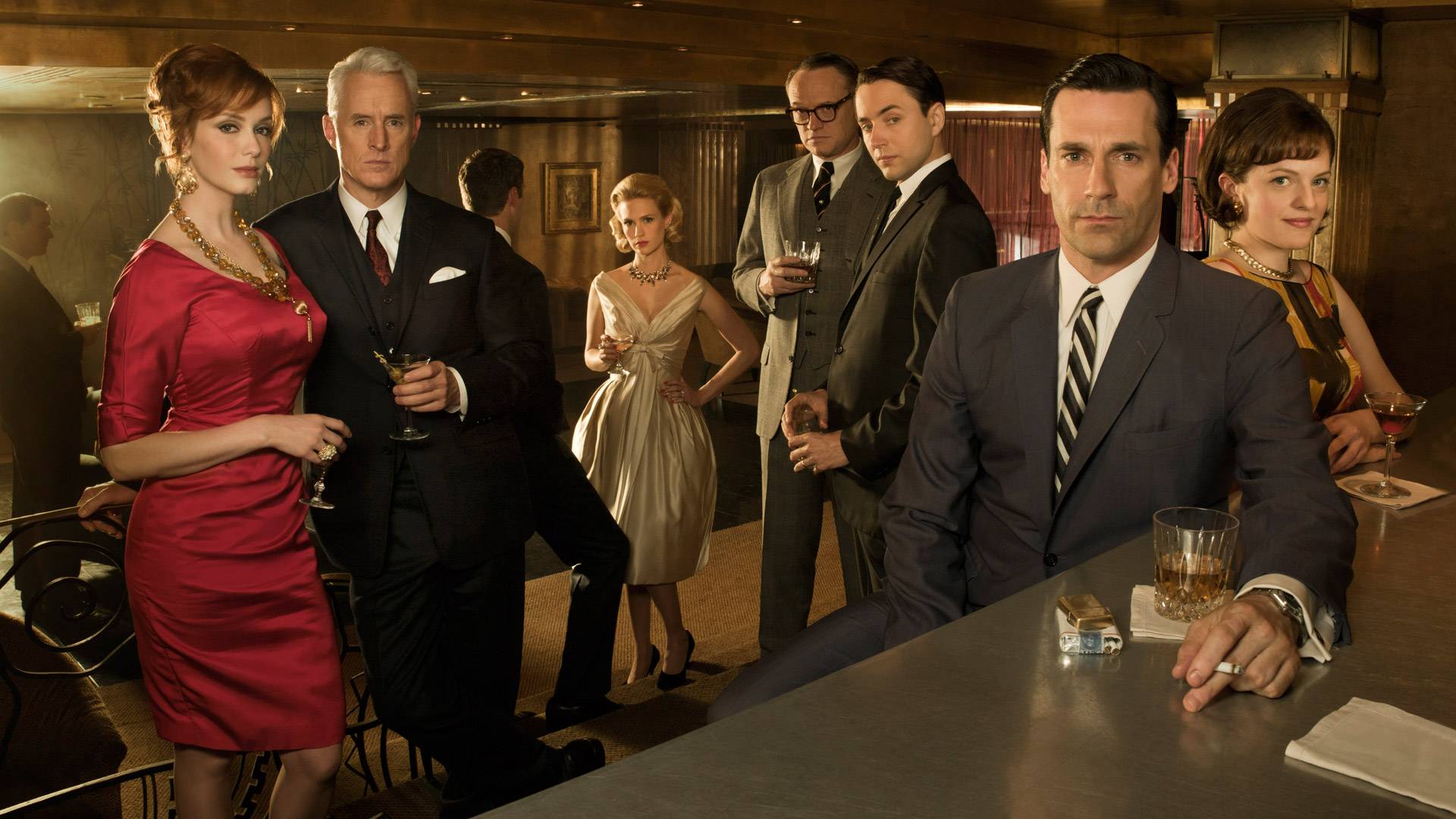 Abstract:
Abstract:
Mad Men (2007-15)AMC’s first attempt at a long-form ‘flagship’ drama, is an exemplar of the high-end serial form that first emerged on American cable networks HBO, FX, AMC, and Showtime, and was pioneered by The Sopranos. A TV drama form that this paper calls the ‘complex serial’, its hallmarks of conceptual originality, morally conflicted central characters, and narrative complexity have been integral to the attention and acclaim that its leading programmes have received, as well as to the disproportionate contributions of these to perceptions of a new ‘golden age’ for American television. Creatively influenced by its origination outside broadcast television, the ‘complex serial’ emerged in the early post-broadcast era, has been shaped by the conditions and opportunities of American cable TV, and has flourished as niche-audience rather than broad-audience programming. Central to the creative innovation and cultural achievements of this drama is its deployment of what this paper calls ‘complex seriality’, an approach to concept design, characterisation, and narration that is exemplified by Mad Men. Mad Men’s capacities in this regard are all the more interesting because it proved that this ‘complex serial’ form was not confined to subscription-based schedules and could emulate the critical acclaim, cultural influence, and popularity of HBO’s The Sopranos in a ‘basic cable’ environment. This paper uses Mad Men to investigate the narrative characteristics that distinguish ‘complex serial’ drama.
Bio:
Trisha Dunleavy is an Associate Professor in Media Studies at Victoria University of Wellington, New Zealand. Her research interests centre on television, in which the focal areas are high-end TV drama, related institutions and industries, and national screen production cultures. Her major publications are Ourselves in Primetime: a History of New Zealand Television Drama (Auckland University Press, 2005), Television Drama: Form, Agency, Innovation (Palgrave Macmillan, 2009), and, with Hester Joyce, New Zealand Film and Television: Institution, Industry and Cultural Change (Intellect, 2011). Her current research project is a single author book on American TV drama in the post-broadcast era.
Katherine Peet and Dr Jo Smith
Date: 19 July 2016
Time: 2.00 pm
Venue: MY305
Reflections on Treaty-based Multiculturalism and Host/Guest Relations: from the viewpoints of practice and theory
Abstract:
This seminar stages a conversation between two speakers exploring a politics of multiculturalism that takes the Treaty of Waitangi as its starting point.
The first speaker, Katherine Peet, will share insights for Treaty work gained from 30 years with Project/Network Waitangi Otautahi. These insights are based on study of the development of the social context and practices.
Media Studies scholar Jo Smith takes a more theoretical approach and draws on the concept of host/guest relations to consider the conditions necessary for promoting a Treaty-based politics of culture beyond a bicultural framework.
A key aim of the seminar is to explore the relationships between practice and theory so that we can expand our available vocabulary for understanding the politics of this place, Aotearoa/NewZealand.
Bios:
Katherine Peet was a secondary teacher and then moved into Adult and Community Education as an Organiser and an Educator.
Jo Smith (Waitaha, Kāti Māmoe, Kāi Tahu) is a Senior Lecturer in Media Studies at VUW.
Co-hosted by the School of Social and Cultural Studies Seminar Series
1816-2016 'The Year Without a Summer': A Bicentenary Symposium
Date: 3 June 2016
Time: 11.00 am
The catastrophic 1815 eruption of Mount Tambora in Indonesia triggered a global disaster. Blasting the top off the mountain, the eruption killed thousands and propelled masses of dust into the stratosphere where it circulated in a veil around the earth for years. One of the results was the ‘year without a summer’, with snowfalls and frosts in the summer months of 1816. The relentless bad weather inspired artists and poets, with William Turner recording the strangely spectacular sunsets in his paintings, Mary Shelley creating her apocalyptic novel Frankenstein, and Lord Byron composing ‘Darkness’.
This free, one-day interdisciplinary symposium will provide a platform for discussion about various expressions of art, literature, science, and thought during the ‘year without a summer’. There will be an opportunity to see some of the 1816 treasures from the Alexander Turnbull Library Rare Book Collection. This event is associated with Romantic Bicentennials (http://romantics200.org/).
Our keynote speaker is Dr Clara Tuite, from the University of Melbourne. She is the author of Romantic Austen: Sexual Politics and the Literary Canon (2002) and Lord Byron and Scandalous Celebrity (2015). She is currently working on a book on literary Romanticism and the media of romantic love, and, with Gillian Russell, an ARC-funded project on Regency Romanticism: Ireland, Britain, and Australia, 1788-1848. Dr Tuite’s travel is funded by the Faculty of the Humanities and Social Sciences, Victoria University of Wellington.
Our other speakers include experts about catastrophic volcano eruptions, colonial journals, extreme weather, Romantic travelers, and climate change. In addition: the 2016 class of ENGL 427 ‘Jane Austen: Body and Mind’ will give micro-talks about the research they have undertaken during the course.
Programme
11am
- Welcome: Anthony Tedeschi (ATL) and Dr Heidi Thomson (VUW)
- Keynote lecture by Assoc. Prof. Clara Tuite (U of Melbourne)When the Earth Moves: 1816 Then and Now
12pm
- Jane Austen: Body and Mind in 1816
- ENGL 427 Honours Students present their research about Jane Austen
1-2pm lunch break (National Library cafeteria or bring your own)
2-3pm
- Prof. John Gamble (VUW)Tambora, Indonesia, 1815 – The greatest volcanic eruption of historic times?
- Assoc. Prof. Anne Collett (Univ. of Wollongong)‘Some palates require higher seasoned vices’: Eruption and Response in Matthew Lewis’ Journal of a West India Proprietor (1816/1834)
3-4pm
- Erick Brenstrum (MetService)The Effects of the Little Ice Age in the 17th Century
- Steven Hampton (U of Melbourne)Utopia or Dystopia? The Romantics in Switzerland, 1816
- Prof. James Renwick (VUW) Climate and Major Volcanic Eruptions
Dr Alfio Leotta - 'I Love the Smell of Napalm in the Morning': Violence and Nostalgia in the Cinema of John Milius
Date: 14 April 2016
Time: 12.00 pm
Venue: 81 Fairlie Terrace, Room 103 (FT81/103)
All Welcome!
Abstract:
 John Milius, the screenwriter of Apocalypse Now (1979), the director of Conan the Barbarian (1982) and the creator of the HBO series Rome(2005-2007), is one of the most influential and yet controversial film-makers in contemporary Hollywood cinema. A self-proclaimed conservative, Milius has often been associated with controversial stances on guns, American imperialism and war. Milius' conservatism is reflected in his distinctive authorial signature characterized by a consistent set of stylistic and thematic concerns which echo the ideas of thinkers such as Nietzsche and Spengler. Very few film scholars have engaged with the critical analysis of Milius’ work. This article aims to fill a gap in the literature by focusing on the analysis of some of the reoccurring themes in Milius' cinematic oeuvre, in particular the nostalgia for a lost, idyllic past and a fascination with violence and barbarism. More specifically, the paper will examine the stylistic strategies deployed by Milius to articulate ideologically loaded constructions of violence and nostalgia.
John Milius, the screenwriter of Apocalypse Now (1979), the director of Conan the Barbarian (1982) and the creator of the HBO series Rome(2005-2007), is one of the most influential and yet controversial film-makers in contemporary Hollywood cinema. A self-proclaimed conservative, Milius has often been associated with controversial stances on guns, American imperialism and war. Milius' conservatism is reflected in his distinctive authorial signature characterized by a consistent set of stylistic and thematic concerns which echo the ideas of thinkers such as Nietzsche and Spengler. Very few film scholars have engaged with the critical analysis of Milius’ work. This article aims to fill a gap in the literature by focusing on the analysis of some of the reoccurring themes in Milius' cinematic oeuvre, in particular the nostalgia for a lost, idyllic past and a fascination with violence and barbarism. More specifically, the paper will examine the stylistic strategies deployed by Milius to articulate ideologically loaded constructions of violence and nostalgia.
Bio:
Dr. Alfio Leotta is a Senior Lecturer in Film Studies at Victoria University of Wellington. His primary research interests focus on the relation between film and tourism, national cinema, and the globalization of film production. His first book Touring the Screen: Tourism and New Zealand Film Geographies (Intellect, 2011) examines the phenomenon of film-induced tourism in New Zealand. Dr. Leotta is also the author of The Bloomsbury Companion to Peter Jackson (Bloomsbury, 2016).
Michael Bennett and Tim McKinnel - In Dark Places: The Teina Pora Case
Date: 6 April 2016
Time: 5.00 pm
Venue: Hugh Mackenzie Lecture Theatre 104
All welcome!
Abstract:
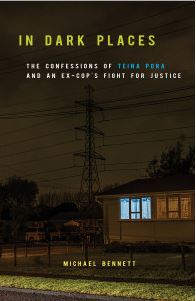
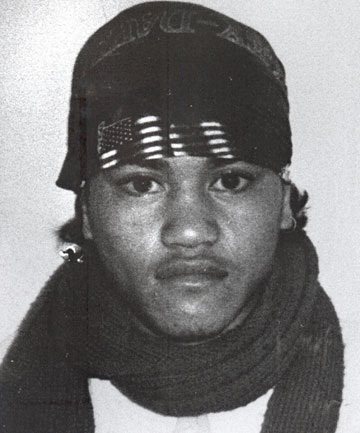 Teina Pora, a 17-year-old car thief, was wrongly convicted and sentenced to life in prison for the murder of Susan Burdett, who had been beaten to death with the softball bat she kept next to her bed for her own protection. Tim McKinnel, an ex-cop turned private investigator, discovered the long forgotten case 18 years later, saw an injustice had been done and set out to win Teina’s freedom.
Teina Pora, a 17-year-old car thief, was wrongly convicted and sentenced to life in prison for the murder of Susan Burdett, who had been beaten to death with the softball bat she kept next to her bed for her own protection. Tim McKinnel, an ex-cop turned private investigator, discovered the long forgotten case 18 years later, saw an injustice had been done and set out to win Teina’s freedom.
Reaching from the mean streets of South Auckland to the highest court in the Commonwealth, this is the story of New Zealand's worst miscarriage of justice, and the long battle to win freedom for an innocent man. This case is a fascinating insight into the psychology of false confessions, the safety of the New Zealand justice system, and the role of media in raising public awareness of the injustice.
Bios:
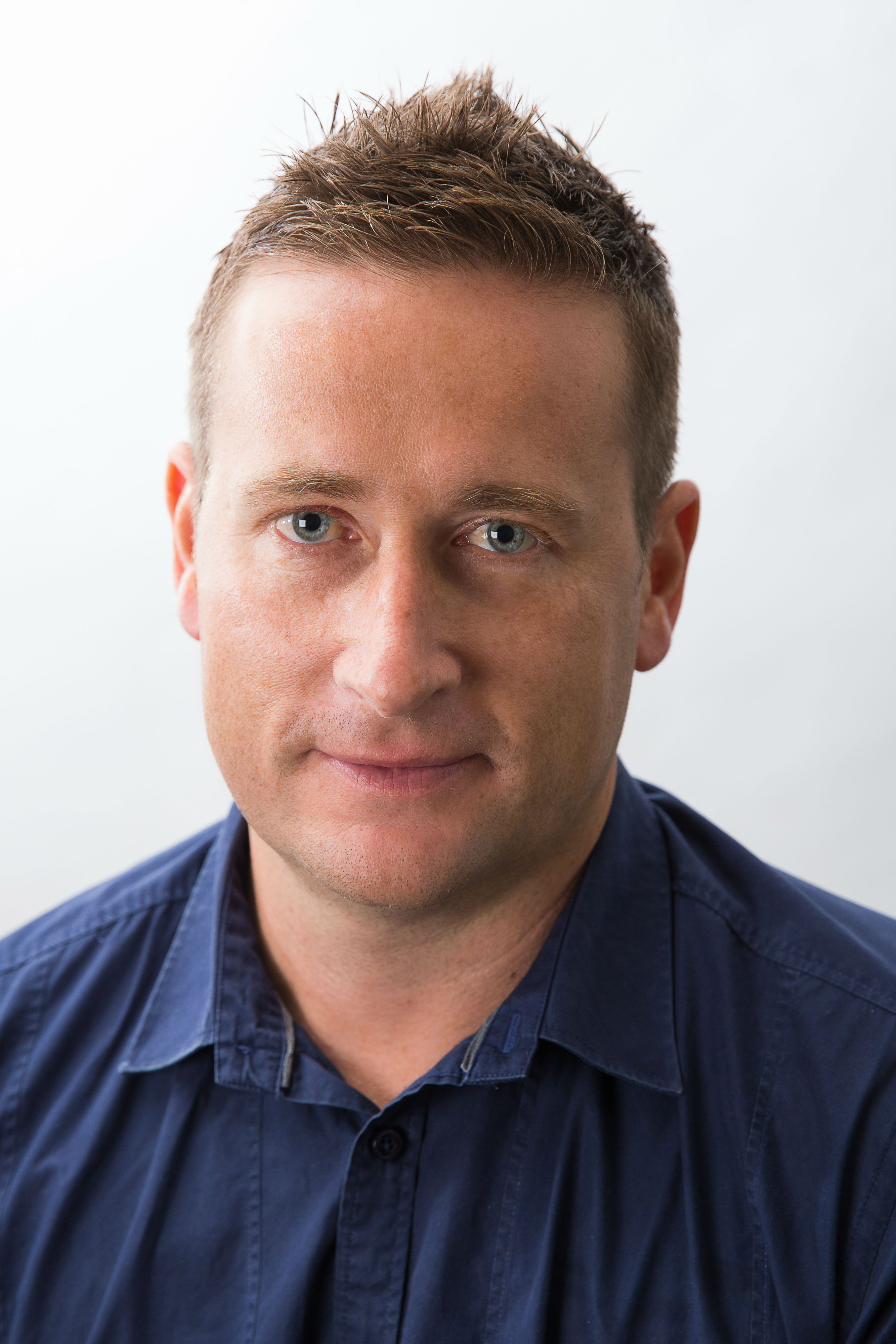
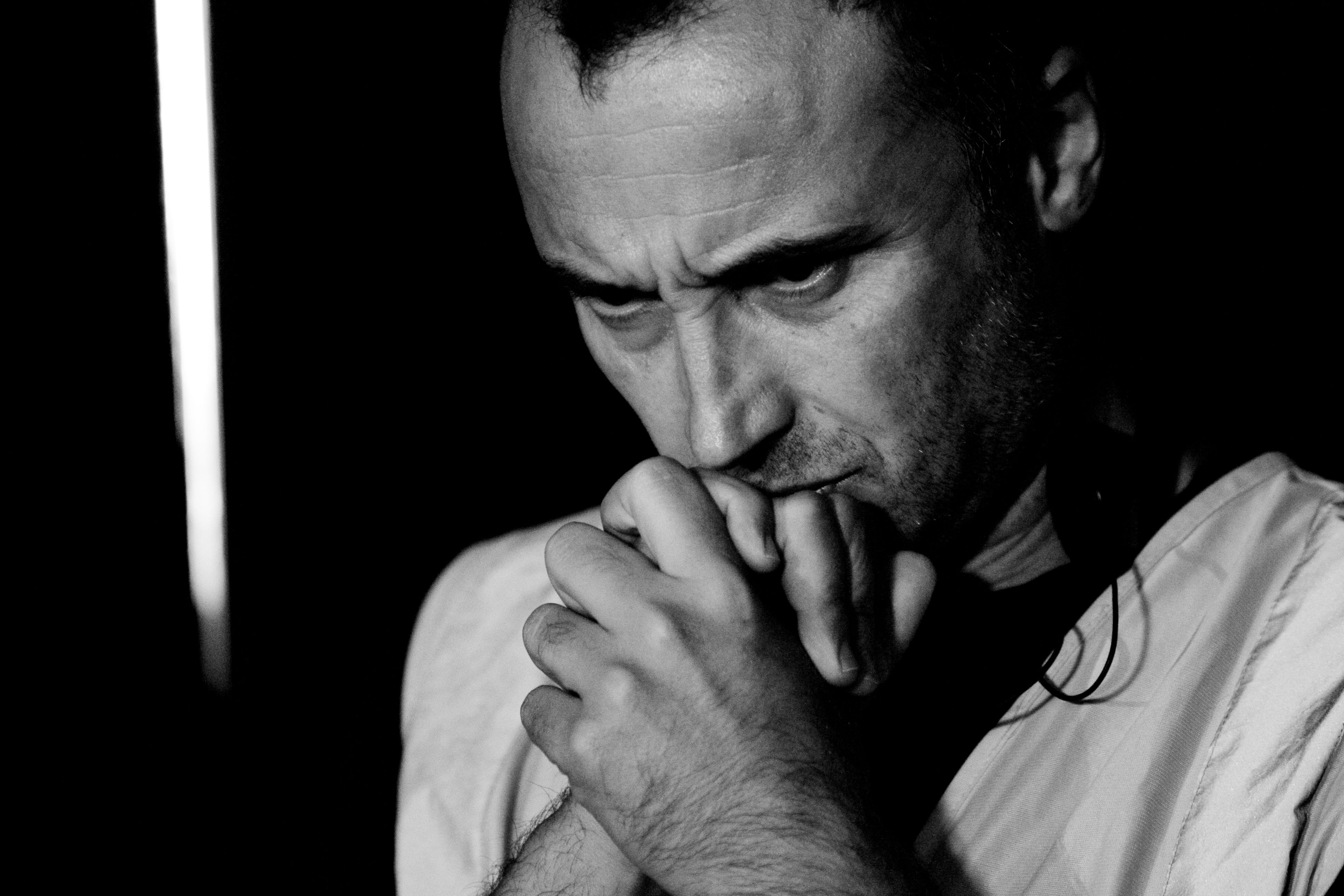 Tim McKinnel is the investigator who drove the fight to overturn Teina Pora’s convictions.
Tim McKinnel is the investigator who drove the fight to overturn Teina Pora’s convictions.
Michael Bennett is the author of the book on the case In Dark Places and writer/director of the award-winning documentary The Confessions of Prisoner T.
Dr Kathleen Kuehn - 'They Should Have Turned the Lights Out!': The Economics of Mediated Voyeurism in the 'Christchurch Sex Romp' Scandal
Date: 31 March 2016
Time: 12.00 pm
Venue: 81 Fairlie Terrace, Room 103
All welcome!
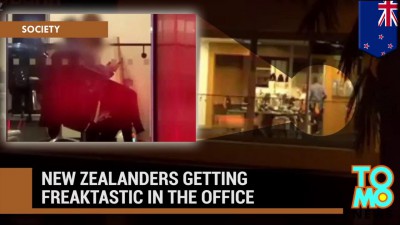 Abstract:
Abstract:
In 2015, patrons at a local Christchurch pub witnessed, recorded and distributed videos and photos of two co-workers having an extramarital sexual affair in an adjacent office building. As images went viral, the wife and fiancé of the couple involved reportedly learned of their infidelity through Facebook, just like everyone else. Using the ‘Christchurch office sex romp’ as a case study, this talk examines the relationship between surveillance, scandal and social media. An analysis of global news reports about the event are read within the context of contemporary surveillance society: that is, a society in which post-panoptic, lateral monitoring make up an increasingly central part of contemporary cultural practice. This research argues that the production, circulation and ‘democratization’ of scandal (or at least the democratization of those caught in a scandal) can be understood as symptomatic of a society that is neither critical nor reflexive about the economic value that motivates surveillance at the expense of other social, cultural, or ethical concerns. This case study thus illustrates that the productive value of surveillance as entertainment -- what journalism scholar Clay Calvert calls “mediated voyeurism” – is particularly instrumental to the process of normalizing surveillance in societies of control.
Bio:
Dr Kathleen M. Kuehn is a lecturer in media studies at Victoria University of Wellington whose research interests centre on the political economy of digital media, cultural production and surveillance. She has been published across a number of academic journals including The Journal of Consumer Culture, The Political Economy of Communication, Communication, Culture & Critique, International Journal of Communication, and is the author of the forthcoming book, The Post-Snowden Era: Mass Surveillance and Privacy in New Zealand (BWB Texts).
Symposium: Writing The Stain of Blood: A Symposium on Poetry and History
Date: 4–5 December 2015
Time: 9.00 am
Venue: Victoria University of Wellington
Writing 'The Stain of Blood': A Symposium on Poetry and History will be held at Victoria University of Wellington on 4–5 December 2015.
"Poetry and history, poetry and society, poetry and politics: for some of us, these phrases pair virtual antonyms” – Clare Cavanagh, “Poetry and History: Poland's Acknowledged Legislators"
"Once one divides the world into history and poetry, then one obliterates the difference between a history…which is habitable and human, and the kind which produces concentration camps" – Adam Zagajewski, Two Cities: On Exile, History and the Imagination
"Poetry is a more philosophical and better thing than history, since poetry states more universal things whereas history states particular things" – Aristotle, Poetics
Does poetry 'make nothing happen'? What has it done historically and what can it still do? Does poetry embody the histories of different peoples or is it symptomatic of communal experience? Can it contest dominant narratives, poetic and otherwise? How can it reconstruct lost histories? What are the responsibilities to the facts, or in respect of the ownership of the stories? What forms and structures have been used by poets of history, and what do they bring to the telling of history? What subjects do historical poems explore and why? Who are the poets writing history, and what histories are they telling? Is the most powerful contemporary poetry largely invisible within the academy, making history elsewhere?
This two-day symposium at Victoria University of Wellington will explore questions such as these through academic papers, panel discussions and poetry readings. Proposals for papers and panel discussions addressing the relation between history and poetry should be sent to Anna Jackson, at anna.jackson@vuw.ac.nz, before 6 November 2015. Earlier proposals or expressions of interest are very welcome. Late proposals will probably still be considered.
Anna Jackson teaches in the English Programme at Victoria University of Wellington.
A Digital Duet- Alan Liu & Patricia Fumerton
Date: 1 December 2015
Time: 1.00 pm
Venue: Stout Research Centre, Kelburn Campus
1:00 - 2.30pm Prof. Alan Liu - UC Santa Barbara & Visiting Fulbright Specialist, UCanterbury
Presenting Key Trends in Digital Humanities
3:00 - 4:30pm Prof. Patricia Fumerton- UC Santa Barbara & Director, English Broadside Ballad Archive
Presenting Samuel Pepys & the Making of Ballad Publics: Song, Performance, Identity
RVSP by 27 November Sarah.Ross@vuw.ac.nz
NZ Film On-Demand: Searching for National Cinema Online
Date: 15 October 2015
Time: 12.00 pm
Venue: Room 103, 81 Fairlie Terrace
Dr Ian Huffer (Massey University)
Abstract: This paper examines how the concept of ‘New Zealand Cinema’ is both constructed and complicated by Video On Demand (VOD) websites available in New Zealand. As Vitali and Willemen state, questions of national cinema include consideration of cinema ‘as an industry and a cluster of cultural strategies’ (2006: 2). New Zealand Cinema has been seen to be increasingly transnational in both of these facets. Nevertheless, the concept of the nation continues to play an important role in the operations of the New Zealand Film Commission. This paper considers how VOD sites available within New Zealand contribute to this set of relations, examining the degree to which the organisation of these sites’ catalogues emphasise films’ national and/or transnational characteristics. This has implications for the importance that audiences may attach to New Zealand as a way of understanding cinema and themselves. It also has implications for the visibility of films that explore the national-cultural specificities of New Zealand. This paper will consequently gauge the effects of any such emphasis upon, or elision of, the nation as a way of categorising cinema, while also contextualising this in relation to the power relations (between industries and cultures) constituted through VOD distribution.
Bio: Ian is a Lecturer in Media Studies at Massey University. His research is primarily focused upon the social, cultural and economic relations constituted through the circulation and consumption of film. His recent work has examined theatrical film exhibition and online DVD rental in New Zealand (Studies in Australasian Cinema, Vol 5, Issue 3 & Vol 6, Issue 2; Watching Films: New Perspectives on Movie-Going, Exhibition and Reception, K.Aveyard and A.Moran [eds] 2013). He is currently writing up analysis of a nationwide survey of New Zealanders’ film consumption habits.
"A Call to Arms" - Documentary and Climate Change
Date: 1 October 2015
Time: 12.00 pm
"A Call to Arms" - Documentary and Climate Change
Dr Angi Buettner
Abstract
There has been a significant increase, over the last decade, in media, communication, and cultural studies analyses of climate change communication. Whilst there has been increased recognition of sites central to the mediation of climate change other than news reporting or science communication (such as visual communication), popular culture as a field has not been the focus of sustained attention as an important site for the construction and circulation of discourses, meanings and narratives regarding climate change. This talk discusses the contribution of climate change documentary to this kind of discursive production. It argues that in order to evaluate the potential effectiveness of documentary in the communication, debate, or possibly even activism on climate change, media and cultural studies need to develop research questions and methodologies that take into account the genres, logics and imperatives of popular culture.
Bio
Angi Buettner is a Senior Lecturer in Media Studies at Victoria University of Wellington, New Zealand. She researches in media and cultural studies as well as in environmental communication. She is the author of Holocaust Images and Picturing Catastrophe: The Cultural Politics of Seeing (Ashgate, 2011) and co-author of Understanding Media Studies;(Oxford, 2010).
Free public screening of 'Rome, Open City'
Date: 22 September 2015
Time: 7.00 pm
Venue: City Gallery Wellington
Victoria University of Wellington's Film, History and Italian Programmes, with the support of City Gallery Wellington and the Embassy of Italy, invite you to a screening of Roberto Rossellini's neorealist masterpiece Rome, Open City, on the occasion of the seventieth anniversary of its first release. This event is part of Victoria's '1945-2015: Legacies of Loss and Liberation Seminar Series'.
Otto Preminger said that the history of cinema is divided into two eras: one before and one after Rome, Open City. At once raw and polished, classical and revolutionary, conservative and progressive, universal and firmly rooted in its time and place, Rome, Open City is both the paradigm of Italian Neorealism and perhaps the least 'neorealist' of its works. Shot while the war still raged, and set in 1944 during the Nazi occupation of Rome, the film chronicles the life of Pina (Anna Magnani) and the ordinary Romans of her working class tenement in their struggle for survival and resistance. Constantly beset by tragedy, they are unmistakably suffused with the hopes and urgency of the Liberation. Rossellini's work remains today a unique depiction of an occupied city: a film charged with an uncompromising yet deep-seated empathy that has ensured its enduring global legacy.
To reflect on the film's legacy seventy years after the end of World War Two, the screening will be followed by a panel discussion and Q&A, featuring New Zealand filmmaker Stuart McKenzie, and Victoria University's Claudia Bernardi (Italian), Thierry Jutel and Alfio Leotta (Film), and Giacomo Lichtner (History).
The event is free and open to the public, but spaces are limited.
Contact: giacomo.lichtner@vuw.ac.nz, or phone 04 463 6756.
Seminar Hypnotic Crimes
Date: 17 September 2015
Time: 12.00 pm
Title: Hypnotic Crimes: Influence and Imitation in Serial Killer TV
Abstract: Contemporary crime television series such as Hannibal, The Following, and The Mentalist have featured a criminal mastermind who stages astonishing (and frequently vicious) crimes, manipulates others to commit murder on his behalf, and evades law enforcement authorities with contemptuous ease. I will argue that the master serial killer influences, controls, or even hypnotises his followers in a manner reminiscent of the despotic leader of crowds theorised by Gustave Le Bon and Sigmund Freud. The submissive behaviour of his acolytes can be understood as an extreme example of suggestibility and/or discipleship. My paper will explore the crises of subjectivity entailed by these power relations in terms of hypnosis and crowd theory.
Bio: Dr Tim Groves is a Senior Lecturer in the Film Programme at Victoria University of Wellington.
Book Launch of "The Urewera Notebook by Katherine Mansfield" edited by Anna Plumridge
Date: 2 July 2015
Time: 5.30 pm
Otago University Press invites you to celebrate the launch of The Urewera Notebook by Katherine Mansfield edited by Anna Plumridge.
5.30 pm Thursday 2 July 2015
Vic Books, Easterfield Building, Victoria University of Wellington
RSVP by Monday 29 June
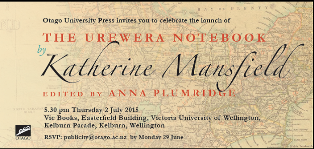
VUP Book launch: 'Wonky Optics' and 'Half Dark'
Date: 24 February 2015
Time: 5.30 pm
Venue: Vic Books, Kelburn Parade
Victoria University Press warmly invites you to the joint celebration of new books by two of Wellington's best-loved poets:
- Wonky Optics by Geoff Cochrane
- Half Dark by Harry Ricketts.
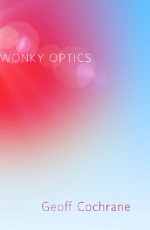
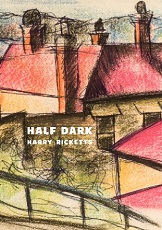
Wonky Optics is Geoff Cochrane's fifteenth collection of poems. He is also the author of two novels, and Astonished Dice: Collected Short Stories (2014).
Half Dark is deftly crafted from the splinters and spaces of the past. Harry Ricketts has written and edited more than twenty-five books, including literary biographies, personal and critical essays, and poetry.
Please join Geoff and Harry at Vic Books, Kelburn Parade at 5.30pm–7pm on Tuesday 24 February. They will give short readings, followed by a book signing.
Refreshments will be served.
All welcome.
Tutoring for 2014
Date: 6 January 2015
Time: 8.16 am
Expressions of interest are invited from university graduates to work part-time as tutors in undergraduate English, Film, Theatre, and Media Studies courses for 2014. It is expected that successful applicants will have an Honours degree or higher. Applications are particularly encouraged from current and intending postgraduate students.
Pay will be at rates set under the Tutors Collective Agreement ($20.10–$26.89 per hour, depending on qualifications and experience).
Tutoring roles are characterised by the following set of basic conditions or expectations:
- Tutorials usually occur for one hour, per course, per teaching week;
- Tutorials are designed to provide: opportunities for small group discussion and interaction; learning support for course material and lectures; in-class advice as to the completion of assignments;
- Tutorial teaching begins in the second week of trimester and involves eleven weeks of actual teaching;
- Tutorials comprise up to 18 students per class;
- Tutorials (while their coverage may be directed by the Course Coordinators) are planned and resourced by individual class tutors;
- In addition to preparing and running tutorials, a tutoring role involves a few hours each week for student consultation and additional hours during the trimester for the marking of student assignments;
- Tutors are expected to attend regular meetings with the Course Coordinator during the trimester, and one end-of-course examiners' meeting, and possibly attend the lectures for courses on which they work.
See the Course Finder for the 2014 undergraduate courses we will be offering.
To Apply
Email us attaching:
- a covering letter;
- your CV;
- the application form (Excel 18 KB);
- supervisor approval email if you are a postgraduate student;
- a copy of your work visa if applicable.
Decisions will be made by early-February 2014.
Hobbit trilogy audience survey: 'Most ambitious ever'
Date: 11 December 2014
Time: 10.27 am
The release of a worldwide survey on the Hobbit trilogy, designed to understand what fantasy means to people around the world, will coincide with the launch of the third movie on 12 December.Researchers in 46 countries, including New Zealand, will be collaborating to capture responses in more than 30 languages, including te reo Māori.
Victoria University of Wellington researchers Dr Joost de Bruin and Dr Lauren Anderson, the New Zealand representatives of the project, say this is the most ambitious research project ever undertaken into film audiences. They hope that New Zealanders will get behind the survey to ensure that the perspective of audiences in this country is well-represented.
"The survey looks at questions such as what audiences particularly enjoyed about the films, what kind of films they think The Hobbit trilogy are and what the influence is of having read the book," says Dr de Bruin. "We are also interested in finding out the responses of different groups and communities of people from countries as diverse as the United States, China, South Africa, Japan, Brazil, India, Finland and New Zealand.
"As New Zealand academics, Lauren and I are also interested in finding out how the fact that these films were shot in the landscape of Aotearoa New Zealand contributes to the image that overseas viewers have of this country and whether there are implications for tourism."
The research expands on a worldwide Lord of the Rings film audience project conducted in 2003 and 2004.
To complete the survey, which should take no more than 20 minutes, visit www.worldhobbitproject.org.
FILM 210 students create portraits of everyday Kiwis
Date: 2 December 2014
Time: 10.38 am
Students in FILM 210: Introduction to Film Production were asked to produce a portrait of themselves, or someone else, as their final short film project. The brief was to create a piece that says something meaningful about the person, their understanding of the world, an experience that has shaped them significantly, or provides insight into another person's life.
The students produced films covering a range of topics, from the subtle philosophy of a farmer (All Flesh Is Grass) to a dialogue-free impressionistic piece about the soothing effect of music (Music Therapy), to a young woman with an intellectual disability who is unable to speak (Alice).
In their films, the students use many of the techniques, narrative approaches and visual methodologies that they have been taught in class. The films are shot with very limited resources, such as a handycam and a simple sound recording device.
"All the films treat their subjects and viewers with respect and employ visual means of communicating their stories really effectively," says film lecturer Dr Paul Wolffram.
"In the class I encourage the students to take risks and expose something of themselves, who they are and what they feel passionate about. I teach them that drama and real narrative power is achievable in short non-fictional film works if you expose and explore real emotions and genuine feelings."
"This year’s class was remarkable and I’m very pleased with the results that came out of it."
Eight of the films from this class can now be viewed on Vimeo:
Responsibility by Jennifer Smith
#Abi4Mayor by Katie Ayling
Music Therapy by Tori Miller
More to Me by Jesse Strong
Child of the Forest by Annie Sanders
TTM by Anna Hulley
All Flesh Is Grass by Henry Bennison
Alice by Lucy Holyoake
Goodbye Middle Earth
Date: 2 December 2014
Time: 10.34 am
Associate Professor Thierry Jutel and Dr Alfio Leotta from the School of English, Film, Theatre, and Media Studies, wrote an opinion piece on what will happen to the association between Middle-Earth, New Zealand, and global Hollywood after the last Hobbit film comes out. The article was published in The Dominion Post on 2 December 2014 and can be read in full on the Victoria news page."Voices of the Land" nominated for 4 New Zealand Film Awards
Date: 1 December 2014
Time: 10.41 am
Congratulations to Dr Paul Wolffram whose feature length documentary film "Voices of the Land - Nga Reo O Te Whenua" has been nominated for Best Film, Best Director, Best Editing, and Best Cinematography in the Documentary Section at The Rialto Channel NZ Film Awards.Theatre Senior Lecturer receives Victoria Teaching Excellence Award
Date: 28 November 2014
Time: 10.43 am
Congratulations to James McKinnon, Senior Lecturer and Theatre Programme Director who has received a Victoria Teaching Excellence Award. James has been implementing some innovative teaching approaches and providing leadership in the Theatre Programme in relation to curriculum, delivery and assessment.SEFTMS Equity Committee Wins Award
Date: 26 November 2014
Time: 10.47 am
Congratulations to the SEFTMS Equity Committee for winning the Victoria Equity and Diversity Award. The School and the Faculty of Humanities and Social Sciences are very grateful to the Committee (both current and past members) for the work they have done and resulting benefits for our students.Tutoring for 2015
Date: 17 November 2014
Time: 10.48 am
Expressions of interest are invited from university graduates to work part-time as tutors in undergraduate English, Film, Theatre, and Media Studies courses for 2015. It is expected that successful applicants will have an Honours degree or higher. Applications are particularly encouraged from current and intending postgraduate students.
Pay will be at rates set under the Tutors Collective Agreement ($20.36–$27.24 per hour, depending on qualifications and experience).
Tutoring roles are characterised by the following set of basic conditions or expectations:
- Tutorials usually occur for one hour, per course, per teaching week;
- Tutorials are designed to provide: opportunities for small group discussion and interaction; learning support for course material and lectures; in-class advice as to the completion of assignments;
- Tutorial teaching begins in the second week of trimester and involves eleven weeks of actual teaching;
- Tutorials comprise up to 18 students per class;
- Tutorials (while their coverage may be directed by the Course Coordinators) are planned and resourced by individual class tutors;
- In addition to preparing and running tutorials, a tutoring role involves a few hours each week for student consultation and additional hours during the trimester for the marking of student assignments;
- Tutors are expected to attend regular meetings with the Course Coordinator during the trimester, and one end-of-course examiners' meeting, and possibly attend the lectures for courses on which they work.
See the Course Finder for the 2015 undergraduate courses we will be offering.
To Apply
Email us attaching:
- a covering letter;
- your CV;
- the application form (Excel 18 KB);
- supervisor approval email if you are a postgraduate student;
- a copy of your work visa if applicable.
Decisions will be made by early-February 2015.
Seminar - Kathryn Walls: “The Wedding Feast as Communion in The Rime of the Ancient Mariner”
Date: 13 November 2014
Time: 12.50 am
Kathryn Walls
Kathyrn Walls teaches in the English Literature Programme at Victoria University of Wellington.Interview: History and Future of TV in NZ
Date: 11 November 2014
Time: 10.50 am
RadioLive interviewed Dr Trisha Dunleavy, Associate Professor in Media Studies about the history and future of television in New Zealand (audio player: 11 minutes 19 seconds).Television article featured in NZ Encyclopedia Te Ara
Date: 5 November 2014
Time: 10.51 am
Congratulations to Dr Trisha Dunleavy, Associate Professor in Media Studies whose story on Television is now included in New Zealand Encyclopedia, Te Ara.A tribute to Agnes Owens
Date: 15 October 2014
Time: 10.53 am
Rupert Pirie-Hunter, an English Literature Programme postgraduate student wrote a tribute which Overland Literary Journal published, to acknowledge the passing of Agnes Owens, the subject of his MA thesis.Flying Trapeze Fundraising for Wellington
Date: 30 September 2014
Time: 10.54 am
The Dominion Post interviewed Wellington Flying Trapeze president, Dr Miriam Ross (Film Lecturer) and Wellington Circus Trust about their $25,000 fundraising to build New Zealand's only permanent, year-round flying trapeze rig at the Circus Hub in Newtown.Theatre PhD Student wins 3 Minute Thesis Competition
Date: 29 September 2014
Time: 10.56 am

An Italian PhD student is the winner of this year's Three Minute Thesis competition, held in the Hunter Council Chamber on Friday.
Michele Fontana, from the Faculty of Humanities and Social Sciences (FHSS), took top honours and prize money of $3,000 from a field of nine finalists.
Organised by the Postgraduate Student Association, the event challenged master's and PhD candidates to boil down years of work into a three-minute presentation, which would be understood by a lay audience.
Michele, a School of English, Film, Theatre, and Media Studies student, delivered a presentation on the science museum he has created inside a pizza box. He says his career goal is to put the results of his research into practice by developing effective programmes for museum visitors.
In addition to the cash prize, Michele will represent Victoria at the Trans-Tasman Final at the University of Western Australia in Perth on 3 November.
There were 96 entrants in the event this year, a record high for Victoria since the competition began in 2010. The contestants, from across faculties, presented talks on everything from collaborative teaching styles to trying to pin down the causes of autism.
Second prize of $1,000 was awarded to another FHSS student, Melanie Revis, who also won the People's Choice trophy. Third place was shared, with a cash prize of $250 each, between science PhD students Wilfred Kittler and Ryan Kyle.
Information Management student Fahimi Md Ali won the $250 International Award, sponsored by Victoria International. Chemical and Physical Sciences student Ruth Corkill won the Honours Award presented during the faculty rounds.
A video of the finalist presentations will be available soon.
English student leads youth engagement publication
Date: 12 September 2014
Time: 10.58 am

Ours, the brainchild English major Asher Emanuel and fellow law and arts student Ollie Neas, showcases the voices and views of young people online daily, and in print each week in the New Zealand Herald, in the lead up to the 2014 general election.
Ollie says Ours began after seeing how young people were unengaged with politics.
"We believed that this is more a consequence of the way politics is done, rather than the result of some deep-seated apathy in young people. We wanted to find a way to get young people from across New Zealand speaking to other young people."
With youth voter turnout at the last general election the lowest ever, Ours provides a platform for young people to start conversations about what matters to them. Instead of promoting a political agenda, the aim is to give a voice to people who might not ordinarily have their views heard in the political process.
Over the next three weeks, Ours will cover a new theme: identity and opportunity are already available online and in print, while this Wednesday’s issue covers the topic of community. Later issues will look at the election, and New Zealand’s place in the world.
"Ours is about making the voices of young people a part of the conversation," says Asher.
As the project developed, a team of former Salient magazine editors and staff became involved as volunteers. Most are current students, including data editors Chris McIntyre and Stella Blake-Kelly who are both completing a Bachelor of Science, law and arts student Molly McCarthy who manages social media.
Former Salient designer Rachael Reeves is responsible for the creative direction of the publication, and a number of other volunteers from Victoria, Otago and Auckland universities help with writing, interviewing, photography, and research.
"A project of this size wouldn't be possible without everyone's willingness to volunteer. It's really heartening so many people have donated time and skills to help young people engage with such an important process," says Chris.
The team is also releasing new content most days, ranging from interviews with young New Zealanders, to infographics and videos featuring issues that are important to young people.
One section allows readers to submit viewpoints on what they would change about New Zealand, with a selection of the best being published in the New Zealand Herald.
Ours has also collated summaries of political party policy documents and interviews with party leaders to help young people make up their minds on what will be, for many, their first time voting.
Ours can be found online at ours.co.nz, and every Wednesday in the New Zealand Herald. Ours is also on Facebook at facebook.com/OursNZ and Twitter at @OursNZ.
Article: War and literary journalism
Date: 2 September 2014
Time: 11.00 am
Dr Nikki Hessell on war and literary journalism as featured in Booknotes.Shakespeare's Timon of Athens: NZ's first production in 150 years
Date: 1 September 2014
Time: 11.02 am
Want to know how a city’s most popular and successful man can end up bankrupt and destitute? The Summer Shakespeare Trust is thrilled to announce that 2015’s Victoria University of Wellington Summer Shakespeare will be Timon of Athens, directed by Brett Adam, Head of Directing at Toi Whakaari: NZ Drama School. This once-in-a-lifetime production of one of Shakespeare’s most timely but least-known stories will open on Friday 13 February 2015 in the Dell, Wellington Botanic Gardens.
Timon of Athens tells the tale of a man who lives a life of opulence, hosting lavish parties and mingling with Athens’ elite and privileged. But the moment his cash runs out, his wealthy friends all turn their backs on him. Exchanging the comforts of the city for the harsh realities of the wilderness, Timon is forced to confront some harsh truths about humanity.
“Timon of Athens is just about the most obscure play in the canon, and yet it’s probably the most contemporary play Shakespeare ever wrote,” says trust co-chair David Lawrence. “After three very successful years with popular plays, it's time for Summer Shakespeare to take a genuine risk with a play that never gets done.”
Well, hardly ever. The last full production of Timon of Athens in New Zealand was 150 years ago at the Princess Theatre in Dunedin in 1865. The closest Wellington has come to the play was a staged reading of key moments to accompany a lecture by the late Professor Don McKenzie at Victoria University of Wellington in 1968.
Brett Adam has international experience directing large scale productions. “The thing that attracted me to this play wasn’t only its contemporary relevance but also its fable-like quality,” he says. “It has characters and situations that we can all recognise in a story that's entertaining, moving and funny; the perfect play for a balmy summer's evening with friends and family in the Dell.”
Auditions for Timon of Athens will take place on Saturday 13 and Sunday 14 September 2014. For more information contact Sally Thorburn or visit our website at www.summershakespeare.co.nz.
Film for Change Aotearoa
Date: 27 August 2014
Time: 11.03 am
Helen Brasting and Jesse Gonzales, film graduates from Victoria, officially launched their new organisation on the day of the freak hail and lightning storm two weeks ago, gaining 30 new volunteers and seven new projects in the process.Film for Change offers low to no budget film-making services, working within the budget each charity has to make short films that support its work.
"Our volunteers bring creative, innovative ideas to the table and get to use their skills to make something worthwhile,” says Helen. “It gives them access to a community of like-minded film-makers, professional film equipment, and an opportunity to share and work together to develop their film-making skills."
Helen says she recognised the power of the medium when she made a film for Wellington Rape Crisis in 2012, at a time that the organisation faced funding issues. A one-minute video of the then Agency Manager explaining the situation to clients, supporters and the public, along with more traditional press releases, led to Wellington Rape Crisis raising enough money to keep their doors open five days a week..
"While it’s impossible to say how much of a role the film we made played in this case, it was the moment when I truly came to understand the impact short films can have for charities.
"Film-making is an expensive medium, and one that most charities have never considered.
But in today’s social media flooded world, short films are becoming increasingly popular and are an effective way of reaching people."
At the launch Helen and Jesse screened four of their short films. "Usually after you screen a film people run out the door and head home. The films we screened made people smile, cry, talk and get inspired. I don't think it could have gone better."
Film lecturer Dr Paul Wolffram is on the board of Film for Change. "This is an opportunity that I gladly took up in the hope that my skills and experience as a filmmaker would be of assistance to their emerging company," he says.
"Their entrepreneurial spirit and attitude is inspirational. As someone who has long been involved in the production of disability and social media production, I can see that they are finding a way to use their skills to make a valuable contribution to their community."
"I'd love to see the model used all over New Zealand, and I'd love to see Film for Change get to the point where we could employ people to make sure it survives," says Helen, "but as long as there are film-makers in New Zealand making films with and about people doing great things then I will feel like it has been a success.
"My secret wish for the company is that we build it to be so sustainable that it can function without the people that started it."
To learn more about Film for Change visit www.filmforchange.org.nz.
Docu trailer: Multicultural NZ's 25 years of achievements
Date: 22 August 2014
Time: 11.05 am
On Friday 7 November 2014, the New Zealand Federation of Multicultural Councils will release a documentary in cinemas and a book to celebrate 25 years of achievement. Here is a trailer (video: 2 minutes 13 seconds) from Multicultural New Zealand's Facebook page. It features the upcoming documentary where Jumoke Giwa-Isekeije, an active member and PhD Candidate in Media Studies at Victoria, interviews people and narrates in the documentary. Jumoke is also editor and compiler of the upcoming commemorative book.Interview: surveillance a part of everyday life
Date: 25 July 2014
Time: 11.19 am
Details of casual conversations and a comprehensive store of 'deleted' information were just some of what Victoria University of Wellington students found during a project to uncover what records companies keep.For an assignment in third-year media studies course 'Media, Technologies and Surveillance', lecturer Dr Kathleen Kuehn asked students to request personal data reports under the New Zealand Privacy Act from two to three companies of their choosing. Companies approached included TradeMe, FlyBuys, One Card, social media sites, banks and health agencies.
"I wanted the students to analyse how they participate in different types or modes of surveillance in their everyday lives, and get them thinking about why privacy matters," says Dr Kuehn.
Although students were aware that information was stored about them for marketing purposes, some findings surprised them. One student was shocked to read in her gym file, detailed notes on conversations she'd had with the receptionist, including information on her boyfriend and stress she’d been experiencing about exams. Another student found that Facebook had kept a list of all the people she’d ever friended or claimed to be in a relationship with long after she’d deleted that information. Likewise, a student found TradeMe Jobs stored information such as CVs and cover letters for a period of time after they had been 'deleted'.
Dr Kuehn says that putting just a few reports together provides a fairly comprehensive picture of people’s daily lives. "It wouldn't be hard to know incredibly detailed information about me and my day just by combining my Snapper card, Eftpos and iPhone app data, for example," says Dr Kuehn.
One student remarked that the project had been an eye opener, as it showed how so much of what people say and do is recorded in today’s 'internet age', and how personal information collected is used to evaluate individuals.
Categorising people based on data collected about them can actually limit their opportunities, warns Dr Kuehn. For instance, she says, while some may welcome the approach of using software to scan CVs in order to personalise and improve the relevance of job advertisements presented to them, it can also restrict people’s knowledge about certain jobs.
"How are the life chances of one young person who receives targeted ads or promotional content for prestigious universities constructed differently for, say, someone who comes from a lower income neighbourhood who might receive ads for trade schools or apprenticeship programmes instead?
"If I change my settings from 'female' to 'male' on Facebook, my targeted ads change from ads about cookbooks and luxury cruises to ads about luxury cars, information about earning a tax refund and an advertisement for a career advice workshop. This not only reinforces gender norms, but also gives the 'male version' of myself a competitive advantage in the marketplace."
Paradoxically, one of Dr Kuehn's students, Philippa Cole, commented that subverting surveillance in order to protect privacy is futile and can even be detrimental.
"Collecting information on people and evaluating them, whether for marketing purposes, job screening or friendship has become so normalised that to not be 'on the grid' could be deemed suspicious," says Philippa.
"For instance, if a prospective employer cannot find me on LinkedIn they may assume I'm not technically proficient or market savvy, and not worth the risk.
“The use of surveillance is often critiqued in relation to the erosion of privacy issues, invariably invoking the 'nothing to hide, nothing to worry about' debate. This debate only serves to reinforce, justify and extend existing power dynamics, rendering surveillance as a normal and inevitable part of life."
Interview: media students found alarming lack of privacy in digital age
Date: 25 July 2014
Time: 11.17 am
Dr Kathleen Kuehn was on Morning Report, Radio New Zealand (audio player: 4 minutes 41 seconds) warning an alarming lack of digital privacy, with some companies retaining far more information about customers, than the client is aware of.
Book: reflecting on the Berlin scene
Date: 25 July 2014
Time: 11.15 am
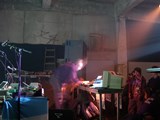
Turkish gay clubs, record labels, Russendisko, electronic music festivals and night-time club culture are just some of the subjects explored in a new book of essays about the cultural scenes of Berlin.
Poor, But Sexy: Reflections on Berlin Scenes is edited by Dr Geoff Stahl, a senior lecturer in Media Studies at Victoria University of Wellington. Contributors are academics from around the world, all with personal connections to Berlin, including Dr Stahl, who has lived in Berlin and visited the capital regularly for the last 10 years.
"Many people are fascinated by the scene in Berlin, but not a lot of people are writing about it in English," says Dr Stahl. "This is one of the few scholarly overviews of Berlin’s varied cultural life available in English.
"The various reflections it provides give readers an insight into what's going on, and how the shape of the city has changed since the fall of the Berlin Wall."
The title phrase ‘poor but sexy’ is taken from a statement by Berlin's mayor Klaus Wowereit who, a decade ago, attempted to attract creative people to the city by declaring "Berlin ist arm, aber sexy" (poor but sexy). The cultural history of the city and its low rents compared with other European capitals have helped draw artistic people from across the world and made Berlin a major centre for artists, writers, musicians and, increasingly, technology.
"Berlin, with its rundown look and feel, became a bit of a playground for a while after the Wall came down—derelict buildings became squats, clubs, cafes, workshops for artists, and venues for all kinds of collectives.
"Rather than simply romanticising or valorising the idea of the scene, however, Poor, But Sexy reflects on various issues, such as the way the city has got caught up in marketing itself as a creative cultural capital and the dilemmas that creates for the creative or artistic people who live there. There's been dramatic change in the last 10 years, with pockets of Berlin becoming a kind of ‘bohemian consumers’ paradise’ that has become a symbol of the new Berlin."
Dr Stahl's essay 'Getting by and getting older' focusses on the organisers of transmediale, an annual festival for art and digital culture, who have been working on this event for more than 13 years.
"I was fascinated by the ways in which these people remain connected to this project as they age, their struggles with issues such as health, the juggling act that inevitably comes with settling down, ensuring that the festival keeps reflecting contemporary culture, and the precarious life of having to seek funding every year to keep the festival going. I was also interested in the impact of the festivalisation of the city, and how although it’s an advantage to be part of the 'Berlin brand', there's this impulse to try to resist it in some way."
Dr Stahl says Berlin's influence has even infiltrated as far afield as New Zealand. "The [now-closed] Mighty Mighty bar in Wellington was modelled on a couple of legendary hedonistic bars in Berlin—White Trash and Bar 25—and numerous New Zealand artists and musicians have spent time working in Berlin. This has been documented in Cowboys and Communists, a documentary made by Wellington film maker Jess Feast about White Trash and Broke But Sexy, a series of short films about New Zealand artists living and working in Berlin."
Poor, But Sexy: Reflections on Berlin Scenes is published by Peter Lang.
Book: historical guide to world media freedom
Date: 25 July 2014
Time: 11.14 am
'Historical Guide to World Media Freedom: A Country-by-country Analysis' by Dr Douglas A. Van Belle, Media Studies Senior Lecturer and Jenifer Whitten-Woodring, Assistant Professor, Department of Political Science, University of Massachusetts Lowell, will soon be available on Sage CQ Press.Documentary Film to Premiere at NZIFF
Date: 22 July 2014
Time: 11.20 am
Dr Paul Wolffram's feature length documentary "Voices of the Land – Nga Reo o te Whenua" will premiere at Wellington's New Zealand International Film Festival on 26 July.
This fascinating and eloquent doco about Māori instrumental traditions accompanies Richard Nunns and Horomona Horo as they perform in a series of remarkable South Island wilderness settings.
"I'm thrilled to have the opportunity to screen this film throughout the country for a home audience after three years of production," says Dr Wolffram. "I think this is a film that will resonate widely with New Zealand audiences as a story about who we are and how we think about the land we live in and the way it speaks to us."
The film documents Nunn's journey as he reflects on his more than 30 years working and learning from Māori communities and coming to understand the unique instrumentation of taonga pūoro. It also explores his current struggle with Parkinson's disease which threatens his ability to continue performing.
"We travelled throughout the South Island from Takaka to Fiordland with more than 15 locations in between. The film enables an audience to see and hear the ways in which the landscape can be understood as having a voice and even its own music."
Dr Wolffram first met Nunns when the filmmaker was an undergraduate studying ethnomusicology at Victoria University's music school. "His example of seeking to understand the music and culture of other communities in depth through long-term engagement was one of the inspirations to pursue my doctorate on the music and dance of an isolated community in the rainforests of Papua New Guinea," says Dr Wolffram.
Nunns will be attending the Wellington premiere, where he will see the final cut of the documentary for the first time. After two Wellington screenings, the film will travel around the country with the film festival and go on to screen overseas.
'Nga Reo O Te Whenua – Voices of the Land' was supported by Victoria University of Wellington and the New Zealand Film Commission. It is edited by Annie Collins with cinematography by Alun Bollinger and sound by Tim Prebble.
In 2012 Dr Wolffram received the Jean Rouch prize from the Society for Visual Anthropology in San Francisco for Stori Tumbuna: Ancestors' Tales, his feature-length documentary about the Lak people of Papua New Guinea.
The Wellington screenings are at Soundings Theatre at Te Papa on Saturday 26 July, 3pm and Tuesday 29 July at 1.30pm.
Voices of the Land Facebook page
Seminar - Researching the World: the Modest Ambitions of the Lord of the Rings and Hobbit projects
Date: 14 July 2014
Time: 12.00 pm
Emeritus Professor Martin Barker
In 2003, a project to research audience responses to the films of The Lord of the Rings was launched. Based in 20 countries and using a complex quali-quantitative questionnaire, we managed to gather just under 25,000 responses from across the world, in 14 languages. The project centred on questions about the place of 'fantasy' in the lives of people in different cultural contexts. The rich materials from the project not only allowed us to begin to answer those questions, it proved capable of answering a series of others we hadn’t directly considered (for instance, how audiences are able to manage enjoying the films to the maximum when they have read and re-read the books; and how audiences choose favourite characters, and the way such choices link with their orientations and judgements). Not satisfied with this crazily-big project, in 2012 we began planning a follow-up. This time, based in 46 countries, and operating in more than 30 languages, the project – which begins recruiting this December – has added a new set of research questions (for instance, tackling difficult issues around ‘interpretive’ and ‘imagined communities’), has refined the questionnaire in light of the earlier project, and is aiming at doubling our recruitment. What kind of insanity is this?? In this presentation, I will outline some of the ambitions, results, and methodological challenges of the two projects.
Martin Barker is Emeritus Professor at Aberystwyth University, and currently Visiting Professor, Deakin University, Melbourne. Across his research career he has addressed many areas, including: racism in Britain; comicbooks; theories of ideology; moral campaigns over the media; and specific topics such as adaptations of The Last of the Mohicans, the cycle of Iraq War films (2006-10), and the rise of livecasting to cinemas. However in the last twenty-five years he has particularly focused on researching film audiences, including undertaking research for the British Board of Film Classification, and leading the two world projects considered in this presentation.
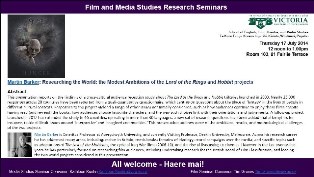
Book Launch: How We Remember: New Zealanders and the First World War
Date: 17 June 2014
Time: 5.30 pm
VUP warmly invites you to the launch of:
How We Remember: New Zealanders and the First World War edited by Charles Ferrall and Harry Ricketts.
on Tuesday 17 June, 5.30pm for a 6pm start
at Vic Books (Kelburn Campus)
Victoria University of Wellington
Easterfield Building, Gate 4
1 Kelburn Parade
Wellington
Charles and Harry will introduce the book and this will be followed by a short reading from contributors.
Light refreshments will be served.
How We Remember will be available for purchase and signing by the editors and contributors. p/b $40.00.
About How We Remember
A poem, a waiata, a family photograph, a painting, a half-recalled history lesson, a parade, a name on a plaque in a small town: we remember the First World War in so many ways. These original, insightful essays by a raft of historians, writers and other prominent figures reflect on our different forms of remembering and re-membering, what we have cherished and valued, forgotten and ignored, constructed and reframed.
English Literature Student awarded the Victoria Medal
Date: 17 June 2014
Time: 11.21 am
At her May 2014 Graduation ceremony, Emily Sutton, currently a Master's student in the English Literature programme, was awarded the Victoria Medal for Academic Excellence. This prestigious prize was awarded to Emily for outstanding BA(Hons) academic performance in the Faculty of Humanities and Social Sciences.

Best New Zealand Poems
Date: 3 April 2014
Time: 11.23 am
Best New Zealand Poems 2013 has been published online, showcasing work from award-winning poets, including the current Poet Laureate, to new and emerging talents.
The 2013 edition includes work from award-winning poets such as Fleur Adcock, current Poet Laureate Vincent O’Sullivan and Anne Kennedy through to emerging talents such as Chris Tse and the Irish-New Zealand poet Caoilinn Hughes (current PhD student). It has been edited by Professor Mark Williams and Professor Jane Stafford.
In deciding what to include in Best New Zealand Poems, both editors have drawn on their experience of wading through 200 years of New Zealand literature when putting together the landmark Auckland University Press Anthology of New Zealand Literature (2012). They chose 25 poems to include in the anthology, put them in a historical context and described the current state of New Zealand’s “best” poetry.
After the “torrid but not wholly unenjoyable” task of editing the anthology, the editors say it was liberating to be confined to one year’s slim bulk of poetry with Best New Zealand Poems.
“What we looked for, and found,” write Professors Stafford and Williams, “were poems of clarity and suggestiveness, poems that act as a dynamic conversation with the reader — rule poems, riddle poems, mix-of register poems, social pattern poems with something withheld, poems which are dramatic, lyrical and coherent, without tired lines or dull phrases.”
Series editor and poet Chris Price, who is a Senior Lecturer at the International Institute of Modern Letters, says: “While many previous editors of Best New Zealand Poems have themselves been poets, it’s been stimulating and revealing to have the 2013 edition selected by two professional critics of New Zealand literature. I’m sure their introduction will provoke further conversations and debates.”
Best New Zealand Poems 2013 includes a number of impressive long poems (and extracts from long poems) by leading writers such as Ian Wedde, Michele Leggott and Dinah Hawken, and relative newcomers such as Amy Brown.
A number of the poems are also available as audio recordings. Auckland poet Selina Tusitala Marsh and Irish/New Zealand poet Caoilinn Hughes are among those who can be heard reading their work on the site.
Best New Zealand Poems, published by the IIML, was first published online in 2001, and features a different editor each year. In 2011 Victoria University Press published The Best of the Best New Zealand Poems, a selection from the first 10 years of the collection in book form.
Best New Zealand Poems 2013 is published with the support of Creative New Zealand, and hosted by the New Zealand Electronic Text Collection at Victoria University.
English student highly commended in Summer Gold Poster Competition
Date: 27 March 2014
Time: 11.24 am
MA Student Rosalind Atkinson won a ‘highly commended visual’ award in the 2014 University Gold Poster Competition (24 March 2014). Rosalind presented the argument of her Summer Scholarship Research, conducted under the supervision of Dr Heidi Thomson, in the form of a Blakean plate, The Lay of the Land: Gender and Landscape in William Blake and Thomas Hardy. Rosalind’s current MA research, which is funded by a VUW MA scholarship, focuses on embodied visions in Blake. In June Rosalind will be presenting part of her thesis research about Blake and manga artist Osamu Tezuka at the 2014 NASSR Romantic Connections Conference in Tokyo. To view a lager version of this poster see the PDF version (10 MB).
Seminar - Writing for Immortality: Romantic Reputations and the Dream of Lasting Fame
Date: 13 March 2014
Time: 12.00 pm
Venue: von Zedlitz Building, room 802, Kelburn
Heather Jackson
Emeritus Professor of English, University of Toronto
Professor Heather Jackson will speak on her new book, Writing for Immortality: Romantic Reputations and the Dream of Lasting Fame (Yale University Press).
Professor Heather Jackson has been quoted on the second page of the New York Times article, "Between the Recipes, Scribbles Speak Volumes," published on 28 January 2013. The topic of the article was on a reader's contribution to narrative by means of cookbooks, and the traditions that individual anecdotes and scribbles in the margins pass down to following generations.
English Programme Ranked Highly
Date: 10 March 2014
Time: 11.31 am
In the recently released QS World University Rankings by Subject Victoria’s English Language and Literature Programme is ranked 31, up from 49 in 2013.Interview: Labour's content levy
Date: 10 March 2014
Time: 11.29 am
Dr Peter Thompson, Senior Lecturer in Media Studies was recently interviewed about Labour Party's content levy in The Southland Times.Book Launch for PhD Student in English
Date: 10 March 2014
Time: 11.28 am
Congratulations to Caoilinn Hughes …
Victoria University Press warmly invites you to the launch of Gathering Evidence by Caoilinn Hughes on Saturday 8 March, 7.30pm-9.30pm at The Exchange Atrium, 24 Blair St, Wellington. Gathering Evidence aligns scientific and poetic venturing with pinpoint accuracy, virtuosity and humour. About the book, Bill Manhire said, "On page after page, she offers transformation–turning facts into feeling, experience into knowledge, prose into poetry, science into art." Hughes won the 2012 Patrick Kavanagh Award, the 2013 Cúirt New Writing Prize and the 2013 Trócaire/Poetry Ireland Competition. She is an Irish New Zealand resident and is studying for her PhD within the English Programme at Victoria. Gathering Evidence is also published by Carcanet UK. Books will be available for purchase courtesy of Unity Books. For those who cannot make the launch, Gathering Evidence is available for purchase through the VUP online bookstore and at all good book sellers nationwide.
Caoilinn will also be reading as part of the New Zealand Festival Writers Week event 'First Published' on Tuesday 11 March, 6.15pm, at Meow Cafe, Edward St. Free entry.
Interview: significance of political blogs in election year
Date: 10 March 2014
Time: 11.26 am
RadioLIVE interviewed Dr Peter Thompson, Media Studies Senior Lecturer on the differences and the relationship between the blogosphere and mainstream news sphere, and where this might be heading. (Audio: 5 minutes 16 seconds)Journal Article by Media Studies PhD Candidate
Date: 3 March 2014
Time: 11.32 am
Jumoke Giwa-Isekeije, PhD candidate in Media Studies, has had her MA, 'Peeking Through the Opomulero Lens: Tunde Kelani's Women on Center Stage' published by The Global South (Indiana University Press).English Professor as new Dean of FGR
Date: 5 February 2014
Time: 11.33 am
Professor Peter Whiteford has been appointed as Dean of the Faculty of Graduate Research effective 3 March 2014.Re: Tutoring for 2014
Date: 6 January 2014
Time: 11.37 am
Expressions of interest are invited from university graduates to work part-time as tutors in undergraduate English, Film, Theatre, and Media Studies courses for 2014. It is expected that successful applicants will have an Honours degree or higher. Applications are particularly encouraged from current and intending postgraduate students.
Pay will be at rates set under the Tutors Collective Agreement ($20.10–$26.89 per hour, depending on qualifications and experience).
Tutoring roles are characterised by the following set of basic conditions or expectations:
- Tutorials usually occur for one hour, per course, per teaching week;
- Tutorials are designed to provide: opportunities for small group discussion and interaction; learning support for course material and lectures; in-class advice as to the completion of assignments;
- Tutorial teaching begins in the second week of trimester and involves eleven weeks of actual teaching;
- Tutorials comprise up to 18 students per class;
- Tutorials (while their coverage may be directed by the Course Coordinators) are planned and resourced by individual class tutors;
- In addition to preparing and running tutorials, a tutoring role involves a few hours each week for student consultation and additional hours during the trimester for the marking of student assignments;
- Tutors are expected to attend regular meetings with the Course Coordinator during the trimester, and one end-of-course examiners' meeting, and possibly attend the lectures for courses on which they work.
See the Course Finder for the 2014 undergraduate courses we will be offering.
To Apply
Email us attaching:
- a covering letter;
- your CV;
- the application form (Excel 18 KB);
- supervisor approval email if you are a postgraduate student;
- a copy of your work visa if applicable.
Decisions will be made by early-February 2014.
Scholarships Awarded
Date: 17 December 2013
Time: 11.39 am
Congratulations to the following SEFTMS postgraduate students:
Victoria Doctoral Scholarships
Diego Bonelli
Angelina Sbroma
Doctoral Scholarship with one year funding
Rachel Somerfield
Master's by Thesis Scholarships
Rosalind Atkinson
Taylor Hughson
Fairooz Samy
Emily Sutton
Nicola Wood
Masters by Thesis Scholarship: History of Reading in Colonial New Zealand and Australia
Frith Driver-Burgess
Karis Boyd Scholarship
Rosalind Atkinson
Tuition fees waiver
Madeline Glen
PhD for former Toi Whakaari Director
Date: 10 December 2013
Time: 11.41 am
(From VicNews 10 Dec 2013)
Taking a different stage
Annie Ruth is used to being in charge of public performances but she will have a different role to play at next week's Victoria University of Wellington graduation ceremonies.
The former Director of Toi Whakaari: the New Zealand Drama School will take the stage as a PhD graduate, concluding a period in which she juggled doctoral study with holding down one of the most demanding jobs in performing arts in New Zealand.
Annie retired from Toi Whakaari in 2011, when she was two-thirds of the way through her PhD.
"It was hard work but I find the harder you are working, the more capacity you have to work and I loved every part of doing a PhD, right down to the technical stuff like footnotes.
"It really helped that my study and my day job were in congruent areas. The University research provided me with raw material and Toi Whakaari provided me with a group of students, who were very curious about what I was doing and were prepared to put my thinking into practice."
Annie‘s PhD research looked at how tikanga Māori can be integrated into actor training and theatre production.
As a director, she uses the Viewpoints technique which requires actors to focus on movement and gesture as much as words. "I think of it like a game of rugby—we know the rules but we don‘t know exactly who is going to get the ball or when so you have to watch, listen and be really awake to what others on stage are doing."
Into the mix she added a long-standing interest in, and knowledge of, Māori rituals.
"I think of performance as a kind of powhiri or hui and that means being acutely aware of the environment. Eventually you come to think of every aspect of the performance environment as something that has meaning and is not just decorative."
The result, says Annie, is a unique theatre experience which has the vitality of improvisation but structure that brings artistic depth.
She says her research project helped to counteract the despondency she sometimes feels when she goes to theatre productions, not just in New Zealand but around the world.
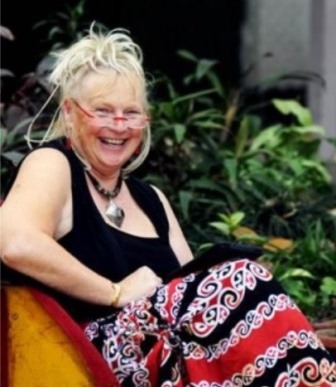
SEFTMS Tutor wins 2013 Victorias Awards
Date: 3 December 2013
Time: 11.43 am
Congratulations to Angelina Sbroma, English Programme MA student and Tutor who recently won the Victorias Awards 2013 as 'Engaging Tutor (postgraduate)'.
Angelina is one of three winners who has been 'most effective in engaging students with learning through their passion and innovation, demonstrates manaakitanga (such as support, caring and respect) and holds students accountable to high standards', according to VicNews on 2 Dec 2013.
Lecture focussed on Victorian writer’s ‘terrible sonnets’
Date: 2 December 2013
Time: 11.45 am
Victorious recently interviewed Professor of English, Peter Whiteford about his inaugural lecture on Tue 26 November 2013 at Hunter Council Chamber, Hunter Building at the Kelburn campus.Tutoring for 2014
Date: 28 November 2013
Time: 11.47 am
Expressions of interest are invited from university graduates to work part-time as tutors in undergraduate English, Film, Theatre, and Media Studies courses for 2014. It is expected that successful applicants will have an Honours degree or higher. Applications are particularly encouraged from current and intending postgraduate students.
Pay will be at rates set under the Tutors Collective Agreement ($20.10–$26.89 per hour, depending on qualifications and experience).
Tutoring roles are characterised by the following set of basic conditions or expectations:
- Tutorials usually occur for one hour, per course, per teaching week;
- Tutorials are designed to provide: opportunities for small group discussion and interaction; learning support for course material and lectures; in-class advice as to the completion of assignments;
- Tutorial teaching begins in the second week of trimester and involves eleven weeks of actual teaching;
- Tutorials comprise up to 18 students per class;
- Tutorials (while their coverage may be directed by the Course Coordinators) are planned and resourced by individual class tutors;
- In addition to preparing and running tutorials, a tutoring role involves a few hours each week for student consultation and additional hours during the trimester for the marking of student assignments;
- Tutors are expected to attend regular meetings with the Course Coordinator during the trimester, and one end-of-course examiners' meeting, and possibly attend the lectures for courses on which they work.
See the Course Finder for the 2014 undergraduate courses we will be offering.
To Apply
Email us attaching:
- a covering letter;
- your CV;
- the application form (Excel 18 KB);
- supervisor approval email if you are a postgraduate student;
- a copy of your work visa if applicable.
Decisions will be made by early-February 2014.
Tutoring for 2014
Date: 28 November 2013 – 31 January 2014
Time: 10.00 am
Expressions of interest are invited from university graduates to work part-time as tutors in undergraduate English, Film, Theatre, and Media Studies courses for 2014. It is expected that successful applicants will have an Honours degree or higher. Applications are particularly encouraged from current and intending postgraduate students.
Pay will be at rates set under the Tutors Collective Agreement ($20.10–$26.89 per hour, depending on qualifications and experience).
Tutoring roles are characterised by the following set of basic conditions or expectations:
- Tutorials usually occur for one hour, per course, per teaching week;
- Tutorials are designed to provide: opportunities for small group discussion and interaction; learning support for course material and lectures; in-class advice as to the completion of assignments;
- Tutorial teaching begins in the second week of trimester and involves eleven weeks of actual teaching;
- Tutorials comprise up to 18 students per class;
- Tutorials (while their coverage may be directed by the Course Coordinators) are planned and resourced by individual class tutors;
- In addition to preparing and running tutorials, a tutoring role involves a few hours each week for student consultation and additional hours during the trimester for the marking of student assignments;
- Tutors are expected to attend regular meetings with the Course Coordinator during the trimester, and one end-of-course examiners' meeting, and possibly attend the lectures for courses on which they work.
See the Course Finder for the 2014 undergraduate courses we will be offering.
To Apply
Email us attaching:
- a covering letter;
- your CV;
- the application form (Excel 18 KB);
- supervisor approval email if you are a postgraduate student;
- a copy of your work visa if applicable.
Decisions will be made by early-February 2014.
Campbell Live features Media Studies Senior Lecturer's pilot TV show
Date: 20 November 2013
Time: 11.50 am
Campbell Live (short article and video: 11 MINUTES 18 SECONDS) interviewed 11-year-old Lara Cook on Friday 8 November 2013 for her magical role in 'Johnny Ruckus', a sci-fi comedy TV show. Lara was diagnosed with leukaemia last year.
Senior Lecturer, Dr Douglas A. Van Belle, briefly shown in the video is one of two writers for the soon-to-be-released 'Johnny Ruckus' (Facebook page).
Otago Radio One 91FM interviews Media Studies Lecturer
Date: 15 November 2013
Time: 11.53 am
Otago Radio One 91FM interviewed Dr Anita Brady, Media Studies Lecturer on rape culture and the media (podcast, audio file size: 11285585 BYTES) on Friday 8 November 2013.3News interviews Media Studies Lecturer
Date: 15 November 2013
Time: 11.51 am
3News interviewed Dr Michael Daubs, Media Studies Lecturer about how 'Insecurity feeds need to share online' (video: 2 minutes 59 seconds) on Tuesday 12 November 2013.English Professor analyses religious poetry for the non-religious
Date: 31 October 2013
Time: 11.54 am
An unusual religious background has left a Victoria University of Wellington Professor of English with a taste for secular writing containing religious ideas.
In his upcoming inaugural professorial lecture, titled 'When You’re Dead You Go on Television: Sex, Death and Household Objects in Some New Zealand Poetry', Professor Mark Williams will examine New Zealand poetry that deals with death, the body and consolation.
When he was a child, his parents converted from the Christadelphian faith to Catholicism, although, he says, his father describes himself as 'an atheist who loves church music'.
This experience led Professor Williams to develop an enduring fascination for art and literature in which there is no indication of religious belief, but where language or imagery associated with religious ideas still appear.
His lecture will include examples of poetry by New Zealand writers Bill Manhire, Jenny Bornholdt and Allen Curnow.
"I will also touch on the opposite ends of the spectrum—CK Stead who’s a militant atheist and James K Baxter who’s a militant believer—to provide a contrast with the writers who are in between the two."
Professor Williams says his lecture will show that the legacy of religion belongs to everybody—not just religious people.
"Religion has power in our language, our thought, our writing and our art."
Professor Williams specialises in researching and teaching both New Zealand and modern literature and has been published widely in both fields since the mid-1980s. He is currently working with Professors Jane Stafford and Ralph Crane to edit The World Novel to 1950, a volume of the Oxford University Press series, The History of the Novel in English. He is also editing a new History of New Zealand Literature for Cambridge University Press.
Vice-Chancellor Professor Pat Walsh says Victoria University’s inaugural lecture series is an opportunity for professors to share insights into their specialist areas of study with family, friends, colleagues and the wider community.
"Inaugural lectures are also an excellent way for the University to celebrate and acknowledge our valued professors," says Professor Walsh.
What: When You’re Dead You Go on Television: Sex, Death and Household Objects in Some New Zealand Poetry
When: 6pm, Tuesday 5 November
Where: Hunter Council Chamber, Level 2, Hunter Building, Gate 1 or 2, Kelburn Parade, Wellington
RSVP by Friday 1 November. Phone 04-463 6390 or email rsvp@vuw.ac.nz with ‘Williams’ in the subject line.
For more information contact Professor Mark Williams on mark.williams@vuw.ac.nz or 04-463 6810.
Kipling’s legacy touches New Zealand
Date: 24 October 2013
Time: 11.59 am
Writer Rudyard Kipling's influence cuts across cultures and political persuasions, with shades of it even reaching New Zealand.
In his inaugural professorial lecture, Victoria University of Wellington Professor Harry Ricketts explored how Kipling’s legacy lives on in modern usage and culture, sometimes in unexpected places.
"In Taupo, there’s a very steep rock climbing route called 'Gunga Din' named after one of Kipling’s poems—that’s just one small example," says Professor Ricketts.
A range of artists across the political divide have been influenced by Kipling, including singer-songwriter and protester Billy Bragg, filmmaker Alfred Hitchcock, Argentinian short story writer Borges, Marxist playwright Bertolt Brecht and English right-wing novelist Anthony Powell.
Professor Ricketts says there’s something in Kipling for everyone because his work—spanning 50 years—is so various.
"He is able to represent many different kinds of people and make you feel they're real—that’s an extraordinary gift."
Professor Ricketts has been interested in Kipling ever since he was a child, partly because his father was in the British Army.
"I grew up in the fag-end of the Empire world," says Professor Ricketts.
"I have had a love-hate relationship with Kipling—I don’t always find his personal opinions sympathetic, but I find his work transcends his opinions."
In 1999, Professor Ricketts published an acclaimed biography of Rudyard Kipling, The Unforgiving Minute. He has also authored journal articles, book chapters and conference papers, and edited books on the world-renowned writer.
He says that Kipling visited New Zealand for 18 days in 1891 and continued to correspond with friends he made on that trip for most of his life. Kipling’s short story One Lady at Wairakei imagines the future of New Zealand literature, and the central character in his famous story Mrs Bathurst is based on a woman he met in New Zealand.
Vice-Chancellor Professor Pat Walsh says Victoria University’s inaugural lecture series is an opportunity for professors to share insights into their specialist areas of study with family, friends, colleagues and the wider community.
"Inaugural lectures are also an excellent way for the University to celebrate and acknowledge our valued professors," says Professor Walsh.
Professor Ricketts is a Professor of English in the School of English, Film, Theatre and Media Studies. He teaches and researches 19th and 20th century poetry, children’s literature, creative non-fiction and literary biography. For many years he has run a popular modern poetry course that compares the work of British, American and New Zealand poets. He has written or co-written 16 books, including literary biographies, personal essays and several collections of poems.
The benefits of filming the ‘wrong way’
Date: 24 October 2013
Time: 11.56 am
A workshop at Victoria University will explore the creative possibilities of filming in a vertical format—which many film makers call the 'wrong way'.
With the growing usage of smartphones and tablets—on which content is normally viewed in portrait orientation—'home movie' style filming is beginning to shift away from the traditional horizontal format, according to workshop organiser Dr Miriam Ross, a film lecturer at Victoria University.
"Bearing in mind how cheap digital devices are radically changing the way we watch audio-visual media, we have decided to hold a practical workshop to explore the vertical format and build on some of the work we’ve been doing already," she says.
Last year Dr Ross worked with Summer Research Scholarship student Maddy Glen on a vertical cinema project, which included shooting a short film called Heaven (duration: 7 minutes 25 seconds) on a mobile phone.
"Filming vertically gives you a new type of freedom in how you compose your images," says Dr Ross.
In train stations and airports overseas, moving images that are filmed vertically are starting to appear on billboards. Artists are also experimenting with vertical formats, and Facebook users regularly post vertically-orientated videos that have been filmed on mobile phones.
In the course of her research into vertical media, Dr Ross has connected with Dave Neal, President of Walrus & Carpenter Productions and creator of Alicewinks, an animated, multimedia e-book that brings classic illustrations from Alice’s Adventures in Wonderland to life in a vertical format for digital audiences. Mr Neal, who is from the United States but currently based in Wellington, will contribute his expertise to the workshop.
"The Alicewinks project is a perfect example of something that works really well with the new technology and makes much more sense in that format," says Dr Ross.
The Vertical Media Workshop will include two practical working groups, with one group shooting footage around Victoria University’s Kelburn Campus using phones or tablets, and the other working with Mr Neal on animation. The footage will be edited in the afternoon and presented on a vertically-positioned screen for discussion.
The day will conclude with a talk by Matt McGregor and Thomasin Sleigh from Creative Commons New Zealand and DigitalNZ, who will discuss how film makers and artists can search for and modify online content under Creative Commons' Fair Use Policy.
Filming on phones, tablets and webcams will be a component of a new course, FILM 305 Cinemedia, which will be taught by Dr Ross next year.
What: Vertical Media Workshop
When: Monday 4 November, 9am–5pm
Where: 77 Fairlie Terrace, Kelburn Campus, Victoria University
Attendance at the workshop is free but space is limited. Contact Dr Miriam Ross before 27 October to register.
For more information contact Dr Miriam Ross on 04-463 9655
Theatre PhD student's science museum in a pizza box
Date: 23 October 2013
Time: 12.01 pm
From VicNews:
An international PhD student at Victoria University of Wellington hopes to revolutionise guided tours, with the science museum he has created inside a pizza box.
As part of his research, Michele Fontana who, of course, is Italian, will be presenting his portable museum through two guided tours at the Museum of City and Sea today.
"The Museum of City and Sea is really keen on storytelling and experimenting with new ways of presenting information, so it‘s the perfect environment for my research," says Michele.
The pizza box will contain seven objects, ranging from a petri dish to a deck of cards. Participants will be asked to build their own museum by choosing the four objects they are most interested in and the order in which they wish to explore them.
"First I will ask people what they know about the object—for instance, in high school maybe someone used a petri dish and something went wrong. Then I‘ll tell them my story, about Louis Pasteur and how he discovered bacteria and how it‘s used for pasteurisation. In this way I try to build and connect everything around the audience."
Michele has been trialling his interactive method in private homes, and the museum 'tours' will be his first experience with larger numbers. He will also test his theory at the Newtown Community Centre and on senior citizens in retirement homes.
"My idea is to talk about science to people who don‘t usually go to museums, theatre or talks organised by scientific institutions."
Michele says he has interviewed a variety of tour guides in Wellington in the course of his research, including guides in museums, Parliament and libraries. He has found that although tour guides tended to feel undervalued within organisations, the experience they offer often leaves the most lasting impression on visitors.
"A good guided tour can influence your perception of the institution more than the exhibition itself."
In future, Michele aims to put the results of his research into practice by developing effective programmes for museum visitors.
Michele‘s PhD is divided between Theatre Studies and Museum Studies. He has degrees in Environmental Science (BSc, UNIMIB, Italy) and Science Communication (MSc, Imperial College, United Kingdom), and a background working in theatre and visual arts. In 2007, he won Prova d‘Attore, an Italian national contest for actors.
What: Do it Yourself Science Museum–in a pizza box
When: Wednesday 23 October, two shows–12.30pm and 5.30pm (duration 50 mins each)
Entry: Free (limited to 10 people per show)
Bookings: 04-472 8904 or museumtours@wmt.org
English & Theatre Honours Graduate wins Man Booker Prize
Date: 16 October 2013
Time: 12.02 pm
Congratulations to Eleanor Catton who won the prestigious 2013 Man Booker Prize for her novel The Luminaries. According to the Dominion Post, she is 'the youngest author in history to win literature's most sought-after prize'.
Eleanor studied English Literature and Theatre, achieving First Class Honours before graduating with a Master of Arts in Creative Writing with distinction.
New Emeritus Professors
Date: 15 October 2013
Time: 12.05 pm
Congratulations to David Carnegie; Robert Easting; and David Norton who have each been awarded the status of Emeritus Professor. As long standing staff members, they have all made a significant contribution to the University and we are delighted that they are to continue their involvement with us in their capacity as Emeritus Professors.PhD Awarded
Date: 8 October 2013
Time: 12.07 pm
Annie Ruth has been awarded her PhD in Theatre entitled Kanohi ki te kanohi = Face to face : frameworks from tikanga Māori meet viewpoints improvisations, shocking the theatrical encounter into alive-li-ness. Her supervisors were David O'Donnell and Megan Evans.A New Professor for the English Programme
Date: 24 September 2013
Time: 12.10 pm
Congratulations to Jane Stafford who has been promoted to Professor.Media Studies Senior Lecturer Assists DomPost
Date: 24 September 2013
Time: 12.08 pm
Senior Lecturer Dr Peter Thompson was approached by The Dominion Post to assess the recent mayoral billboards.Seminar - 'South Korean Costume Drama: Genre, Genrification and Heritage Aesthetics'
Date: 19 September 2013
Time: 12.00 pm
Dr Yun Mi Hwang
Examining the rise of the national heritage industry, I survey the contours of contemporary South Korean costume drama. While the recent circulation of the “historical” and the “traditional” in popular culture has been investigated, the issue of consumption and the impact on the market have often been overlooked. As a way to understand the commercial viability and rapid dissemination of Korean costume drama, I engage with theories of genre and genrification. In particular, I introduce two marketing strategies recently deployed by costume films and television drama: the standardisation of film posters and period aesthetics. Using diverse examples, from a chic cinematic rendering of a French original, ‘Untold Scandal’ (2003), to a hit television drama set in the royal court, ‘Moon Embracing the Sun’ (2012), I will examine aesthetic similarities and cultural recycling, demonstrating how the visual language of recent costume drama allows the genre to flourish through the power of recognisability. The costume drama is reconfigured as a cultural genre, as a result; its form and content is secured through the simultaneous development of period material in different media sectors. Such a study, in turn, expands the scholarship on heritage and costume genre beyond the dominant Anglo-American discourse.
Yun Mi Hwang received her PhD in Film Studies from the University of St Andrews and now teaches at the University of Ulsan. She has published on the Korean Migrant Worker Film Festival, East Asian co-productions, period horror, and the biopic. She is the co-editor of "The Korean Wave Sourcebook" (Seoul: Academy of Korean Studies, 2014) and is currently writing a monograph entitled “Heritage on Screen: South Korean Historical Drama”.
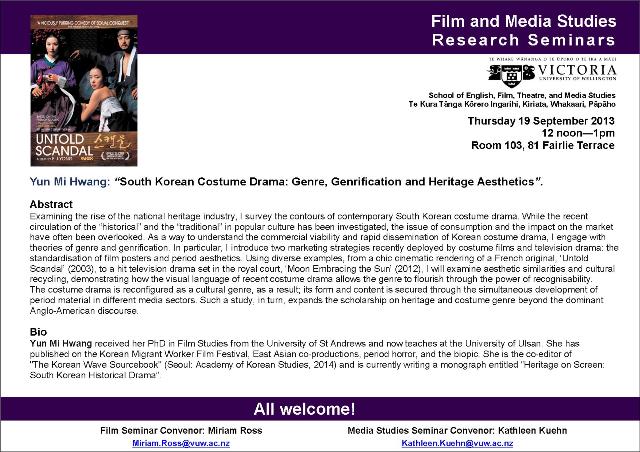
Film Lecturer Wins NZ Film Commission Funding
Date: 18 September 2013
Time: 12.12 pm
Congratulations to Dr Paul Wolffram who won $44,000 to make Nga Reo O Te Whenua: Voices of the Land. This documentary is one of five recipients to receive New Zealand Film Commission's Te Whai Ao funding. Te Whai Ao funds emerging or experimental documentary makers.
Paul will direct and co-produce Nga Reo O Te Whenua: Voices of the Land with Catherine Fitzgerald.
New Zealand’s New Poet Laureate
Date: 20 August 2013
Time: 12.57 pm
Emeritus Professor Vincent O’Sullivan (English) is New Zealand’s new Poet Laureate.“The Poet Laureate Advisory Group received some excellent nominations but was unanimous in its choice of Vincent to succeed Ian Wedde for the two-year Laureate term,” said Advisory Group chair and Alexander Turnbull Library Chief Librarian, Chris Szekely.
“Vincent O’Sullivan has been a leading figure in New Zealand and International poetry for over 40 years and his work continues to develop, with excellent reviews for his most recent anthology of new work, Us, Then, published only last month.”
“Nominators mentioned his wide appeal and ability to relate to range of audiences with warmth, wit and erudition. I have no doubt he will be an articulate and intelligent voice for the role and meaning of poetry.”
Vincent O’Sullivan was Professor of English at Victoria from 1988 until his retirement in 2004. He is now an Emeritus Professor.
BBC Interviews Alfio Leotta
Date: 20 August 2013
Time: 12.13 pm
Dr Alfio Leotta, Film Programme lecturer was recently interviewed by BBC News Magazine on New Zealand film landscape.John Campbell Honoured
Date: 19 August 2013
Time: 12.15 pm
One of the more high profile alumni of the English programme was recently honoured by the University. TV3’s current affairs presenter and winner of numerous awards for investigative journalism, John Campbell completed an Honours degree in English Literature in 1988. He was honoured at the University’s annual Distinguished Alumni Awards at the end of July.
Speaking at the celebratory dinner, John was fulsome in his praise of the English Programme, and of the experience of studying literature. He contrasted the rather dismal experience of secondary school – “We had the cane and the strap. We had uniforms. We had roll calls and assembly and song books and order” with the excitement of “a world of utter happiness and wonder. English literature. … Not a week goes by when I don't read one of the poets I first met at Vic. Not a week. I loved them. What a gift that is. What a gift that was to me. … what mattered was the persuasiveness of the subjective truth. And the light those truths shone on the lives we all live. And the work words can do. The way stories are only made great by the words in them. … what's happened to me since then, becoming a journalist and a broadcaster, telling stories, interviewing people, believing, even in commercial television, in the power to tell small truths in ways that may make people see things they hadn't previously seen, was born and shaped during those years at Vic.”
We’re delighted to have one of our alumni honoured in this way.
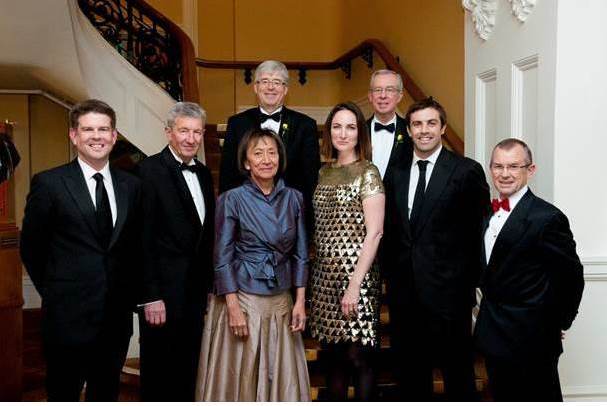
(Source: VicNews, 5 August 2013) Back row (left to right): Victoria University Vice-Chancellor Professor Pat Walsh and Chancellor Ian McKinnon. Front row (left to right): 2013 Distinguished Alumni Award winners John Campbell, Jeff Tallon, Hon Georgina Manunui te Heuheu, Claudia Batten, Conrad Smith and Brian Roche.
PhDs Awarded
Date: 9 August 2013
Time: 12.58 pm
Congratulations to ...
(Maria) Lujan Herrera who has been awarded her PhD in English Literature entitled Victorian Revival in Contemporary Fiction for Young Adults. Her supervisors were Kathryn Walls and Jane Stafford.
Jafar Mirzaee Porkoli who has been awarded his PhD in English Literature entitled Democratic Intellect: Freeing Thought for the Democracy To-Come. His supervisors were Brian Opie and Linda Hardy.
Lilja Sautter who has been awarded her PhD in English Literature entitled 'I can tell you this is a fine country': Identity Construction in the British-New Zealand Imperial Diaspora. Her supervisor was Jane Stafford.
Lindsay Morton who has been awarded her PhD in English Literature entitled Negotiating Nonfiction: Writing Practices in Investigative Journalism. Her supervisors were Harry Ricketts and Nikki Hessell.
Greg Martin who has been awarded his PhD in New Zealand Literature entitled The mythology of the gap in the work of James K Baxter. His supervisors were Peter Whiteford and Geoff Miles.
PANZ (Publishers’ Association of New Zealand) Book Design Awards 2013
Date: 31 July 2013
Time: 1.00 pm
The winners of the PANZ Book Design Awards 2013 were announced at the awards ceremony on Thursday 18 July at the Gus Fisher Gallery, Auckland.
Congratulations to Jane Stafford and Mark Williams, editors of The Auckland University Press Anthology of New Zealand Literature (Auckland University Press), as well as designers Scott Crickett (Cover) and Katrina Duncan (Interior).
This book won two categories: Harper Collins Publishers Award for Best Cover, and Hachette New Zealand Award for Best Non-Illustrated Book.

Victoria University goes 3D
Date: 30 July 2013
Time: 1.04 pm
A kiwi feather cloak, a jug from 1890 and samurai armour from 1735 are just some of 100 objects that will be filmed in 3D in a new partnership between Victoria University and Te Papa.
As the first university in New Zealand to work with 3D production, Victoria University's Film Programme is partnering with Te Papa to create 3D images of objects from the museum's collection. They will be assisted by experts from Weta Workshop's miniatures department.
The ultimate goal is to learn more about 3D technology so that it can be incorporated into Victoria's film production and theory classes next year. However, film lecturer and award-winning documentary filmmaker Dr Paul Wolffram says he wanted to learn about the University's new 3D camera through a project that would benefit the community.
"Our project will create a resource for Te Papa while also giving us the opportunity to learn about the process of 3D image creation in a controlled environment," he says.
"Te Papa has a mandate to allow public access to its collections—this is a way to help them do this safely without causing damage to precious objects."
"Museums around the world are looking at 3D technologies—including imaging techniques and 3D printing—to provide new and exciting ways to view, interact with and better understand museum objects," says Philip Edgar, Manager Digital Collections and Access at Te Papa.
"Te Papa is very excited to be part of the 3D filming partnership with Victoria University and begin exploring these technologies."
The Film Programme is inviting staff, students and alumni to participate in the project, which is headed by Victoria staff members Dr Paul Wolffram and Dr Miriam Ross, along with three-time Oscar winner for visual effects Alex Funke.
"There is no 'how to' book on the subject, so we will learn by doing," says Dr Wolffram.
"We are fortunate to have the assistance of experienced cinematographer Alex Funke, who works for Weta Workshop and has taught a film production course at the University in the past."
The first meeting of the 3D production initiative will take place at Kelburn Campus on Thursday 1 August at 6.30pm.
Anyone who is interested in being part of the project should email miriam.ross@vuw.ac.nz.
For more information visit the 3d Production Initiative website.
Theatre graduate wins Fulbright NZ General Graduate Award
Date: 5 July 2013
Time: 1.11 pm
Congratulations to Eleanor Bishop, BA (Hons) graduate in Theatre who won a Fulbright New Zealand General Graduate Award. Eleanor will complete a Master of Fine Arts degree in Theatre Directing, specialising in original contemporary performance, at Carnegie Mellon University in Pittsburgh, Pennsylvania.
Her THEA 489 supervisor was Megan Evans.
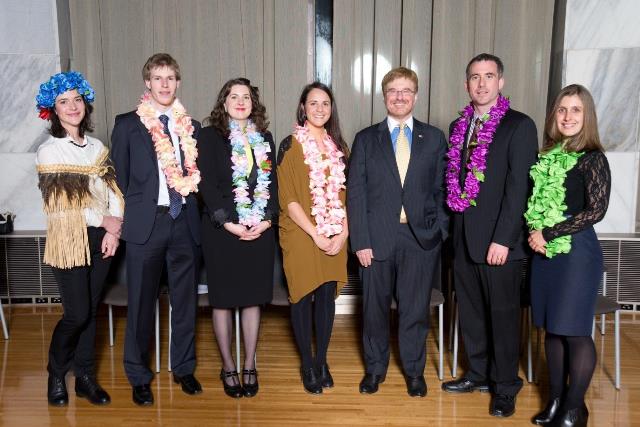
Pictured (left to right): Victoria University Fulbright recipients with U.S. Ambassador to New Zealand, the Hon David Huebner. Left to right: Sunkita Howard, Joshua Foster, Eleanor Bishop, Horiana Irwin-Easthope, David Huebner, Dr John Townend and Kate Yesberg.
RNZ Mediawatch interview with Peter Thompson
Date: 4 July 2013
Time: 1.12 pm
Radio New Zealand Mediawatch interviewed Peter Thompson on Coliseum’s acquisition of EPL rights and the media reports about Sky’s ostensible demise.English Research Clusters
Date: 18 June 2013
Time: 2.31 pm
Colonial Literature
Staff researching colonial literature at Victoria include Nikki Hessell, Lydia Wevers, Jane Stafford and Mark Williams. The Turnbull library has extensive archival holdings in this area, and Victoria University hosts the New Zealand Nineteenth Century Novels project as part of its Electronic Text Centre website. Publications include Maoriland, by Jane Stafford and Mark Williams, and Reading on the Farm, by Lydia Wevers.
Children’s Literature
Staff with an expertise in children’s literature at Victoria University include Charles Ferrall, Anna Jackson, Geoff Miles, Harry Ricketts and Kathryn Walls. Publications include A Made-Up Place: New Zealand in Young Adult Fiction, by Anna Jackson, Geoff Miles, Harry Ricketts, Tatjana Schaefer and Kathryn Walls, The Gothic in Children’s Literature, ed. Anna Jackson, Karen Coats and Rod McGillis, and Juvenile Literature and British Society 1850-1950: The Age of Adolescence, by Anna Jackson and Charles Ferrall. A children’s literature research group made up of graduate students from honours level to PhD meets fortnightly.
Current Research Projects
Jane Stafford: “Colonial Literature and the Native Author”
This is a Marsden-funded study of a group of writers who are both Victorian and indigenous, who have been educated n and write in terms of Victorian literary conventions, but whose indigenous affiliation is part of their literary personae and subject matter
Nikki Hessell: Romantic Literature in Colonial Indigenous Languages
Anna Jackson, Geoff Miles, Harry Ricketts, Tatjana Schaefer and Kathryn Walls: Romance and Sexuality in NZ YA Fiction
A follow-up project to A Made-Up Place
Anna Jackson: Girls’ diaries 1870-1920
Adolescent girlhood is now recognised as taking a distinct character in the late nineteenth century and early twentieth. This study looks at diaries written by girls in their late teens and early twenties, in the period between 1880 and 1920 when the ideal of girlhood was well established and at its most coherent. What is the potential for girls to express ideals of romance and self-sacrifice, idealism, heroism, Englishness and class consciousness in the daily format of a diary?
Anna Jackson: Girlhood and the Gothic
An exploration of the way the uncanny calls for a corresponding canniness from the girl heroines of the Gothic genre: how narratives of being possessed call for, and define, a concept of self-possession; how the idea of possession typically attached to the ghost story can inform fictions about female scholars, possessing and possessed by their scholarly interests; how the diary form lends itself to narratives of self-possession, and self-deception; how the possession of property can take a Gothic turn and complicate the self-possession required to negotiate courtship and the ambiguities of romance.
Film students immortalise Aro Valley dairy in documentary
Date: 11 June 2013
Time: 2.33 pm
Third-year Victoria University students Emma Bishop (director), Vinny Ritossa and Mark Berry were featured in The Dominion Post for their 10-minute FILM 335 documentary assignment. They filmed Shalimar Mini Market in Aro Valley and the owners, Neil and Nalini Patel who operated Shalimar for over 30 years.
The Dominion Post published this Wellington tale as 'Dairy at the heart of the valley' on 23 May 2013. The photo below was taken from the online article:
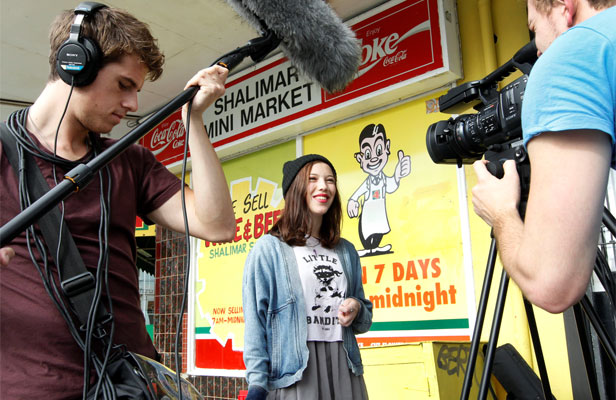
One Minute Movie Massive 2013
Date: 28 May 2013
Time: 2.35 pm
Enter the 2013 ONE MINUTE NOVIE MASSIVE film competition. This year's theme is TOO FAR, TOO FAST. Follow the instructions and be in to win a GO PRO camera. Submit your film by 20 September 2013.New documentary featuring traditional Māori instrumentalist
Date: 21 May 2013
Time: 2.36 pm
Traditional Māori instrumentalist Dr Richard Nunns is the subject of a new documentary feature film produced and directed by award-winning filmmaker and Victoria University academic Dr Paul Wolffram.
Of Pakeha heritage, Dr Nunns has been researching and performing with taonga pūoro (traditional Māori instruments) for more than 40 years.
"Richard‘s journey with these instruments and his reflections on what he has learnt is being filmed as he travels through some of Aotearoa‘s most resonant landscapes," says Dr Wolffram.
"Richard has been widely recognised as a 'living treasure‘. His careful and sensitive research continues to be an important contribution to the revival and preservation of these instruments and traditions, unique to this country."
The film also documents Dr Nunns‘ on-going struggle with Parkinson‘s disease, which threatens his ability to continue performing and presenting these instruments to international audiences.
"Richard is remarkable for his energy and tenacious determination to continue to perform," says Dr Wolffram.
"When he lifts an instrument, his concentration, ability and musicality continue to astound audiences. Despite his challenges, Richard is in good health and remains passionate about sharing his knowledge and insights into the deep relationship between taonga pūoro and the landscapes of Aotearoa."
Filming on 'Nga Reo O Te Whenua—Voices of the Land‘ continues into September this year, supported by funding from Victoria University. Dr Nunns was awarded an honorary doctorate of music from Victoria in 2008.
A trailer to the film can be viewed at https://vimeo.com/63877868. Contributions towards the film‘s production can be made via a pledge me page: https://www.pledgeme.co.nz/978.
During New Zealand Music Month a concert is being organised at Te Papa Tongarewa in honour of Richard‘s contribution to music in Aotearoa.
In 2012 Dr Wolffram received the Jean Rouch prize from the Society for Visual Anthropology in San Francisco for Stori Tumbuna: Ancestors’ Tales, his feature-length documentary about the Lak people of Papua New Guinea.
First in the 2012 PBRF Round
Date: 9 May 2013
Time: 2.37 pm
SEFTMS is delighted to announce that all four SEFTMS programmes were ranked first in their subject areas in the 2012 PBRF round. The PBRF is an independent evaluation by the Tertiary Education Commission of research performance in New Zealand tertiary institutions. Victoria was ranked first in the country in :
• English Language and Literature
• Communications, Journalism and Media Studies,
• Theatre and Dance, Film, Television and Multimedia
Congratulations to the English, Film, Theatre, and Media Studies programmes for this outstanding result.
English Programme in the Top 50 World University Rankings
Date: 8 May 2013
Time: 2.38 pm
Following on from being ranked first in New Zealand in the PBRF rankings, the excellence of Victoria’s English Programme has now been recognised by an international university ranking system. The 2013 QS World University Rankings rank Victoria as one of the top 50 universities in the world in four subjects, one of which is English Language and Literature.SEFTMS Graduate's Film Showing at Paramount and Roxy
Date: 24 April 2013
Time: 2.39 pm
Congratulations to Master of Theatre Arts graduate, Alyx Duncan for The Red House, winner of the Unofficial New Zealand Film Award for Best Self-Funded Feature. Alyx is director, producer and also distributor of this Kiwi film.
Now screening in Wellington at Paramount or Roxy.
Here is the trailer as well as the production stills and making of images.
Synopsis: “The Red House is an intimately observed drama of change in the lives of a deeply attached couple in their 60s. When Lee (Lee Stuart) met Jia (Meng Jia) 20 years ago they barely understood a word of each other’s languages. Now duty calls Jia back to her distant homeland and her aged parents, who still live in the tiny apartment she grew up in, deep within a city that’s changed many times over since she left. We travel with the couple between the world of his island, this city of hers, and the world they have made together – their red house in the bush, crammed full of books and mementoes." - Bill Gosden (shortened version) The Red House is the first feature film of Director Alyx Duncan who has cast her parents in the two lead roles."
Enquiries: lucystonex@gmail.com
MA student, Tom Jamieson awarded PhD Fellowship at University of Southern California
Date: 19 April 2013
Time: 2.41 pm
Congratulations to Media Studies MA student, Tom Jamieson who was awarded Winifred Greenleaf Allen PhD Fellowship from the University of Southern California. It includes full tuition, a stipend, travel funds, and professional development support for 5 years.Film student wins Summer Gold Poster Competition
Date: 16 April 2013
Time: 2.42 pm
Congratulations to SEFTMS summer scholar Maddy Glen and to her supervisor Miriam Ross. Maddy won the University-wide Summer Gold Poster Competition for the poster she designed as the result of her summer scholarship on Miriam's Vertical Cinema project. The entries in the competition were of a very high standard, and this is a an excellent result coming from a staff/student collaboration.

Dr Paul Wolffram on Radio New Zealand National
Date: 27 March 2013
Time: 2.44 pm
Film Programme Lecturer Dr Paul Wolffram recently spoke to Radio New Zealand National about his experiences living with the Lak people of Papua New Guinea and the documentary he made about his time there.
The Interview with Radio New Zealand National
SEFTMS Students and Staff recognised at Fringe Awards
Date: 12 March 2013
Time: 2.45 pm
Congratulations to Megan Evans and all her cast, designers and crew for winning the Best Theatre Award at the NZ Fringe Awards for Madame X and Mister Q. This production was also nominated for the Best Production Design Award and Best Ensemble Award and actor/puppeteer Fern Wallingford was nominated in the Stand Out Performer Category.
Also congratulations to graduate companies Binge Culture (overall winner of the Best of the Fringe, plus Best Outdoor and CNZ Innovation Award) and My Accomplice (winner Best Production Design). Also congratulations to Uther Dean for winning a special award for involvement in seven Fringe shows and reviewing all the others.
Production - Wellington Summer Shakespeare Turns 30!
Date: 22–24 February 2013
Time: 1.17 pm
To join in the celebrations see the Wellington Summer Shakespeare website.English Literature PhD Student receives prestigious literary fellowship
Date: 30 January 2013
Time: 2.46 pm
Victoria PhD student Hamish Clayton has been named as one of the two recipients of the Buddle Findlay Sargeson Fellowship.
As a Buddle Findlay Sargeson Fellow, Hamish will spend five months in residence at the Sargeson Centre in central Auckland and receive a $20,000 grant.
Hamish writes regularly for Art New Zealand and New Zealand Books and was the writer in residence at the Weltkulturen Museum, Frankfurt from September to October 2012. His first novel Wulf (Penguin 2011) won the 2012 NZSA Hubert Church Best First Book Award for Fiction.
Screening - Last Dogs of Winter
Date: 16–26 January 2013
Time: 7.00 pm
Venue: The New Zealand Film Archive, Wellington
Ticket price: $10 public / $8 concession
A film about wildlife... and one wild life. New Zealand filmmaker Costa Botes’ The Last Dogs of Winter (2011) tells the story of Canadian dog handler Brian Ladoon’s struggle to preserve the Canadian Eskimo dog, or Qimmiq, the rarest registered breed of dog in the world. The film received standing ovations at the Toronto International Film Festival in 2011.
Formerly relied upon by the Inuits for transport, technology and cultural shifts have rendered the Canadian Eskimo Dog redundant. After the introduction of petrol-powered skidoos the population dwindled from tens of thousands to just a few hundred remaining dogs in the 1970s.
Based in the small community of Churchill, Manitoba, Ladoon has been working to save the Canadian Eskimo dog since 1976. This documentary captures his fierce and outspoken determination. Ladoon’s efforts have inspired both admiration and fierce criticism - largely because his colony of dogs share their pitiless natural environment with itinerant wild polar bears (Churchill is known as “The Polar Bear Capital of the World”), and his practices are seen by some to be inhumane.
Botes’ documentary also features Caleb Ross, a former kiwi actor (who has stints on Xena and Shortland Street among his credits). Newly arrived in Canada, Ross came across a job posting in his hostel that read “Come to Churchill, breed Eskimo dogs, see polar bears.” At the time of filming Ross had been working with Ladoon and his dogs for three years.
“Filming with a lightweight HD camera and only his wife as crew (a job that required her to drive a pickup truck down vast stretches of icy road and carry a gun with rubber bullets to be prepared for rogue polar bears), Botes intercuts artfully shot interviews with spectacular outdoor scenes. Among the most captivating are those of the chained dogs interacting with the curious bears, and the lumbering white bears gamboling with one another in the snow... Fine sound design and musical effects support the visuals, as does Thom McLeod’s atmospheric score.” - Variety
Botes, who headed the film as director/producer/editor/cinematographer, is an esteemed name in New Zealand film. His previous projects include Forgotten Silver (1995), Saving Grace (1998) and Candyman (2010), among others.
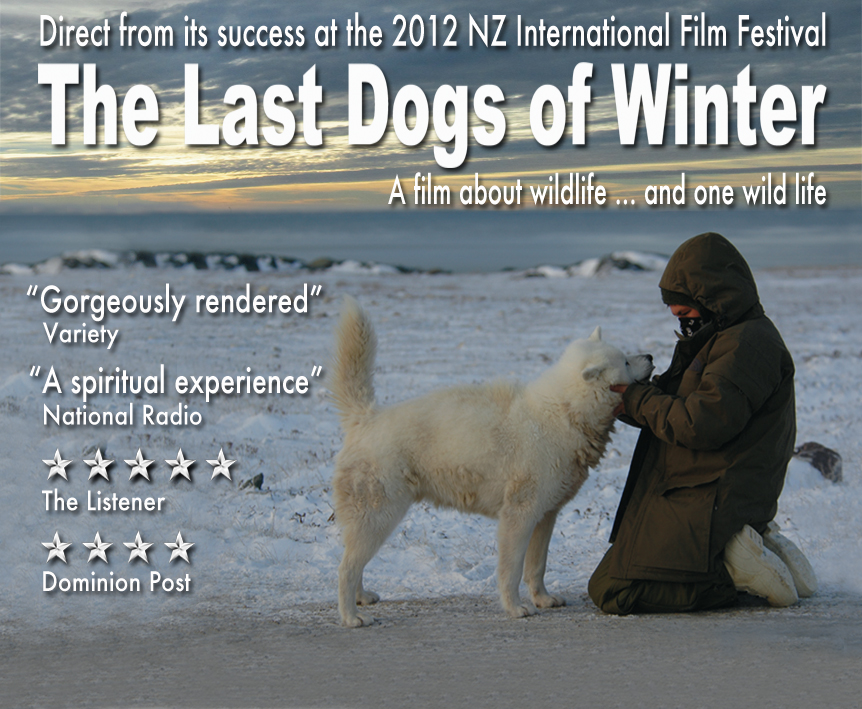
Dr Anna Jackson receives Creative New Zealand Grant to Write Poetry in Rome
Date: 15 January 2013
Time: 2.47 pm
Congratulations to Dr Anna Jackson, recipient of Creative New Zealand senior practitioner’s grant.
Anna will write a sequence of poems from high-profile aristocrat Clodia Metelli’s point of view, imagining her side of the story about her affair with Roman poet Catullus. Anna will be travelling to Rome, Verona and Sirmio, visiting sites of importance to the poetry.
The affair between Roman poet Catullus and high-profile aristocrat Clodia Metelli is well known – from his account of it. Both loving her and hating her, he gives a contradictory portrait of her. She is more beautiful – than a prostitute who isn’t beautiful at all; the rival she loves is a God – or, later, stinks like a goat; she calls Catullus himself a God – but her word is no more reliable than the pattern of wind on water.
Clodia herself was apparently a talented poet, which is why Catullus calls her Lesbia in his poems, after the Lesbos poet Sappho. There may be a scroll containing Clodia’s account of the affair still lost somewhere, but until we find it we can only imagine how her poetry might be written.
2012 Teaching Excellence Award
Date: 11 January 2013
Time: 2.49 pm
Congratulations to Dr Anita Brady for achieving a 2012 Teaching Excellence Award.Thesis Student
Date: 19 November 2012
Time: 2.50 pm
Congratulations to Saskia Voorendt who has been awarded her PhD in English entitled "A Life in Two Worlds: George MacDonald and his Imagination". Her supervisors were Kathryn Walls and Heidi Thomson.Anthology of New Zealand Literature
Date: 14 November 2012
Time: 2.52 pm
Congratulations to editors, Jane Stafford and Mark Williams on the publication of The Auckland University Press Anthology of New Zealand Literature. New Zealand Book Council conducted Five Easy Questions with Jane Stafford and Mark Williams.Book launch - John Keats: A New Life
Date: 27 September 2012
Time: 12.00 pm
Venue: von Zedlitz 802, Kelburn Parade
This landmark biography of celebrated Romantic poet John Keats explodes entrenched conceptions of him as a delicate, overly sensitive, tragic figure. Instead, Nicholas Roe reveals the real flesh-and-blood poet: a passionate man driven by ambition but prey to doubt, suspicion, and jealousy; sure of his vocation while bitterly resentful of the obstacles that blighted his career; devoured by sexual desire and frustration; and in thrall to alcohol and opium. Through unparalleled original research, Roe arrives at a fascinating reassessment of Keats’ entire life, from his early years at Keates’s Livery Stables through his harrowing battle with tuberculosis and death at the age of 25. Focusing on crucial turning points, Roe finds in the locations of Keats’ poems new keys to the nature of his imaginative quest. Roe is the first biographer to provide a full and fresh account of Keats’ childhood in the City of London and how it shaped the would-be poet. The mysterious early death of Keats’ father, his mother’s too-swift remarriage, living in the shadow of the notorious madhouse Bedlam - all these affected Keats far more than has been previously understood. The author also sheds light on Keats’ doomed passion for Fanny Brawne, his circle of brilliant friends, hitherto unknown City relatives, and much more. Filled with revelations and daring to ask new questions, this book now stands as the definitive volume on one of the most beloved poets of the English language.
Nicholas Roe is Professor of English, University of St. Andrews. He is the author of numerous biographical and critical works on writers of the Romantic period. He lives in Scotland. He will be visiting New Zealand at the end of September where he will be a keynote speaker at the Romantic Voyagers - Voyaging Romantics conference, hosted by Victoria University of Wellington’s School of English, Film, Theatre and Media Studies.
Film on Lak people wins top visual anthropology prize
Date: 10 September 2012
Time: 2.53 pm
Victoria University lecturer Dr Paul Wolffram is enjoying ongoing international recognition for his film about the Lak people of Papua New Guinea with the work receiving a top honour from the Society for Visual Anthropology in San Francisco.
Stori Tumbuna: Ancestors’ Tales is a feature length ethnographic documentary produced by film lecturer Dr Wolffram, who spent two years living with the Lak people in the remote region of Southern New Ireland in Papua New Guinea.
Dr Wolffram’s film had its premiere in Wellington at the New Zealand International Film Festival in 2011 and was selected to screen at the Jean Rouch International Film Festival in Paris later that year. Jean Rouch was a founder of visual anthropology and is widely known for his ethnographical films on African peoples. Earlier this year, Dr Wolffram’s film was shown at the Göttingen International Ethnographic Film Festival in Germany.
It has now received the Jean Rouch prize by the Society for Visual Anthropology, an award given for collaborative and participatory work, with Dr Wolffram due to travel to the United States to receive the prize in November.
At the same time, Dr Wolffram will show and discuss his film at several American universities, including Harvard in Boston.
Dr Wolffram first went to Papua New Guinea in 2001 to study music and dance as part of his PhD research. He has since made two more trips to the region where the Lak people live, an area with no permanent roads, no power or water supply and few public services.
In total, he has made three films about the Lak people—the first and third aimed at ethnographers and anthropologists and the second—Stori Tumbuna: Ancestors’ Tales—for a general audience.
Rather than telling the Lak people’s story from the perspective of an outsider, Dr Wolffram describes his films as a collaboration.
“My goal is to give viewers an understanding of how the Lak people see the world. Rather than telling stories about them, it is a participatory journey where people can experience the traditional mythologies of the region.
“The Lak people are a self-sufficient community living in rain forest. These films are one of the few opportunities they have had to present themselves to the rest of the world.”
Dr Wolffram says receiving the Society for Visual Anthropology award is very special. “It is a great honour to receive an award associated with Jean Rouch, who is one of the greatest ethnographers we have seen and was way ahead of his time in his approach to making films about African peoples.
“It’s also important to see the value of indigenous narrative being recognised.”
Stori Tumbuna: Ancestors’ Tales has secured a distributor who will sell the film in the education and academic markets in the United States and Europe.
Dr Wolffram has formed a lasting attachment to the Lak people—he has been given a clan name and a place in the community and made a commitment to return to their region at least every five years.
He also gives the Lak people half of the royalties collected from screenings of his films.
"I feel very lucky to have had an opportunity to work in Papua New Guinea and feel I owe a great debt to the people of the Lak region," says Dr Wolffram.
A group of men drumming to accompany a dance performance in Southern New Ireland, Papua New Guinea. Photo: Dr Paul Wolffram.
2012 SEFTMS Postgraduate Conference
Date: 5 September 2012
Time: 9.00 am
Venue: Fairlie Terrace
This is a free annual event that offers a full-day showcase for the Research being conducted by MA and PhD students in our school. All staff and MA or PhD students, whether or not they are presenting work, are warmly encouraged to attend. At this conference a large proportion of SEFTMS's MA and PhD students will deliver a 20 minute presentation. Accordingly, this conference will provide an invaluable opportunity for thesis students to participate in SEFTMS's postgraduate community by presenting their research, to extend their confidence and presentation experience, and to find out more about what other MA and PhD researchers in the School are doing.
For more information please contact the School Postraduate Coordinator, or if you are a student who is considering presenting a paper please contact the Postgraduate Coordinator for your programme.
Past abstracts and presenters can be found from previous conferences
New Mac Lab
Date: 30 August 2012
Time: 2.58 pm
Learning by doing is taking on a whole new meaning for film students at Victoria with the opening of a new Apple Mac teaching-computer lab.Instead of squashing into a small post-production suite, film students now have the use of a lab that is ideal for teaching video editing techniques.
The made-over room in the Murphy Building on the Kelburn Campus features state-of-the-art technology including more than 20 Apple Mac computers, high definition projectors, movie theatre sound, and Blue Ray video technology.
“Although the post production suites we have been using are well equipped, they can only accommodate small groups,” says Dr Paul Wolffram, lecturer and senior technical office in the Film Programme. “I’ve been teaching editing with students watching over my shoulder.”
In the new Mac Lab however, the tutor’s demonstration of editing techniques is projected onto a large screen for everyone in the class to see. Dr Wolffram says students’ work can also be beamed onto the screen which is ideal when they aren’t sure what to do or have a question to ask.
He says having the computers grouped around tables, rather than laid out in rows, also makes a difference.
“No one has their back to the screen, the students can all see each other, and it’s easy for the teacher to wander round and discuss what individuals are doing.”
While the School of English, Film, Theatre and Media Studies has priority when it comes to using the lab, it is also open for bookings from other schools to use for teaching.
And when there are no bookings, students are free to settle in and use the computers.
Dr Wolffram hopes the new Mac Lab will be the first of a number of similar facilities at Victoria.
“It’s a concept that I’m sure will prove itself quite quickly. It not only allows students to learn by doing but is very flexible. People can work alone, collaborate in small groups or do something together as a class.”
The Mac Lab is located in Murphy 211 on the Kelburn campus.
Best NZ Short Film Winner
Date: 17 August 2012
Time: 3.00 pm
Sam Kelly, one of the School's first FILM 404 graduates, has won the Madman Entertainment Jury Prize in the New Zealand International Film Festival's inaugural New Zealand's Best Short Film competition.The cash prize of $5000 for the Best New Zealand Short Film at the 2012 New Zealand International Film Festival, was awarded to Lambs, written and directed by Sam Kelly, produced by Tom Hern.
The jury commented: “Lambs had the biggest heartbeat, a rawness, honesty and a wonderful humanity.”
NZ Post Book Awards Finalist
Date: 2 August 2012
Time: 2.56 pm
Congratulations to Dr Anna Jackson, Senior Lecturer in English, who was a finalist in the prestigious New Zealand Post Book Awards for her poetry collection Thicket.Poetry reading, Rachel Blau DuPlessis
Date: 22 March 2012
Time: 4.00 pm
Venue: von Zedlitz Building, Rm 802
Professor Emerita, Temple University
Distinguished Visiting Scholar, University of Auckland
A reading, with commentary, from Drafts
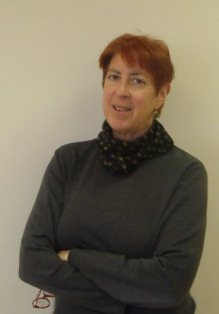 Rachel Blau DuPlessis is the author of the long poem Drafts, begun in 1986, and collected most recently in two books from Salt Publishing - Pitch: Drafts 77-95 (2010) along with The Collage Poems of Drafts (2011). Her newest critical book (2012) is Purple Passages: Pound, Eliot, Zukofsky, Olson, Creeley and the Ends of Patriarchal Poetry from University of Iowa Press. In 2006, two books of her innovative essays were published: Blue Studios: Poetry and Its Cultural Work (2006), and the ground-breaking The Pink Guitar: Writing as Feminist Practice ([1990] 2006) both from University of Alabama Press. A thirteen-essay feature on her work in poetry called Drafting Beyond the Ending went up on Jacket22 in December 2011.
Rachel Blau DuPlessis is the author of the long poem Drafts, begun in 1986, and collected most recently in two books from Salt Publishing - Pitch: Drafts 77-95 (2010) along with The Collage Poems of Drafts (2011). Her newest critical book (2012) is Purple Passages: Pound, Eliot, Zukofsky, Olson, Creeley and the Ends of Patriarchal Poetry from University of Iowa Press. In 2006, two books of her innovative essays were published: Blue Studios: Poetry and Its Cultural Work (2006), and the ground-breaking The Pink Guitar: Writing as Feminist Practice ([1990] 2006) both from University of Alabama Press. A thirteen-essay feature on her work in poetry called Drafting Beyond the Ending went up on Jacket22 in December 2011.
“DuPlessis’ ongoing long poem Drafts is proving to be one of the major poetic achievements of our time.” Ron Silliman, Silliman’s Blog, April 2004.
“DuPlessis has created one of the most sustained and magnificent meditations written by a contemporary poet on loss, presence, and the haunting persistence of language to redeem what has vanished … The scale of Drafts is monumental; its focus anti-monumental.” Patrick Pritchett, On Drafts. Jacket 22.
“Given the beauty and complexity of these drafts, it’s not much of an exaggeration to say that DuPlessis has invented a new way of integrating poetic form and content. Hers is a massive, cathedral-size project unlike any other in contemporary literature.” Andrew Ervin, “It’s truly poetry in motion,” Philadelphia Inquirer (August 21, 2005): H 12.
Seminar - Fairy Tale Retellings: Developing Intercultural Competence Through Translation
Date: 14 March 2012
Time: 12.10 pm
Venue: von Zedlitz Building, room vZ 606
The New Zealand Centre for Literary Translation
The School of Languages and Cultures
The International Institute of Modern Letters
and The School of English, Film, Theatre, and Media Studies
Cordially invite you to a presentation by Maria González Davies
In this paper Associate Professor Maria González Davies will present a selection of some of the most relevant outcomes of a pilot project carried out with her Teacher Training students at the University Ramon Llull, involving 19 students in their third year. The project, which revolved around research related to Cinderella from both verbal and visual perspectives, is transferable to other educational levels and contexts.
Maria González Davies is an Associate Professor at the Faculty of Education at the University Ramon Llull in Barcelona, Spain. She is the author of the highly influential Multiple Voices in the Translation Classroom. Activities, Tasks and Projects, published by John Benjamins in 2004, and co-author (with Vincent Montalt) of Medical Translation Step by Step. Learning by Drafting, published by St. Jerome in 2004. In addition, she has published numerous book chapters and journal articles on foreign language acquisition, IT in teaching contexts, and translator training.
For further information please contact Dr Marco Sonzogni
Conferences
Conference - Women and Nineteenth-Century Literature
Date: 23 January 2015
Time: 9.00 am
Venue: Alexander Turnbull Library, Wellington
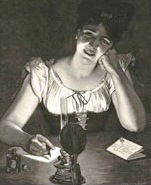
This one-day conference will explore the theme of women and nineteenth-century literature from a range of disciplinary perspectives. Topics for papers include:
- Visual Culture
- Gender and Genre
- Embodiment and Disembodiment
- Women's Voices
- Poetry, Then and Now
- Sensation Fiction
- Characters and the Canon.
Download the full conference programme (PDF, 406 KB).
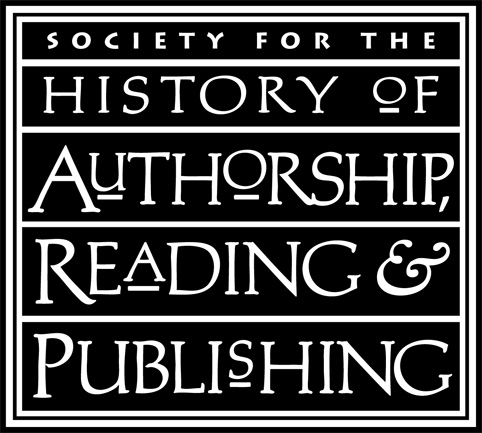
A SHARP-sponsored event.
Conference - Truth or Beauty: Poetry and Biography
Date: 26 November 2014
Time: 9.00 am
Venue: Alan MacDiarmid Room 103, Gate 7, Victoria University of Wellington
About Truth or Beauty: Poetry and Biography
Bringing together poets and scholars, particularly from Australia and New Zealand, this three-day conference seeks to explore, and perhaps define, the growing field of biographical poetry or verse biography – poetry which maps out a life, or presents a portrait of a more or less historical person.
For conference queries please contact Anna Jackson
Conference - Loops and Splices: Changing Media Technologies
Date: 1 August 2014
Time: 9.00 am
Venue: Victoria University of Wellington Kelburn Campus
Keynote Speaker: Prof Ian Christie (Birkbeck College, University of London)
The Film and Media Studies Programmes and Visual Culture Group at Victoria University of Wellington and the Media Studies Programme at Massey University invite submissions for the Loops and Splices conference.
Film and Media technologies are often assumed to operate within teleological frameworks whereby progress, growth and efficiency are defining factors. In order to interrogate these assumptions, this conference will take into account a recent turn in media scholarship towards uncovering the overlooked and under-examined media technologies that contribute to historical and contemporary practice. This conference will explore how different media technologies have functioned in relation to historical and social practices, aesthetic traditions and specific cultural moments.
Programme:
The programme is now available.
Organising Committee:
Alex Bevan, Kathleen Kuehn, Michelle Menzies, Radha O’Meara, Miriam Ross, Kirsten Moana Thompson
Paper proposals (250 words + brief bio) should be submitted by 10 June 2014 to Kathleen Kuehn.
If you wish to attend, but not present, please notify the Symposium Organising Committee via email to Kathleen Kuehn. Attendance is free, but registration is requested.
Keynote speaker:
Prof Ian Christie (Birkbeck College, University of London) is a historian of culture and media, author and editor of monographs on Michael Powell and Emeric Pressburger, Martin Scorsese and Terry Gilliam. He is a fellow of the British Academy, Professor at Birkbeck College, University of London, Head of London Screen Study Collection and Vice-President of Europa Cinemas. His latest publication is Audiences (2012).
Conference - Katherine Mansfield: Masked and Unmasked
Date: 8–11 February 2013
Time: 9.00 am
Venue: Victoria University of Wellington
Keynote speakers: Angela Smith and Sydney Janet Kaplan
View the programme, register, and join us on Facebook.
Collected Fiction of Katherine Mansfield, edited by Gerry Kimber and Vincent O’Sullivan (Edinburgh University Press) will be launched during the conference.
Please contact Anna Jackson or Harry Ricketts with any questions about the conference.
View the programme (![]() PDF, 476KB) for the day trips on Monday 11 February.
PDF, 476KB) for the day trips on Monday 11 February.
Conference - Romantic Voyagers - Voyaging Romantics
Date: 29–30 September 2012
Time: 8.30 am
Venue: Rutherford House, Wellington
Romantic Voyagers – Voyaging Romantics: Wellington, New Zealand, 29-30 September 2012
A two-day International Conference, hosted by the School of English, Film, Theatre, & Media Studies, Victoria University of Wellington, New Zealand, and the Alexander Turnbull Library, Wellington, New Zealand.
Registration has now closed and the programme has been finalised.
Keynote Speakers
Professor Frederick Burwick (UCLA)
Professor Deirdre Coleman (University of Melbourne)
Dr Ruth Lightbourne (Alexander Turnbull Library)
Professor Vincent O’Sullivan, DCNZM (Emeritus Professor, Victoria University of Wellington)
Professor Nicholas Roe (University of St Andrews, Scotland)
Delegates need to arrange their own accommodation. There are a large number of Hotels and B&Bs in Wellington. Hotels within walking distance of the conference venue include: Novotel, Rydges, Intercontinental, Ibis, Bolton, Kingsgate Hotel
Wellington NZ is a useful website for arranging accommodation.
Courses
Short course: Surveillance and Privacy in Aotearoa New Zealand
Date: 20 July – 24 August 2015
Time: 6.00 pm
Presented by Dr Kathleen M Kuehn
Continuing Education courses
Mondays 6:00pm-8:00pm from 20 Jul - 24 Aug 2015
Pipitea Campus
This course introduces contemporary debate about surveillance and asks to what extent New Zealand might be considered a 'surveillance society'.
Who is under surveillance, what data is collected, by what means and for what purposes? Discussion about national state surveillance (past and present), the era of 'big data' and the role new technology plays in ubiquitous consumer monitoring will help you answer these questions and to consider why privacy matters, even if you have nothing to hide. Promotional poster (![]() PDF, 142 KB)
PDF, 142 KB)
Kathleen M Kuehn is a lecturer in Media Studies at Victoria University of Wellington. Her research centres on digital media and cultural production, and has been published across several academic journals including The Political Economy of Communication; Communication, Culture & Critique; International Journal of Communication, amongst others. She is currently working on a book for BWB Texts about mass surveillance and privacy in New Zealand.
For more information and or to register: $180 incl GST
Contact: Motea Cawanikawai or phone 04 463 6556
Exhibitions and Performances
Screening - "Stefano’s Team"
Date: 31 July 2014
Time: 5.00 pm
Venue: Lecture Theatre 104, Hugh Mackenzie Building
Dr Alfio Leotta and Michele Fontana
You are invited to attend the launch and screening of Stefano’s Team, a short documentary by two Italian-born academics from Victoria University of Wellington—film lecturer Dr Alfio Leotta and PhD student Michele Fontana.
Playing soccer barefoot on farmland surrounded by fields of grazing cows is a far cry from the pristine football fields of Milan, but for Italian migrant Stefano Virgili the game is what matters most.
The film, shows Stefano to be a colourful, passionate personality. He is settled in the remote rural region of Kaeo in Northland, the hometown of his wife, where he tries to share his passion for soccer with both local people and international travellers.
He has turned part of his farm into a miniature football pitch because “here I am in Paradise, but there’s no football so it cannot be Paradise”.
“When I was living in Auckland a number of Italian friends told me about Stefano both in relation to his backpackers Kahoe Farms Hostel—voted best in New Zealand for a while—and his passion for soccer,” says Dr Leotta. “I decided to visit the place and was really impressed by Stefano’s story.
“Michele and I were interested in finding out how Stefano has managed to fulfil his passion and dreams about soccer and Italy while living in New Zealand, and how he has affected and been affected by the community he lived in.
“This led to a broader and more interesting question for us as migrants—what can migrants bring to New Zealand culture? How can we contribute to New Zealand society while maintaining and cultivating our own cultural identity?”
The launch of the film will be preceded by three short talks, by Dr Catherine Trundle from Victoria’s School of Social and Cultural Studies who specialises in migration and cross-cultural exchange, author Paul Elenio whose book Alla fine del mondo deals with Italian migration in New Zealand and by Ginette Toscano, a former president of Wellington’s Club Garibaldi. The screening will be followed by a question and answer session with the filmmakers.
Information Events
Info event: Surveillance Awareness Bureau
Date: 27 May - 13 June 2015
Time: 12.00 pm
Venue: 1 Grey Street, Wellington
Does your privacy really belong to you?
Come and visit 1 Grey Street, Wellington, New Zealand
Wed 27 May - Sat 13 Jun 2015
Wed - Fri, from 12-5pm, Sat, from 12-3pm
Surveillance Awareness Bureau
Zach Blas, James Bridle, Paolo Cirio, Simon Denny, Rafael Lozano-Hemmer, Hemi Macgregor, Ruben Pater, Terri Te Tau.
This pop-up office –located in a vacant retail space in Wellington's CBD– features some of the alternatives that artists, designers, scholars and journalists can propose to highlight the tension and risks between seeing and not seeing the effects of technologies in our quotidian. It exalts the vulnerability of humans in that constant non-illuminated space that is control framed by unawareness.
The Surveillance Awareness Bureau (SAB) intends to create a space of critical engagement that grants visibility to systems that by nature should remain invisible to individuals and at the same time provoke a highly charged debate on privacy, liberty, control and abuse.
Not a single day passes without news of trust breaches and information misuse of data in all levels, from the common individual to states and international organisations. But while certain technologies can be considered even as predators for privacy, there is already counterarguments that choose the same technologies and deploy them as tool of resistance or as a crucial democratic element that can link individuals with the wider social and political environment they live in.
The Surveillance Awareness Bureau draws attention to the multiple ambiguous forms of vigilance that could be positioned along a spectrum from "care" to "control"—from watching to enhance the care and safety, to suspiciously scrutinise one's attitudes and behaviors in order to govern, or influence someone else will upon individuals, societies and states.
Book launch - 3D Cinema by Miriam Ross
Date: 15 May 2015
Time: 6.00 pm
Venue: Foyer, 77 Fairlie Terrace, Gate 10
You are warmly invited to celebrate the launch of
Dr Miriam Ross' new book
3D Cinema: Optical Illusions and Tactile Experiences
6.00pm, Friday 15 May 2015
Foyer, 77 Fairlie Terrace, Gate 10
This event is held in conjunction with the Rebooting Futurism Symposium
Dr Alfio Leotta will introduce the book and its author, followed by a conversation about the book's contents as well as the present and future of 3D cinema. There will also be a 3D screen in place showing content from recent 3D features.
Experiments with 3D moving-images have been with us since the birth of cinema, and it is a form of visual expression already seen by billions of twenty-first century viewers, yet there is little understanding of how 3D cinema operates as an art form. We know that it simultaneously uses depth modes to approximate our visual reality and spectacular effects that go beyond traditional perception, but we do not have an appropriate grasp of its creative function. This book examines 3D cinema's unique visual regime in order to understand the optical illusions and tactile experiences that it presents.
Dr Miriam Ross is Senior Lecturer in the Film Programme at Victoria University of Wellington. She is the author of South American Cinematic Culture: Policy, Production, Distribution and Exhibition (2010) as well as publications on film industries, new cinema technologies, stereoscopic media and film festivals.
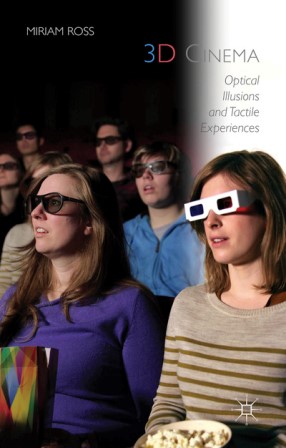
3D Cinema: Optical Illusions and Tactile Experiences
Palgrave Macmillan
ISBN 9781137378569
Forum - Five Eyes Spying in the South Pacific: A Conversation with Nicky Hager
Date: 2 April 2015
Time: 2.00 pm
Venue: Room 103, Alan MacDiarmid Building, Gate 7
Nicky Hager
The Media Studies Programme at Victoria University of Wellington, along with our friends in the Journalism Department at University of the South Pacific in Suva, Fiji, are proud to present a conversation with investigative journalist Nicky Hager.
Mr Hager is one of the world's most accomplished and internationally recognised investigative journalists, whose work on surveillance dates back to his 1996 book Secret Power which first uncovered the existence of the Five Eyes spy network encompassing America, Canada, Australia, The United Kingdom and New Zealand.
This past month, Hager has shed further light on the extent of NSA-led surveillance in the South Pacific. NSA documents leaked to The Intercept and Hager by Edward Snowden reveal that New Zealand's electronic surveillance agency, the GCSB, have implemented a "full-take collection" policy using the NSA's XKeyscore system. The everyday communications of citizens across the Pacific, from emails, sms, social media and mobile calls, are now being intercepted by New Zealand at the behest of the NSA which stores this metadata on its servers.
In what promises to be a wide-ranging conversation, Mr Hager will explain the mechanics of this surveillance system and the political ramifications for Pacific governments and citizens. A Q & A with Mr. Hager from audiences in both Wellington and Suva will follow.
If you would like to participate virtually, you may do so via Scopia Desktop, Meeting ID# 6293.
Here are instructions for connecting to Scopia Desktop.
Nicky Hager is a Wellington-based investigative journalist and author of six best-selling books on a range of difficult-to-document topics. His most recent publication, Dirty Politics (2014), revealed the way attack politics had influenced New Zealand's political culture.
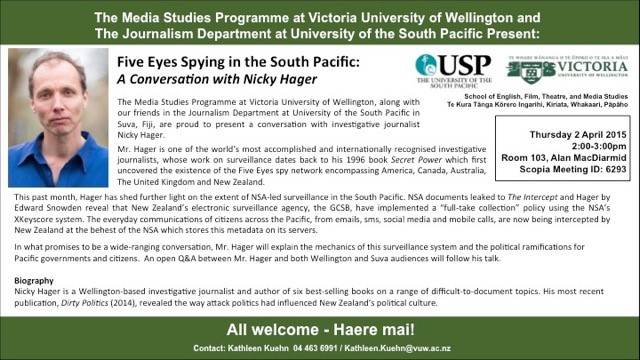
Launch of Writing the 1926 General Strike: Literature, Culture, Politics
Date: 27 March 2015
Time: 4.30 pm
Venue: Trades Hall, Vivian St, Wellington
Do you remember 1926?
You are invited to the launch of Writing the 1926 General Strike: Literature, Culture, Politics
by Charles Ferrall and Dougal McNeill.
Launched by Professor Harry Ricketts.
Friday 27 March, 4.30-6pm.
RSVP to Dougal McNeill.
This launch is supported by Tertiary Education Union (Victoria University of Wellington Branch) and the Living Wage campaign.
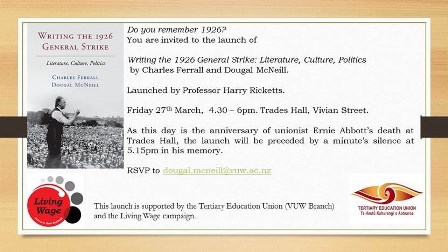
Costume and TV Soaps in Yvonne Todd
Date: 12 February 2015
Time: 6.00 pm
Venue: City Gallery Wellington, Civic Square, 101 Wakefield St
Dr Minette Hilyer, Media Studies Lecturer and Claire Regnault, Te Papa Senior Curator History will discuss about New Zealand Photographer, Yvonne Todd's work: the influence of 1980s TV soaps and costume and character at City Gallery Wellington.
Free entry.
Followed by light refreshments and a screening of Michael Robinson's The Dark Krystle.
In association with Yvonne Todd: Creamy Psychology.
Free Wi-Fi throughout the gallery.
Book Launch - Anna Jackson: I, Clodia and Other Portraits
Date: 27 November 2014
Time: 6.00 pm
Venue: Unity Books, 57 Willis St, Wellington
Auckland University Press and Anna Jackson warmly invite you to celebrate the publication of I, Clodia and Other Portraits.
Other Events at Victoria
Book Launch Harry Ricketts: 'The Penguin Book of New Zealand War Writing'
Date: 1 October 2015
Time: 5.30 pm
Venue: Vic Books, Kelburn Campus
Harry Rickett's latest book 'The Penguin Book of New Zealand War Writing' will be launched this Thursday 1st October at 5:30pm for 6:00pm start up at Vic Book's Kelburn shop. It will be officially launched by historian and general editor of Te Ara: The Encyclopedia of New Zealand, Jock Phillips.
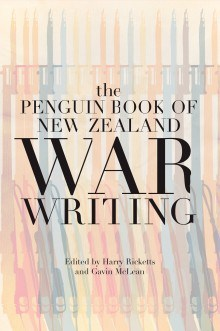
Harry Ricketts teaches in the English Programme at Victoria University of Wellington.
Book Launch - The Pale North by Hamish Clayton
Date: 10 August 2015
Time: 5.30 pm
Venue: Adam Art Gallery, Victoria University of Wellington
Hamish Clayton's new novel "The Pale North" will be launched at the Adam Art Gallery, Victoria University of Wellington on Monday, 10 August 2015.
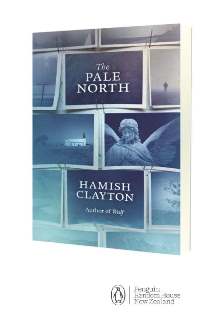
Hamish Clayton is a PhD student in the English Programme at Victoria University of Wellington.
Premiere Screening: FILM 311 short docos and FILM 404 short drama
Date: 16 June 2015
Time: 7.00 pm
Venue: Memorial Theatre 228, Student Union Building, Kelburn campus.
You are warmly invited to the premiere screening of four new short documentaries by the class of FILM 311: Documentary Film Production and a new short drama by FILM 404: Digital Cinema Production.
Every year students are able to proudly achieve in these 12 week courses but this year the standard is especially strong. The documentaries show real vision and commitment to their approaches. The short comedic drama has many genuine laughs and some very strong performances.
Please do join us for what promises to be a special event. Looking forward to seeing you there!
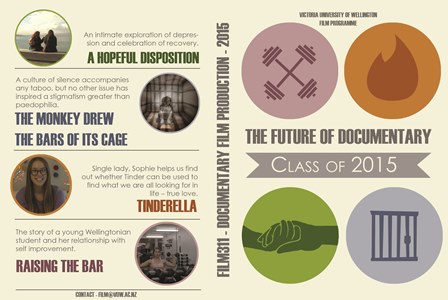
CAD debates: On Higher Education
Date: 11 September 2014
Time: 3.00 pm
Venue: Alan MacDiarmid room 103
Dr Michael Daubs, Lecturer in Media Studies will take part in the first of Debates in Higher Education series, "The main purpose of a University is to develop employable graduates" on Thursday 11 September 2014 at AM103, organised by CAD.
Come and hear Victoria staff and students debate this important topic using light-hearted approaches to get you thinking about, questioning and maybe even challenging some of the ideas which shape the policy and practice of universities around the world.
Speakers
Affirmative: Dr Chris Eichbaum (Victoria Business School), Martin Bryant (Architecture and Design) and Mandy McGirr (Government).
Opposing: Dr Marc Wilson (Psychology), Dr Michael Daubs (Media Studies) and Rawinia Thompson (VUWSA).
With Chairperson Tony Hooper (Information Management)
Staff and students are welcome to register. Staff and students welcome (but please register for numbers). For more information contact Bernadette Knewstubb.
Gallery Tour - Animate!: Art and Moving Image Effects: A tour of Cinema & Painting with Kirsten Thompson
Date: 9 May 2014
Time: 12.00 pm
Venue: Adam Art Gallery, Victoria University of Wellington, Gate 3, Kelburn Parade
Join Kirsten Thompson, Professor of Film, for a lunchtime tour of animated films in Cinema & Painting, particularly works by Oskar Fischinger, Len Lye, Phil Solomon, Matt Saunders, and Jim Davis. Professor Thompson is a specialist in the history of classical animation and presently writing a book about film and colour.
This event is presented in conjunction with the Adam Art Gallery’s current exhibition
Cinema & Painting, on through 11 May 2014.
Writers and Readers Event - Orientation Week
Date: 1 March 2012
Time: 4.30 pm
Venue: Level 2, Central Library, Kelburn Campus
In conjunction with the International Festival of the Arts and Victoria University's Orientation Week, the Library will be hosting three University Staff for a public event related to the Writers and Readers Week.
From the School of English, Film, Theatre, and Media Studies: Professor Harry Ricketts and PhD Candidate Hamish Clayton.
From the International Institute of Modern Letters: Professor Bill Manhire.
4:30pm on Level 2 of the Library at Kelburn Campus.
For more information click here, alternatively contact Erin Scudder.
See you there!
Public Lectures
Inaugural lecture - Did Katherine Mansfield read New Zealand literature?
Date: 25 August 2015
Time: 6.00 am
Venue: Lecture Theatre 301, Kirk Building, Kelburn Campus
The Vice-Chancellor of Victoria University of Wellington, Professor Grant Guilford, invites you to a public lecture by Professor of English Literature, Jane Stafford.
Did Katherine Mansfield read New Zealand literature?
The works of Katherine Mansfield are a seminal part of New Zealand literature. But did Mansfield herself read New Zealand literature? What did the term 'New Zealand literature' mean at the turn of the twentieth century; indeed, was there a body of work that could be described as such? How was local writing regarded by colonial readers—was it preferred, disdained or consumed without differentiation from the English product? And how might Mansfield—as a stolid Karori schoolgirl, as a sulky Thorndon teenager or, later, as a cosmopolitan member of the Bloomsbury Group and a practitioner of European modernism—have encountered it?
When: 6pm, Tuesday 25 August
Where: Lecture Theatre 301, Kirk Building, Kelburn Campus, Victoria University of Wellington
RSVP: Before Friday 21 August. Email with 'Stafford' in the subject line or phone 04-463 6300.
Professor Jane Stafford teaches in the English Programme at Victoria University of Wellington.
Inaugural Lecture – The ephemeral immersive screen: Disney’s World of Color
Date: 27 May 2014
Time: 6.00 pm
Venue: Hunter Council Chamber, Level 2, Hunter Building, Gate 2, Kelburn Parade
Professor Grant Guilford, Vice-Chancellor of Victoria University of Wellington, invites you to the Inaugural Lecture to be given by Kirsten Thompson, Professor of Film.
Professor Thompson will examine Disney’s World of Color, a night-time entertainment spectacle that combines water, fire, laser light and colour with scenes from Disney films that are projected on mist screens. She will look at the relationship between the transparent, translucent and opaque in the show’s ephemeral misty surfaces and related new media forms to ask: How might we understand animation not just as a technology but as something which enlivens and transforms our world?
When: 6pm, Tuesday 27 May
Where: Hunter Council Chamber, Level 2, Hunter Building, Gate 2, Kelburn Parade
Refreshments will be served following the lecture.
RSVP by Friday 23 May. Phone: 04-463 6700 or email: rsvp@vuw.ac.nz with ‘Thompson’ in the subject line.
Our Inaugural Lectures are very popular. Please RSVP as spaces are limited.
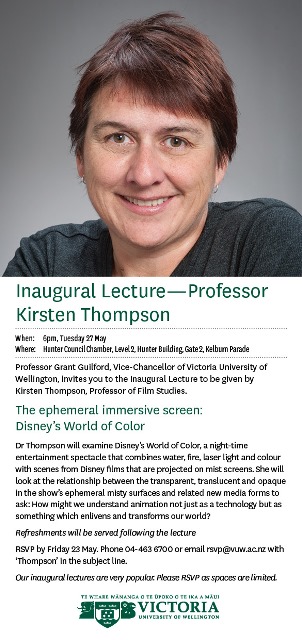
Inaugural Lecture - 'Hopkins, the editors, and the critics'
Date: 26 November 2013
Time: 6.00 pm
Venue: Hunter Council Chamber, Level 2, Hunter Building, Gate 1 or 2, Kelburn Parade
Towards the end of his life, the Victorian poet Gerard Manley Hopkins wrote a handful of poems—quite unlike anything else he had written—that are among the most remarkable and most troubling religious poems in English literature. Unpublished in his lifetime, the poems were discovered among his papers after his death, and the texts we read today have been reconstructed from his drafts by textual scholars and critics, whose every decision shapes the reception of these challenging poems. Professor Peter Whiteford will discuss something of their textual history, the disputes they have generated and what they may be said to achieve.
When: 6pm, Tuesday 26 November
Where: Hunter Council Chamber, Level 2, Hunter Building, Gate 1 or 2, Kelburn Parade
Refreshments will be served following the lecture.
RSVP by Friday 22 November. Phone: 04-463 6390 or email: rsvp@vuw.ac.nz with ‘Whiteford’ in the subject line.
Our Inaugural Lectures are very popular. Please RSVP as spaces are limited.
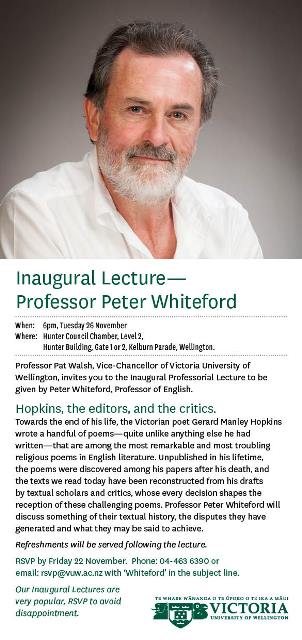
Lecture - 'When You're Dead You Go on Television': Sex, Death and Household Objects in Some New Zealand Poetry
Date: 5 November 2013
Time: 6.00 pm
Venue: Hunter Council Chamber, Level 2, Hunter Building, Gate 1 or 2, Kelburn Parade, Wellington
Professor Pat Walsh, Vice-Chancellor of Victoria University of Wellington, invites you to the Inaugural Professorial Lecture to be given by Mark Williams, Professor of English.
‘When You’re Dead You Go on Television’: Sex, Death and Household Objects in Some New Zealand Poetry
Religious themes, concepts and language occur in curious places. The faithful have no special claim to them. In spite of Nicholas Reid’s assertion that atheists suffer from icon envy, I argue that religious images are no less rich or even less ‘inspiring’ when unhinged from belief. My theme is the afterlife of religious ideas about death in a culture not noted for religious enthusiasm. I am interested in poems that display no religious belief yet contain echoes of religious language, in which the dead speak as though they were still living, and which imagine an afterlife in terms of the present physical one. The paper looks at some poems by Bill Manhire and other New Zealand writers that deal with death, the body, and consolation.
Refreshments will be served following the lecture.
RSVP by Friday 1 November. Phone: 04-463 6390 or email: rsvp@vuw.ac.nz with ‘Williams’ in the subject line.
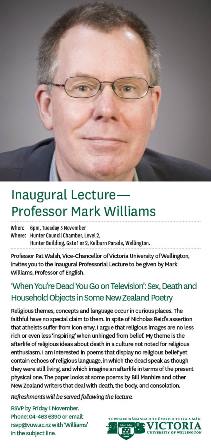
Inaugural Lecture - "From Brooke to Borges, Brecht to Billy Bragg: Kipling’s Legacy"
Date: 15 October 2013
Time: 6.00 pm
Venue: Hunter Council Chamber, Level 2, Hunter Building, Gate 1 or 2, Kelburn Parade, Wellington
Rudyard Kipling was one of the most widely read writers in the late 19th and early 20th centuries, and his legacy lives on in modern usage and culture, often in unexpected places.
His 'fingerprints' can be found, for instance, in Salman Rushdie's Midnight's Children and in Alfred Hitchcock's 39 Steps. Kipling's If— remains a much-loved poem.
Professor Harry Ricketts explores the range and value of Kipling's legacy.
Refreshments will be served following the lecture.
RSVP by Friday 11 October. Phone: 04-463 6390 or email: rsvp@vuw.ac.nz with 'Ricketts' in the subject line.
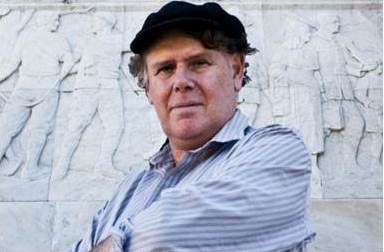
Public talk by Robert Sullivan
Date: 27 May 2013
Time: 5.30 pm
Venue: HULT119
Robert Sullivan, who wrote the libretto for Captain Cook in Rarohenga, recently performed by the Orpheus choir in Wellington, will give a talk open to the public at Victoria University of Wellington, in the Hunter Lecture Theatre 119, on Monday 27 May, 5.30pm.
Described by reviewers as “poetic and vivid” (NZ Listener) combining “moments of beauty and moment of almost cinematic excitement” (Dominion Post), its representation of the life of Captain Cook has been both criticised and defended by cultural commentators.
This is an opportunity to hear Robert himself explain the choices he made as a writer, to ask him questions and engage with him in a discussion about the politics of telling the story of so significant an historical figure. Robert’s poetry collections include Star Waka (Auckland University Press, 1999), Captain Cook in the Underworld (Auckland University Press, 2002), Cassino City of Martyrs (Huia 2010), and Shout Ha! to the Sky (Salt UK 2010).
All welcome. For further information email Anna Jackson.
Public Talk - Spanish and Latin American Cinema, Successes and Challenges
Date: 5 June 2012
Time: 5.15 pm
Venue: Room 118, Laby Building
In May 2012, Mexican directors Carlos Reygadas and Michel Franco, and Chilean director Pablo Larraín each won major prizes at the Cannes Film Festival. Their success follows a string of awards for Spanish and Latin American films in recent years. Nonetheless, many challenges remain in both local and global markets. This talk will discuss the background to contemporary accomplishments as well as highlight the issues that face today’s filmmakers.
Speakers will include:
Julio Talavera Milla, Cultural Attaché at the Embassy of Spain
Mario García, Cultural Attaché at the Embassy of Mexico
Miriam Ross, Film Programme, Victoria University of Wellington
For further information, contact Miriam Ross.
Seminars
English Research Seminar: Lizzie Towl: ‘I wouldn’t have said that’: Simone Purcell, and Gwen Mitcalfe’s annotations in an interim draft of The Godwits Fly
Date: 10 November 2016
Time: 12.00 pm
Venue: von Zedlitz, room 802, Kelburn campus
All welcome!
In The Godwits Fly, Robin Hyde (Iris Wilkinson) weaves a story out of her own history. She draws upon the people she knew and loved—family, friends, teachers, acquaintances—in order to people a world that both is and is not the world of her childhood. A prominent figure in the story is Simone Purcell, Eliza Hannay’s best friend. Simone’s real-life equivalent is Gwen Mitcalfe (née Hawthorn).
This paper will examine Simone’s role in Hyde’s ‘camoflaged autobiography’ as it develops across the extant draft material, taking special note of Mitcalfe’s pencil annotations on an interim draft of The Godwits Fly, and the letters and notes of meetings between Mitcalfe and Derek Challis and Gloria Rawlinson during the first phase of their research for The Book of Iris. I will draw also on Hyde’s 1934, 1935 and 1936 autobiographies and journals, and on A Home in This World.
Andrew Smith: Dirty Austen
Date: 29 September 2016
Time: 12.00 pm
Venue: von Zedlitz Building, room 802, Kelburn campus
All welcome!
It is a truth universally acknowledged that Jane Austen has nothing to do with the real world. According to Martin Amis, Austen is “notoriously cerebral – a resolute niggard in her descriptive dealings with food, clothes, animals, children, weather, and landscape.” In a similar vein, Carol Dole claims that mud is “a subject barely mentioned in Jane Austen’s novels”, and that the appearance of mud in recent film and television adaptations of Austen’s work is symptomatic of a modern interest in the “unsavoury details of Regency life that Austen herself omitted or only glanced at.” Taking my cue from Jill Heydt-Stevenson’s provocative study of Austen’s bawdy comedy (Austen’s Unbecoming Conjunctions, 2005), I argue that, pace Amis and Dole, mud, dirt and squalor play an important role in Austen’s novels. Famously, Fanny Price’s experience of the dirty, disordered Portsmouth household of her biological parents confirms Mansfield Park as her true home, but might the dirtiness of Portsmouth also function as a sign of this important naval base’s vitality – a benchmark against which Mansfield seems enervated and sterile? With this sort of reading of Austen’s work in mind, Joe Wright’s polarising Pride & Prejudice (2005) – a film in which pigs wander the corridors of Longbourn, Lizzie Bennet muses on life and love in a mud-filled barnyard, and the Bennet women are forever washing and darning clothes – seems less a travesty of Austen’s novels and more a foregrounding of the dirtiness of her writing.
Currently working in Victoria’s Communications and Marketing Group, Andrew Smith holds a PhD in English Literature from the University of Melbourne, and is also an alumnus of Victoria and Cambridge Universities. His doctoral research investigated representations of rural poverty in eighteenth and early nineteenth century British literature, and the extent to which they redeployed an earlier tradition of ruin sentiment established during the heyday of the Grand Tour.
Allan Drew: Same same, but different. Eve’s characterization and generic engagement in Order and Disorder and Paradise Lost
Date: 18 August 2016
Time: 12.00 pm
Venue: von Zedlitz Building, room 802, Kelburn campus
All welcome!
Lucy Hutchinson’s Order and Disorder provides, in rhyming couplet form, ‘Meditations upon the Creation and the Fall, as it is recorded in the beginning of Genesis.’ This sets her poem in the tradition of biblical verse paraphrase, a type of writing that, according to Francis Quarles who typified the form, exists ‘in the Periphrase, the adiournment of the Story, and the interposition of Meditations.’ Through her engagement with this genre, Hutchinson’s approach differs fundamentally with that of John Milton in Paradise Lost, a poem which is at its core a theodicy—a reasoned (but also dramatized through epic and other generic influences) justification of the ways of God. This paper examines and compares how Hutchison’s and Milton’s respective characterizations of Eve contribute to fulfilling the ‘purpose’ of each poem, given their differing engagement with genre. The core of this argument is an examination of characterization rather than character; that is, how Eve is assembled and deployed in the two poems, and how the narrative demands of each poem’s generic engagement affect Eve’s potential. While it remains fascinating to place Order and Disorder and Paradise Lost in textual conversation, this paper will assert that such critical analyses must respect the pressures and limits that differing generic acts place upon characterization.
Allan Drew is a PhD candidate with the International Institute of Modern Letters.
Seminar - Dougal McNeill: Against Modernism. Edward Said: a Marxist appreciation and criticism
Date: 11 August 2016
Time: 12.00 pm
Venue: von Zedlitz Building, room 802, Kelburn Campus
All welcome!
If Orientalism is read as a ‘radical realism’, as a form of representation deeply imbricated in the imperial real and justificatory of power, then how does art resist empire’s epistemological hold? Through modernism, Said believes. This talk examines the crucial links that Said and contemporary postcolonial theory make between modernism, anti-colonialism, and post-nationalism. A whole new field has come into existence (uncritically) recommending modernism as a new form of dissenting art and subjectivity. Transnational modernism is seen as post-national, cosmopolitan, boundary slipping, and border shattering. And if the Victorians are proto-modernists, postmodernism is a deflection rather than a transcendence of modernism. What, then, is occluded and lost in this inflation and expansion of modernism? And what politics undergirds this new remobilization of modernist aesthetics? Some (provisional) responses follow.
Dougal McNeill teaches in the English Programme at Victoria University of Wellington.
Seminar - John Plotz: "Semi-Detached: Victorian Fictional Experiments in Partial Absorption"
Date: 2 June 2016
Time: 4.10 pm
Venue: Stout Research Centre
All welcome!
Abstract to follow.
John Plotz is a professor of English at Brandeis University who specializes in Victorian literature and the novel. He is the author of The Crowd: British Literature and Public Politics (University of California Press, 2000) and Portable Property: Victorian Culture on the Move (Princeton University Press, 2008), which was named a Choice Outstanding Academic Title. His current project is tentatively titled “Semi-Detached: The Aesthetics of Partial Absorption” and includes work on Lawrence Alma-Tadema, Hannah Arendt, George Eliot, Henry James, Erving Goffman, John Stuart Mill, William Morris, and Edmund Wilson.
“Semi-Detached” is about what it means to get partially drawn in to a work of art. In it, Plotz asks, When you’ve half lost yourself in a book, what happens to the half left behind? Artworks are like virtual worlds that allow their audiences to feel that they are simultaneously inside and outside of them—both in an art gallery looking at a painting, and somehow within the world that painting depicts. Plotz compares 19th-century ideas about the partial immersion produced by novels, poems, and panoramas to modern-day versions of world-blocking absorption: Second Life, online gaming, even texting and Facebook.
Plotz earned his PhD at Harvard University. He has been awarded fellowships from the National Humanities Center (2001–2002) and the Howard Foundation (2005–2006), and he recently received a Guggenheim Fellowship, which will run concurrently with his Radcliffe Institute fellowship. Plotz was a recipient of the Brandeis University Dean of Arts and Sciences Mentoring Award for 2006–2007.
Seminar - Professor Jonathan Gil Harris and Professor Madhavi Menon: "Masala Shakespeare," and "A History of Desire in India"
Date: 23 May 2016
Time: 4.00 pm
Venue: Old Kirk Building, Room 501, Kelburn Campus
The New Zealand India Research Institute with the English Programme are pleased to present:
"Masala Shakespeare," and "A History of Desire in India"
A roundtable with Professor Jonathan Gil Harris and Professor Madhavi Menon of Ashoka University, India.
In "Masala Shakespeare," Jonathan Gil Harris considers how Shakespeare's pervasive presence in Indian theatre, cinema, literature and politics is not just the legacy of British colonialism and Thomas Macaulay's infamous Minute on Education. It also speaks to the uncanny convergence of Shakespeare's craft and certain Indian cultural forms in what I call a "masala poetics" -- a poetics of mixture and excess. This poetics has a heterodox potential in the current political scene, where discourses of India increasingly emphasize the singular and the pure.
Madhavi Menon's "A History of Desire in India" traces the multiple threads that converge in what we understand as desire in India. These threads include various religious, social, and cultural strains that are sometimes in conflict with each other and almost always resistant to majoritarian discourses of sexuality in the world today. The project puts pressure on not just how we understand desire but also how we do history, as well as questioning in the contours of what we call "India."
Jonathan Gil Harris is Professor of English as well as Dean of Academic Affairs at Ashoka University. He was formerly Professor at George Washington University, and held positions at Ithaca College, New York, and the University of Auckland in New Zealand. He also served as Associate Editor of Shakespeare Quarterly from 2005 to 2013.
Prof. Harris is the author of six books: Foreign Bodies and the Body Politic: Discourses of Social Pathology in Early Modern England (Cambridge University Press, 1998); Sick Economies: Drama, Mercantilism, and Disease in Shakespeare’s England (University of Pennsylvania Press, 2004); Untimely Matter in the Time of Shakespeare (University of Pennsylvania Press, 2008, named by Choice magazine as an Outstanding Academic Title for 2009); Shakespeare and Literary Theory (Oxford University Press, 2010); Marvellous Repossessions: The Tempest, Globalization, and the Waking Dream of Paradise (Ronsdale Press, 2012); and, most recently, the best-selling The First Firangis: Remarkable Stories of Heroes, Healers, Charlatans, Courtesans & Other Foreigners Who Became Indian (Aleph Books, 2015). He co-edited, with Natasha Korda, Staged Properties in Early Modern English Drama (Cambridge University Press, 2002). He is also the editor of the third New Mermaids edition of Thomas Dekker’s The Shoemaker’s Holiday (Methuen, 2008); Placing Michael Neill: Issues of Place in Shakespeare and Early Modern Culture (Ashgate Press, 2011); and Indography: Writing the “Indian” in Early Modern England (Palgrave Macmillan, 2012).
Madhavi Menon is Professor of English at Ashoka University. She works at the intersection of identity, desire, politics, and literature. She is the author of Wanton Words: Rhetoric and Sexuality in English Renaissance Drama (Toronto 2004), Unhistorical Shakespeare: Queer Theory in Shakespearean Literature and Film (Palgrave 2008), and Indifference to Difference: On Queer Universalism (Minnesota, 2015). She is also the editor of Shakesqueer: A Queer Companion to The Complete Works of Shakespeare (Duke 2010), which put queer theory in conversation with every one of Shakespeare’s poems and plays. Named a “monumental” book by CHOICE magazine, Shakesqueer is already in its second print run.
Seminar - Nikki Hessell: ‘The most backward season that has ever been noticed’: Keats Outdoors in the Spring of 1816
Date: 12 May 2016
Time: 12.00 pm
Venue: von Zedlitz Building, room 802, Kelburn campus
All welcome!
The precision of the medical botanical knowledge on display in John Keats’s poetry has long been acknowledged. Pioneering work by Donald C. Goellnicht and Hermione de Almeida established an extraordinary list of examples from Keats’s oeuvre in which he demonstrated his expertise in the qualities, both healing and deadly, of plants in the pharmakon. As Goellnicht has pointed out, the autumn of 1816, immediately after Keats finished the medical botany course taught by William Salisbury at Guy’s Hospital, saw the composition of a number of intensely botanical poems, including “Sleep and Poetry,” “I stood upon tip-toe,” and “Calidore: A Fragment,” all of which were shaped by his experiences with Salisbury. But both Goellnicht and de Almeida locate Salisbury’s influence on Keats almost exclusively within the poet’s technical understanding of medical botany. My essay argues that Salisbury’s 1816 textbook The Botanist’s Companion is in fact the most important linguistic intertext for the poems of autumn 1816, affecting not only the specifics of the medical botanical knowledge deployed in the poems, but also the language in which Keats expresses himself, especially in his adverbs and adjectives.
Nikki Hessell teaches in the English Literature Programme at Victoria University of Wellington.
Seminar - Dr Christiane Salote: Beyond War and Displacement: Contemporary Anglophone Arab Writing
Date: 5 May 2016
Time: 12.00 pm
Venue: von Zedlitz Building, room 802, Kelburn campus
All welcome!
Western representations of the Middle East continue to construct the Arab world in terms that Edward Said identified as ‘other’, ‘violent’ and ‘bizarre’. This is particularly prevalent and problematic in the reporting of wars and conflicts. Yet how do Arab writers respond to this crisis of representation? How do they portray war and violence, especially in regard to gender relations and religious affiliations? And how do they grapple with the potential effects of the (often daily) violence of war on artistic representations? This lecture will explore literary representations of war and displacement (and beyond) by writers from Egypt, Iraq, Lebanon, Palestine, Syria and the Arab diaspora in a variety of genres.
Christiane Schlote teaches drama and postcolonial literatures at the University of Basel, Switzerland. She has published extensively on transnational literatures, British Asian theatre, Anglophone Arab writing, war and commemoration, postcolonial cityscapes and Latina/o American and Asian American culture. She is the author of Bridging Cultures: Latino- und asiatisch-amerikanisches Theater in New York (1997) and co-editor of New Beginnings in Twentieth-Century Theatre and Drama (with Peter Zenzinger, 2003), Constructing Media Reality. The New Documentarism (with Eckart Voigts-Virchow, 2008) and Representations of War, Migration and Refugeehood: Interdisciplinary Perspectives (with Daniel Rellstab).
Seminar: Prof Peter Swaab (UCL): Elizabeth Bishop and the Art of Exclamation
Date: 7 April 2016
Time: 12.00 pm
Venue: von Zedlitz Building, room 802, Kelburn campus
All welcome!
In 1977 Ploughshares published an interview between George Starbuck and Elizabeth Bishop. It ended like this:
GS: Would you like to say something mysterious?
EB: !
How do you say ‘!’ ? Bishop ends the interview ends with a flourish, a wink, a raspberry. The mystery here has turned into a joke. Bishop came increasingly to savour the many uses of exclamation marks, as even a bare statistical count can show. In A Cold Spring (1955) only two poems out of nineteen included exclamation marks; in later collections the proportion rose: 11 out of 19 in Questions of Travel (1965), and all nine poems in Geography III (1976). This talk explores Bishop’s creative ways with exclamation.
… do be more careful with that boat hook!
Watch out! Oh! It has caught Miss Breen’s
skirt! There! (‘Arrival at Santos’, lines 23-25)
Peter Swaab is a Professor of English at University College London. His main field is the Romantic period, and he has published the first editions of Sara Coleridge’s poetry (Carcanet Press, 2007) and critical prose (Palgrave Macmillan, 2012). He is also interested in comedy and has written a BFI Film Classics book on Bringing Up Baby (2010) and several pieces on Edward Lear. He is the editor of the Sylvia Townsend Warner Journal and is currently working on a book about Warner.
Seminar - Emily Sutton: "The Line of Beauty, AIDS and the Selective Tradition: Hollinghurst, James, Wilde"
Date: 31 March 2016
Time: 12.00 pm
Venue: von Zedlitz Builiding, room 802, Kelburn campus
All wecome!
Alan Hollinghurst’s The Line of Beauty is dense with allusions to both Henry James and Oscar Wilde’s biographical and textual relationship. This seminar will argue that it is in the shifting, circling play of referents to both the work of these authors and a gossipy, interpersonal understanding of the men themselves that the novel is able to represent the purportedly insurmountable artistic dilemma of the AIDS crisis. Far from unrepresentable, AIDS in fact mobilises the novel’s use of a selective tradition of gay antecedents and engenders a profoundly literary engagement with the disease. By developing a productive tension between the models of James and Wilde, as both distinctly gay figures and stylistic archetypes, the novel is able to represent the bodily and societal impact of AIDS in a way that is continuous, rather than incompatible with, style – the line of beauty itself.
Emily Sutton completed her Master of Arts at Victoria University of Wellington.
Seminar - Rosalind Atkinson: Blake Criticism and Rape Culture
Date: 10 March 2016
Time: 12.00 pm
Venue: von Zedlitz Building, room 802, Kelburn Campus
All welcome!
Blake's illuminated poem, Visions of the Daughters of Albion (1793), has received huge critical attention, resulting in what E. P. Thompson has described as “a great many William Blakes on offer.” However many of these readings have been warped by the imposition of binary divisions, divisions that are undermined within the poem itself. Visions exposes sexual violence as an expression of entitlement to women’s bodies which is on a continuum with gendered objectification. Ironic, then, that much criticism places itself on the same continuum. Blake’s incisive engagement with the series of ideological assumptions we might now refer to as rape culture reveals a cultural scaffolding which we still live with two hundred years later. As a result, we could say that the best analysis of Visions’ chequered reception history comes from the poem itself.
Ros Atkinson completed an MA on Blake’s Visions of the Daughters of Albion at VUW in 2015.
Seminar - Professor Martina Ghosh-Schellhorn: India Should Be Ruled From a Palace: Government Houses in Transcultural Perspective.
Date: 3 March 2016
Time: 12.00 pm
Venue: von Zedlitz Building, room 802, Kelburn campus
All welcome!
Today's talk concerns a fresh approach to visualizing cultural heritage in a Transcultural Anglophone Studies (TAS) context. In collaboration with Artificial Intelligence experts, we have undertaken research into the material history of Empire so as to re-visit received historiographies with an aim to revising them in the light of contemporary analytical tools. The focus is on British Government Houses in transcultural perspective.
What was it like to live in a British Government House? I would like to use TAS's xml 3D virtual model of Government House Calcutta (1803-) to demonstrate the advantages of using computer technology to support research into the field of colonial architecture by incorporating into it evidence of the various life-worlds found here. Besides taking a virtual 360o tour of the building and its grounds, we will also be zooming in to one of its most representative interiors, the Throne Room. Accompanying us on our tour are a selection of the epistolary, autobiographical, as well as pictorial materials left us by the former incumbents of the House, the objects that they chose to be surrounded by, and the current use to which this still-functioning edifice is being put.
Martina Ghosh-Schellhorn, full Professor of New English Literatures and Cultures at Saarland University, Germany, and has taught at several universities in the German-speaking world, and held Visiting Professorships at a number of leading South African and Indian universities. Her major publications include Anthony Burgess: A Study in Character (1986), Writing Women Across Borders and Categories (ed., 2000),Peripheral Centres, Central Peripheries. Anglophone India and its Diaspora(s) (ed., 2005), Steep Stairs To Myself: Transitionality and Autobiography (2008), and Playing by the Rules of the Game (co-ed., 2008).
Seminar - Harry Ricketts: " What Rudyard Can Do For You"
Date: 8 October 2015
Time: 12.00 pm
Venue: von Zedlitz Building, room 802, Kelburn campus

Harry Ricketts teaches in the English Programme at Victoria University of Wellington
Seminar - Geoff Stahl: Making a Mockery of Meat: Translating Texture and Failings of the “Flesh"
Date: 20 August 2015
Time: 12.00 pm
Venue: Room 103, 81 Fairlie Terrace, Gate 10
This paper considers the fraught nature of meat analogues, colloquially known as "mock meats" (such as Tofurky, facon, veat, soysage, etc). Meat analogues offer up a semiotic and ethical provocation, an uneasy and unsettling one for some, a comforting and nostalgic one for others, through their aspiration to "meatiness." As these parodic foodstuffs in their very naming make apparent, in the Western diet meat remains the preferred point of reference, the former unable to escape what Derrida refers to as the privileging of "carnophallogocentrism." Drawing upon media stories, advertising and promotional material from mock meat manufacturers, this paper examines the ambivalence and signifying fuzziness of meat analogues in relation to larger debates about consumption and food ethics.
Geoff Stahl is a Senior Lecturer in Media Studies at Victoria University of Wellington, Aotearoa/New Zealand. He is a co-author of Understanding Media Studies (Oxford University Press, 2009), and the editor of and contributor to Poor, But Sexy: Reflections on Berlin Scenes (Berg, 2014). His research focuses primarily on music making in the city, scenes and subcultures, advertising and urban semiotics. A long-time vegetarian, this is his first foray into food studies.
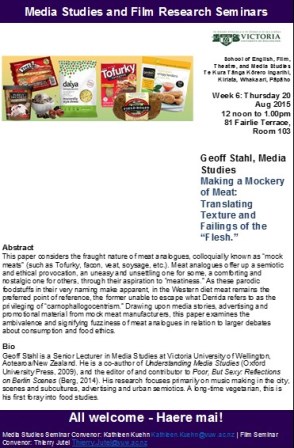
Seminar: Geoff Stahl - Making a Mockery of Meat: Translating Texture and Failings of the "Flesh"
Date: 20 August 2015
Time: 12.00 pm
Venue: Room 103, 81 Fairlie Terrace, Gate 10
This paper considers the fraught nature of meat analogues, colloquially known as "mock meats" (such as Tofurky, facon, veat, soysage, etc.). Meat analogues offer up a semiotic and ethical provocation, an uneasy and unsettling one for some, a comforting and nostalgic one for others, through their aspiration to "meatiness." As these parodic foodstuffs in their very naming make apparent, in the Western diet meat remains the preferred point of reference, the former unable to escape what Derrida refers to as the privileging of "carnophallogocentrism." Drawing upon media stories, advertising and promotional material from mock meat manufacturers, this paper examines the ambivalence and signifying fuzziness of meat analogues in relation to larger debates about consumption and food ethics.Geoff Stahl is a Senior Lecturer in Media Studies at Victoria University of Wellington, Aotearoa/New Zealand. He is a co-author of Understanding Media Studies (Oxford University Press, 2009), and the editor of and contributor to Poor, But Sexy: Reflections on Berlin Scenes (Berg, 2014). His research focuses primarily on music making in the city, scenes and subcultures, advertising and urban semiotics. A long-time vegetarian, this is his first foray into food studies.
Seminar - "'Grey tweed sports coat, green eyes, little freckles, tall, cleft in the chin, fair': Timothy Cardew/Harry Sweetman in The Godwits Fly"
Date: 13 August 2015
Time: 12.00 pm
Venue: von Zedlitz Building, room 802, Kelburn campus
Lizzie Towl
Iris Wilkinson (Robin Hyde) completed the final version of The Godwits Fly in 1937, almost exactly two years after she began the first version and a little over a decade after the sudden death of her first love, Harry Sweetman. Iris had known Harry for only a few years, but his memory and her love for him would remain with her and recur in her writing for the rest of her short life.
A version of Harry appears as Timothy Cardew in The Godwits Fly. In this paper I will consider the way that Hyde (an adult and an author) looks back on Harry. What does her representation of Timothy and the relationship between Timothy and Eliza (Iris's fictional equivalent) suggest? This paper will draw on autobiographical and documentary sources as a counterpoint to this fictionalised version of Iris' emotional history.
This paper is a companion piece to another paper on The Godwits Fly—focussing on Augusta Hannay (Eliza's mother) and her fictional equivalent, Nelly Wilkinson—which I will present at the Stout Research Centre's History of Emotions conference in September.
Lizzie Towl has lectured and tutored in the English Programme at Victoria Univeristy of Wellington.
Seminar - Michael S. Daubs: Worshipping at the altar of HTML5: App-centric media, and the commiditisation of the web
Date: 6 August 2015
Time: 12.00 pm
Venue: Room 103, 81 Fairlie Terrace, Gate 10
This paper traces linkages between the commoditisation of the Web and "app-centric media", an environment composed of a multitude of concrete-but-connected software applications. Within this environment, multiplatform HTML5 apps are often framed as the antithesis of Apple's iOS and Google/Android "siloed" mobile app platforms, but this rhetoric masks corporate involvement in the development of HTML5 and the commoditisation of the very code used to build the Web. To illustrate this process, this seminar will examine one new element of HTML5 that was hotly debated: the inclusion of digital rights management (DRM) protocols. Proponents of DRM in HTML5 argued it would increase overall interoperability while balancing the rights of content creators, providers and users. This paper argues, however, that it instead essentially legitimizes U.S.-centric copyright protections on a global scale and allows the future development of the Web to be dominated by a select group of media institutions..
Dr Michael S. Daubs is a Lecturer in Media Studies at Victoria University of Wellington and not an orthopaedic surgeon from Las Vegas. His latest research interests includes mobile application development, mobile broadband regulation, digital labour, and the mediatisation of social formations, with occasional forays into Web animation. He has recently published in Media International Australia and Mobile Media and Communication, and is contributing a chapter to the upcoming edited Springer collection Integration – Diversifikation: Medien und gesellschaftlicher Zusammenhalt im digitalen Zeitalter concerning the mediatisation of social movements.
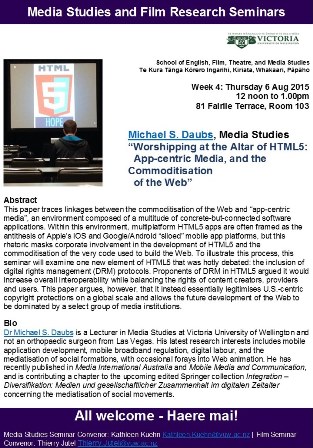
Seminar - The Language of Chance and the Form of Trollope’s 'Phineas Finn'
Date: 30 July 2015
Time: 12.00 pm
Venue: von Zedlitz Building, room 802, Kelburn campus
Beginning with the observation that Phineas Finn (1868) might just be the chanciest Victorian novel, this paper explores the formal implications of the novel’s almost obsessive use of the language of chance, odds, and gambling. Although the description of Phineas's parliamentary and romantic manoeuvres as moves in a game of chance aligns him with the adventurers and swindlers of Trollope's later fiction, I argue this is less a reflection of thematic contiguity than a manifestation of the formal limitations of the Bildungsroman. The novel is formally bifurcated between two incommensurable developmental arcs: a "careerist" plot of slow, incremental, but assured success, and the plot of the "adventurer" who abandons himself to chance. The novel's uneasy oscillation between (and ultimate frustration with) these plots, I suggest, demonstrates the unavailability of a developmental plot at this historical moment that is able to "sync" individual development with the social plot of liberal progress that constitutes the backdrop of Phineas's parliamentary career.
Adam Grener teaches in the English Programme at Victoria University of Wellington.
Seminar - Matt Cook: Queer Domesticities: taking queer history indoors
Date: 6 July 2015
Time: 12.00 pm
Venue: Room 103, 81 Fairlie Terrace, Gate 10
Matt CookIn this seminar Matt Cook uses his latest book Queer Domesticities: homosexuality and home life in twentieth century London [Palgrave, 2014] to make a case for the importance of domestic space in the understanding and analysis of queer – and here queer male – desires and relationships. In a discussion of (amongst other) artists Charles Shannon and Charles Ricketts, interior designer Oliver Ford, playwright Joe Orton, film-maker Derek Jarman, and a group of gay squatters, he explores the ways in which different men have contributed to and negotiated the contradictory but trenchant stereotypes of 'domestic outlaw' and 'sissy home boy'. He argues that queer home lives provide rich material for the understanding of conflicts, overlaps and intersections of different identifications relating especially to gender, class, and nationality.
Matt is Professor of Modern History at Birkbeck, University of London and co-Director of the Raphael Samuel History Centre. He is also author of London and the Culture of Homosexuality (2003) and editor or co-editor of A Gay History of Britain (2007), Queer 1950s (2012) and Queer Cities, Queer Cultures (2014).
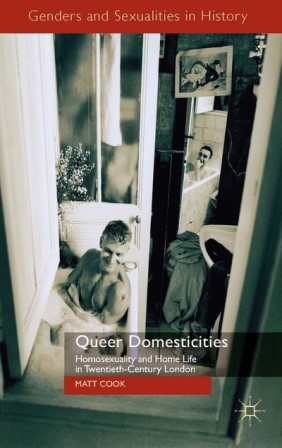
Seminar - Peter Thompson: Fearful Asymmetry: financial market information flows after the Libor and FX fixing scandals
Date: 28 May 2015
Time: 12.00 pm
Venue: Room 103, 81 Fairlie Terrace
Peter Thompson
No sooner had the global financial crisis subsided than the banking sector found itself embroiled in scandals involving the manipulation of the Libor and FX rates. Consequently, banks have tightened the protocols governing trading room information flows. Although informal networks of financial market contacts are implicated in the recent bank scandals, they also permit the verification of prices and liquidity during periods of volatility. Drawing on interviews in the City of London with bank executives and wire service editors, this paper will argue that the new communication restrictions will increase market opacity and potentially exacerbate the severity of future crises.
Dr Peter Thompson is a senior lecturer in the Media Studies programme at Victoria University of Wellington. His current research concerns media usage and information flows in financial markets and the ways in which these may be implicated in financial crises. Peter's other area of interest is media policy, including successive governments' efforts to restore or erode public service provisions. He chaired the committee which reviewed public submissions on the TVNZ Charter and is now the chair of the Coalition for Better Broadcasting Trust. He is also a founding co-editor of the IAMCR's Political Economy of Communication journal.
Seminar - Leon Gurevitch: Coding the Interface and Tracking Migration in the Global VFX Industries: The Digital Workshops of the World
Date: 14 May 2015
Time: 12.00 pm
Venue: Room 103, 81 Fairlie Terrace, Kelburn
Leon Gurevitch
Over the last few decades a large and globally distributed digital VFX industry has arisen from the periphery of Hollywood’s traditional base in Los Angeles. As Hollywood visual effects production began to adopt computational processes, practices and technologies, what started out as a branch of the IT and computer sciences industry became a hybrid. Neither 'inside' the Hollywood studios traditional financial structures, nor entirely outside the value structures attached to Hollywood's traditional output, the VFX industries have functioned as networks of precarious creative industries offering work for hire on a film by film, contract by contract basis. All of this has lead to an industry defined by migration of labour to an extent that has dwarfed even traditional Hollywood production. This paper will consider the consequences of this migration, the effects of privatised short term labour contracts and implications of the global VFX industry for Hollywood's traditional production centre. The centre piece of this talk will be the demonstration of a crowd-sourced VFX migration tool that details the thousands of professionals that have moved across the world over the last 20 years.
Leon is Deputy Head of School and Senior Lecturer at Victoria University of Wellington's School of Design. Leon has published his work in Continuum Journal, The Journal of the Royal Society of New Zealand, Animation Journal, The Journal of Television and New Media, Senses of Cinema, The New Zealand Journal of Media Studies and The Journal of Popular Narrative Media. His current research is a three-year Marsden Fast Start project to study digital image industry work cultures. Leon currently lectures graduate and postgraduate courses in photographics, computer generated culture and systems design.
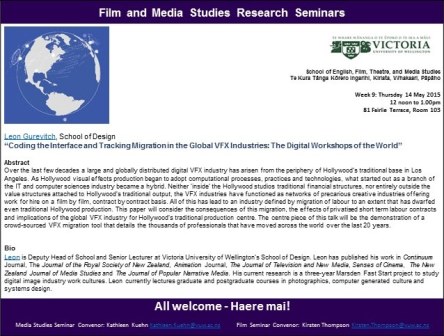
Seminar - Peter Whiteford: "Gerard Manley Hopkins’s separation from his Muse"
Date: 7 May 2015
Time: 12.00 pm
Venue: von Zedlitz Building, room 802, Kelburn campus
Peter Whiteford
The last poem that Hopkins wrote was enclosed within a letter to his longtime friend, Robert Bridges, to whom it was addressed. There had clearly been some disagreement between the two about their relative productivity as writers, and in this poem Hopkins offers an explanation for his failure to produce, an explanation that is rooted in an avowed sense of separation from his Muse. This paper will consider Hopkins's poem in some detail, looking at it as a last poem and as the work of someone who has lost inspiration.
Peter Whiteford teaches in the English Literature Programme at Victoria University of Wellington.
Seminar - Sy Taffel: We Have Never Been Open: Activism and Cryptography in Surveillance Societies
Date: 30 April 2015
Time: 12.00 pm
Venue: Room 103, 81 Fairlie Terrace, Kelburn
Sy Taffel
Whilst there exist a range of contemporaneous discourses surrounding the end of the open Internet, claims that the Internet was until recently "open" are highly dubious. This paper challenges readings of open which derives from the open source movement, but largely ignore the historical specificity of the term's emergence from the free software movement, and consequently equate open to signify better. Indeed, for numerous activist projects, the default position has long been that unencrypted telecommunications present a serious security breach. Recent developments such as the revelations regarding the NSA-run PRISM program, the imprisonment of social media users for making open calls for citizens to engage in direct action, and state-led attempts to curtail online communications during periods of civil unrest, highlight that security measures taken to preserve anonymity and encrypt telecommunications are a useful strategy for contesting the pervasive surveillance apparatus of the state and large corporations within societies of control.
This paper explores a range of such anti-surveillance technologies including TOR, GPG, and FreedomBox. Additionally the paper will highlight the activity of Hacktionlab, a UK-based tech-activist collective in promoting the application of these platforms within wider activist communities. Following Bernard Stiegler's prescriptions surrounding the economy of contribution as an alternative to prevalent pathologies of control, the paper contends that if we are to resist proletarianisation and to contribute towards a sense of communal care through forms of digital literacy – whereby individuals better understand the footprints left by their digital activities – it is pivotal to not only delineate the increasingly pervasive forms of surveillance enacted by state and corporate actors, but to outline various methods by which control over communicative spaces can be contested.
Dr Sy Taffel is currently a Lecturer in Media Studies at Massey University, Aotearoa New Zealand. In 2013 he completed a PhD in Digital Media Ecologies at the University of Bristol, UK. His research interests include political ecologies of digital media, digital media and political activism, pervasive/locative media, software studies, and peer-to-peer production. Sy has also worked as a filmmaker and photographer, and has been involved with media activist projects including Indymedia, Climate Camp, and Hacktionlab.
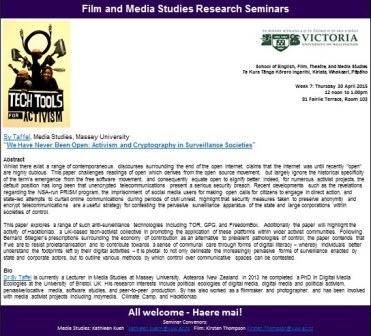
Seminar - Ashlee Nelson: "A Fictional Future for Hunter S. Thompson: Transmetropolitan’s Graphic Novel Adaptation of Gonzo Journalism"
Date: 9 April 2015
Time: 12.00 pm
Venue: von Zedlitz Building, room 802, Kelburn campus
Ashlee Nelson
The influence of Thompson's Gonzo style is so culturally pervasive that it extends to works in forms that vary greatly from Thompson's original journalism. Warren Ellis's Transmetropolitan sees an adaptation of both Thompson's Gonzo journalism and Thompson himself as a character in the medium of the graphic novel. This paper examines the adaptation of Thompson and his journalism to the graphic novel form. Transmetropolitan is not just a story about a version of Thompson, but also includes many fictional articles of Gonzo journalism. This offers an interesting view of how Gonzo journalism is read as a literary form that can be adapted fictionally. Additionally, Transmetropolitan is a dystopian story set in the distant future and this paper also seeks to analyse the implications it sets out for the continued importance of Thompson's style of in-depth participatory journalism and Gonzo narrative, which within the context of the series is portrayed as the most truthful, insightful, and best form of journalism.
Ashlee Nelson is a PhD student in the English Literature Programme at Victoria University of Wellington.
Seminar - Philippe Gauthier: Close to the Screen, Close to Reality: Archaeology of 'Screen Intimacy' from Cinema to Web Drama
Date: 8 April 2015
Time: 4.00 pm
Venue: Te Aro Campus VS 204
Philippe Gauthier
The relationship between fictional worlds described in texts and the everyday reality of the reader/spectator/gamer has been explored mostly through the concept of immersion. Using the concept of intimacy developed in television studies, I argue that the main strategy behind the methods of storytelling implemented in new audiovisual productions such as the webseries Marble Hornets (2009-2014) is not to immerse the spectator into another world but to give the impression of presence of fictional elements into his or her everyday reality. Inspired by Lev Manovich's archeology of compositing, my goal is to do an archeology of what I call "screen intimacy", starting with cinema, through to early television and ending with online drama. I will analyse how online dramas are being shaped by two cultural traditions (cinema and television) and the visual culture created by new media technologies.
Dr Philippe Gauthier is a postdoctoral researcher at the Department of Visual and Enviromental Studies at Harvard University. Gauthier had the honor of receiving three international awards for his doctoral work on film historiography (from the international society for the study of early cinema, Domitor, and the Film Studies Association of Canada). His current research focuses on media archaeology, remediation and philosophy of media history and analyses the unspoken pas de deux between film, television and new media.
Seminar - Miriam Ross: Cyclical and Non-Linear Histories of Stereoscopy: 3D Cinema, Television and Virtual Reality Systems
Date: 2 April 2015
Time: 12.00 pm
Venue: Room 103, 81 Fairlie Terrace, Kelburn
Miriam Ross
In my recent book on 3D cinema I worked with a conceptual framework that considers the film body (to use Vivian Sobchack's term) as a stereoscopic membrane: a permeable, in flux, three-dimensional membrane always positioned in front of its audience. In this seminar I will discuss the stereoscopic membrane in its movie theatre environment as well as expand my discussion to consider how it operates in home viewing environments with different screen sizes and programme types. Collectively these different viewing environments produce unique display modes specific to stereoscopy but they also provide different opportunities and challenges for the implementation of commercial films and programmes. Looking forward, I will also touch on the new possibilities offered by virtual reality systems such as Oculus Rift and what the disappearance of the screen in these modes might mean for the stereoscopic membrane in future developments.
Dr Miriam Ross is Senior Lecturer in the Film Programme at Victoria University of Wellington. She is the author of South American Cinematic Culture: Policy, Production, Distribution and Exhibition (2010) and 3D Cinema: Optical Illusions and Tactile Experiences (2015) as well as publications on film industries, new cinema technologies, stereoscopic media and film festivals. She is also co-founder and administrator of stereoscopicmedia.org.
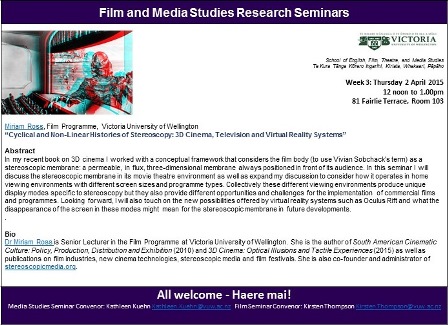
Seminar- Nikki Hessell: John Keats and Indian Medicine
Date: 26 March 2015
Time: 12.00 pm
Venue: von Zedlitz Building, room 802, Kelburn campus
Nikki Hessell
Scholars such as Hermione de Almeida and Donald C. Goellnicht have conclusively established the impact of Keats's medical knowledge on his poetry, but there has been less research on his exposure to Indian medicine. Keats’s medical studies at Guy's Hospital coincided with a boom in interest in both Indian traditional medicines and the experiences of British doctors and patients in India. The poetry that followed his time at Guy's contains numerous references to the contemporary state of knowledge about India and its medical practices, both past and present. This paper considers the major sources of information about Indian medicine in the Regency and proposes that some of Keats's medical imagery might be read as a specific response to the debates about Britain’s medical relationship with India.
Nikki Hessell teaches in the English Literature Programme at Victoria University of Wellington.
Seminar - Margaret Petty: Glamour Pink: colour, beauty, and personality in the marketing of electric light to female consumers in the USA, 1900-1960
Date: 19 March 2015
Time: 12.00 pm
Venue: Room 103, 81 Fairlie Terrace, Kelburn
Margaret Petty
"Glamour Pink" explores the development of a specific gendered discourse in the US in the first half of the twentieth century that united key beliefs of feminine beauty, identity, and the domestic interior with particular electric lighting technologies and effects. Largely driven by the electrical industry’s marketing rhetoric, American women were encouraged to adopt electric lighting as a beauty aid and ally in a host of domestic task. Drawing evidence from a number of primary texts, including women’s magazines, lighting and electrical industry trade journals, manufacturer-generated marketing materials, and popular home decoration and beauty advice literature, this talk attempts to shift the traditional historical focus on lighting as a basic utility or neutral technology, and instead exploring the ways in which modern electric illumination was culturally constructed as a desirable personal and environmental beautifier as well as a means of harmonizing the domestic interior.
Margaret Maile Petty is a senior lecturer in the School of Design, Victoria University of Wellington. Her research broadly investigates the discourse, production, and representation of artificial light in the built environment, with a particular focus on architectural lighting design and interiors. She has published broadly on the historical significance and development of lighting design in academic journals such as the JSAH, Home Cultures, Interiors, W86th and PLAT and has contributed chapters to a number of edited volumes including Anxious Dwelling / Postwar Spaces (Taylor & Francis, 2011), The Structure of Light: Richard Kelly and the Illumination of Modern Architecture (Yale University Press, 2010), and Leuchtende Bauten: Architektur der Nacht (Verlag, 2006). Most recently she co-edited Cities of Light: Two hundred years of urban illumination (Routledge, 2015) with Sandy Isenstadt and Dietrich Neumann and is currently co-editing Architectures of Display: Department stores and modern retail (Ashgate, 2016) with Dr Anca Lasc and Dr Patricia Lara-Betancourt.
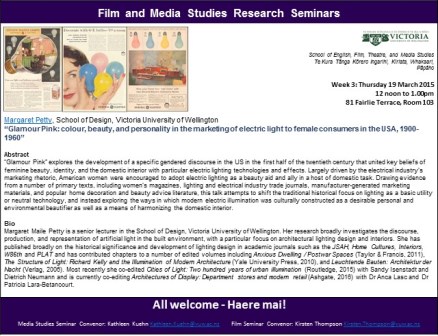
Seminar - Kennaria Brown: Getting it "Right?": African American Women Reading Tyler Perry's Films
Date: 17 March 2015
Time: 12.00 pm
Venue: Room 103, 81 Fairlie Terrace, Kelburn
Kennaria Brown
Tyler Perry is an African American media mogul with unparalleled success in three cultural industries: theatre, film, and television. However, his success is controversial. Media critics deplore the quality of his work and African American scholars are alarmed by his use of Black caricatures, especially his signature character, Madea, a Black matriarch played by Tyler Perry in drag. Despite this harsh criticism, they also acknowledge that Perry serves an "underserved audience." African American audiences, especially church-going women, have made Tyler Perry a multi-millionaire; hence, he is obviously getting something "right." Yet supporting Perry's work does not mean that African American women are not critical cultural consumers. African American woman audiences have a long history of "negotiated readings" of cultural products that tell their stories while reaffirming patriarchal hegemony, and this tradition is evident in their interpretations of Tyler Perry's work. This audience reception study uses qualitative survey responses and focus group interviews to explore African American women's responses to Tyler Perry's films as texts that simultaneously constrain Black women's voices and "get it right." It concludes that although Perry does "serve" his "underserved audience," he uses racialised tools of patriarchal hegemony to do so and African American women recognise and negotiate this tension as some of them enjoy his films.
Kennaria C. Brown, Ph.D. is an Associate Professor of Communication at Berea College in Berea, Kentucky. She holds a doctoral degree from the University of Massachusetts at Amherst. In her research she primarily uses cultural studies frameworks to explore intersections of race, gender, and class in popular media with an emphasis on subaltern audience reception. Dr. Brown is also heavily involved in Berea College’s interracial education mission. Founded in 1855 (before the Civil War ending slavery), Berea College was the first interracial and coeducational college in the Southern United States. As she spends part of her sabbatical in New Zealand, Dr. Brown is eager to learn how her colleagues at Victoria University incorporate New Zealand’s multicultural heritage into their scholarship and pedagogy.
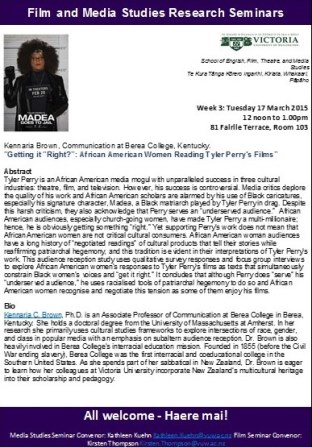
Seminar - ‘Hello, again, you little monsters!’: Reading with the Horror Hosts in American Comics of the 1950s and 60s.
Date: 16 October 2014
Time: 12.00 pm
Venue: von Zedlitz Building, room 802, Kelburn
Dr Timothy Jones
This seminar discusses the EC Comics of the early fifties, such as Tales from the Crypt, The Vault of Horror and The Haunt of Fear. Comic books were a major narrative medium amongst young readers in the American fifties; their lurid depictions of violence and the grotesque unsurprisingly produced a sensation and ensuing difficulty for their publishers. Famously, EC’s horror and lurid crime lines were decried by crusading psychologist Fredric Wertham and deplored by the Senate Subcommittee to Investigate Juvenile Delinquency.
This seminar suggests that the outcry was not just about whether comics might have a corrupting effect on younger readers, but was rather a dispute over different ways of reading. Wertham espoused a highly interpretative style of reading that stressed the interpellative power of text, whereas EC’s Bill Gaines insisted that reading was basically disconnected from the troubles of the real and instead offers a carnivalesque space in which readers might naughtily revel.
The EC Comics, and the later Warren books of the sixties, including Creepy, Eerie and Vampirella, were always introduced by a hosting figure. The hosts were more than a trope that simply tied the books together; I will suggest that they provided instructions to their readers, outlining ways of reading Gothic narrative that emphasise what Poe might have described as the ‘the delight of its horror’.
Tim Jones is a Lecturer in the English Literature Programme.
All welcome!
Seminar - Thierry Jutel: "Location, locality and place: Pacific Rim, The Hobbit and Global Hollywood"
Date: 9 October 2014
Time: 12.00 pm
Venue: Room 101, Alan MacDiarmid
Thierry Jutel
This paper investigates the relation between narrative and location, and the logic of global media flows, by contrasting the discourses of place in and around two big-budget films, Pacific Rim (Guillermo del Toro, 2013) and The Hobbit (Peter Jackson, 2012). The films and their production contexts are the results of the developments of transnational cinema, the convergence of traditional film and new media technologies, the movement and circulation of creative labour, and the products of local politics and economics in the context of global media industries. They demonstrate the negotiation between the local and the global through a transnational imaginary, a combination of investment in the mobility of creative capital and labour, and the production and integration of narrative space in the logic of media flows and reception. As such, these two films are consistent with Tom O'Regan’s argument that Global Hollywood is an "international industry" that "is both dominant and predatory". I propose to critically analyse the films by considering their production contexts with the creation of a geopolitical aesthetic in and as an outcome of the films' narratives.
Thierry Jutel teaches in the Film Programme at Victoria University of Wellington.
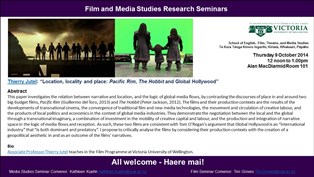
Seminar - Nikki Hessell: The Architecture in Wordsworth's 1800 Lyrical Ballads
Date: 18 September 2014
Time: 12.00 pm
Venue: von Zedlitz Building, room 802, Kelburn
Nikki Hessell
William Wordsworth was fascinated by architecture and linked it inextricably with his poetic processes, writing that two of his poems had "the same kind of relation to each other… as the Anti-chapel has to the body of a gothic Church," while his shorter pieces could be "found by the attentive Reader to have such connection with the main Work as may give them claim to be likened to the little Cells, Oratories, and sepulchral Recesses, ordinarily included in those Edifices." The critic Kenneth R. Johnston has argued that there are four poems in William Wordsworth's 1800 Lyrical Ballads that might be considered "architecture poems." This paper proposes that the theme of architecture runs much deeper in the 1800 volumes than this discrete group of four might suggest and that the famous final poem, "Michael," might be fruitfully re-read as one of Wordsworth's "architecture poems."
Nikki Hessell is a Senior Lecturer in English and Associate Dean (Equity) in Faculty of Humanities and Social Sciences at Victoria University of Wellington. She researches and teaches on the relationship between journalism and literature from the eighteenth century to the present day.
Seminar - Visualising Desire Lines
Date: 11 September 2014
Time: 12.00 pm
Venue: Room 203, 83 Fairlie Terrace, Kelburn
Kah Chan
Design, particularly data visualisation, has the potential to instigate and facilitate further behavior change. "Visualising Desire Lines" is an early exploration of mapping and visualising cyclist behavior in peak traffic. This will involve conducting an innovative visual ethnographic study: capturing high-resolution photographs of busy city intersections to create composite photographs that map cyclist paths. By aggregating and articulating the way cyclists use our city roads, urban planners, traffic engineers and policy-makers can design new traffic interventions with cyclist desires in mind.
Kah Chan drinks far too much coffee, eats too much ice cream, and spends too much time thinking about (but not necessarily playing) video games. One day, he will work more efficiently as a lecturer in Media Design at Victoria University of Wellington and ride his bicycle more instead. For now, he mostly spends his time between researching games-supported healthcare and experimental data gathering, and dreaming of owning a Raleigh 20.
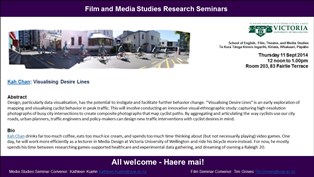
Seminar - Memory, the uncanny and the canny heroine
Date: 21 August 2014
Time: 12.00 pm
Venue: von Zedlitz Building, room 802, Kelburn
Dr Anna Jackson
In a scene from Vampire Diaries, teenager Jeremy asks his sister Elena to leave his room. She has no right to question the invasion of her privacy, he says, when he discovered through reading her diaries that she had got his memory erased. Three personal spaces are insisted on in this scene: the diary, the bedroom, and memory, and all of them are subject to invasion. A surprising number of contemporary teen dramas are concerned with the invasion, theft or control of memory as personal space, at a time when digital technologies and academic theories are increasingly constructing memory as a public, externalised space. What can be made of this odd displacement?
Seminar - How to Make Victory Rolls: Material Memory and Feminism(s) in YouTube Pin Up Girl Tutorials
Date: 14 August 2014
Time: 12.00 pm
Venue: LT 105, Alan MacDiarmid (AMLT105)
Dr Alex Bevan
Countless Youtube tutorials on how to replicate 50s hair and make-up, and blogs of women who claim to embody the pin-up “lifestyle” comprise a burgeoning online pin-up girl culture. The paper draws on theories on the archive and memory to explore the connections between material memory, nostalgia, new media, and the constructed archive of “lost beauty skills” that becomes rebranded as postfeminist in pin-up cyberculture.
Alex Bevan is a lecturer at Massey University's School of English and Media Studies. Her research is on national memory, and production studies and industry histories with a focus on television production design. She has published in Television and New Media, Adaptation, and has an upcoming In Focus piece appearing in Cinema Journal.
Seminar - The construction of a myth: Bloody Mary, Aggie Grey and the optics of tourism
Date: 31 July 2014
Time: 12.00 pm
Venue: Room 103, 81 Fairlie Terrace, Kelburn Campus
Professor Kirsten Moana Thompson
This paper considers the discursive circulation of stories in journalism and travel writing over the last fifty years which linkedleading Western Samoan hotelierAggie Grey toSouth Pacific’s iconic Tonkinese, Bloody Mary. Made famous by Juanita Hall in the Broadway musical (1949-1954), and subsequent cinematic adaptation (Joshua Logan, 1958), Bloody Mary first appeared in James Michener’s Pulitzer Prize winningTales of the South Pacific, (written 1944-1946, published 1947), and Grey was frequently alleged to be the real life Bloody Mary. In examining this relationshipI will trace the careful marketing and growth of the Aggie Grey brand andexplore the connectionsbetweenthis iconic figure in South Pacific tourism and the American film industry in the postwar period.
Professor of Film Studies at Victoria University of Wellington, Kirsten Moana Thompson is the author of Apocalyptic Dread: American Film at the Turn of the Millennium and Crime Films; Investigating the Scene (2007), as well as essays on animation. She is currently working on a monograph on animation and colour.
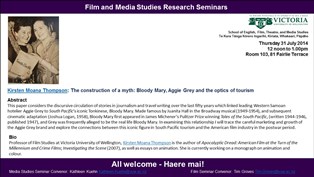
Seminar - Writing in the leper colony: Greville Texidor and Frank Sargeson
Date: 24 July 2014
Time: 12.00 pm
Venue: von Zedlitz Building, room 802, Kelburn
Margot Schwass
English-born Greville Texidor arrived in New Zealand with her German husband in 1941, direct from internment in England and a peripatetic past that included fighting with the anarchists in the Spanish Civil War. She had never written before coming to New Zealand but, with Frank Sargeson’s guidance, was soon publishing short fiction locally and overseas, including what her mentor called "one of the most beautiful prose pieces ever achieved in this country". In this talk, I examine Texidor’s emergence as a writer during her eight years in New Zealand, and the significance of her encounter with Sargeson and cultural nationalism at a pivotal time.
Margot Schwass is a PhD candidate in the English Programme, Victoria University of Wellington.
Seminar - Literary Notes
Date: 14–21 July 2014
Time: 6.00 pm
Venue: Old St Paul's, 34 Mulgrave Street, Thorndon
Discover what happens when music and literature collide.
Experience a fascinating mix of music and literature in this unique series of conversations and performances with:
31 July
Dr Charles Ferrall
Katherine Mansfield's Music and Musicians
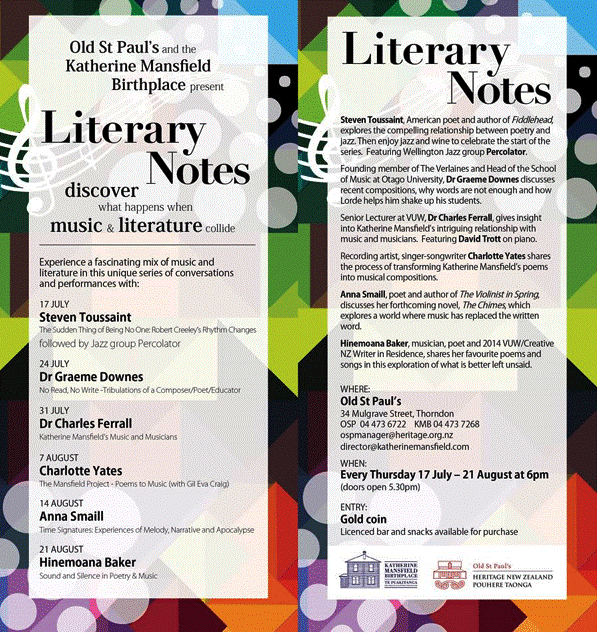
Seminar - "Time Is On My Side": The Rolling Stones in New Zealand, 1965-2014
Date: 5 June 2014
Time: 12.00 pm
Venue: Room 103, 81 Fairlie Terrace, Kelburn Campus
Dr Roy Shuker
In 1965 the emergent English rhythm and blues band The Rolling Stones toured New Zealand and Australia, headlining a three week package tour featuring overseas artists with support from local performers. They often played local halls, giving up to thirteen performances a week to audiences sometimes of only a few hundred, with ticket prices between (Australian) $1.50 and $3.50. A similar package tour in 1966 followed the same format. Subsequently, through a series of critically and commercially successful recordings, with an emphasis on self-written material, the Stones consolidated their status as 'the greatest rock'n'rollband in the world'. As a key part of this, the band became one of pioneers of 'stadium rock', headlining a series of major global tours, including the 2005-2006, A Bigger Bang World tour. As part of the tour, the band played to crowds of 40,000 plus at stadium concerts in Auckland and Wellington. Using the 1960s and 2006 New Zealand concerts, and the current tour, I want to examine the band's career as indicative of the evolution of 'rock culture', especially its commodification. I will also consider the enduring appeal of the band, despite their not having had a 'hit single' since the 1980s.
Roy Shuker researches and teaches in Popular Music Studies. His books include Understanding Popular Music Culture (Routledge); Popular Music Culture: The Key Concepts (Routledge); and Wax Trash and Vinyl Treasures. Record Collecting as Social Practice (Ashgate). His current research is on the historical development of popular music genres.
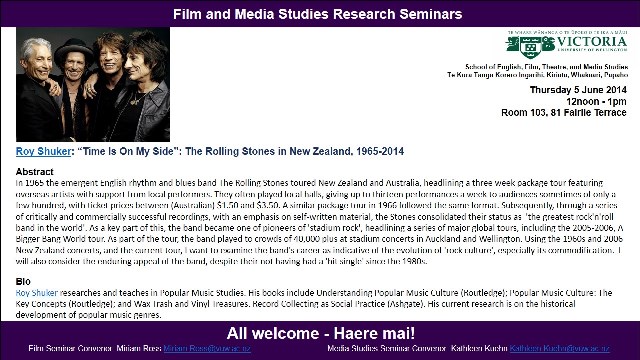
Seminar - Seitsemantoista: Documentary Film and Cultural Encounter
Date: 3 June 2014
Time: 5.00 pm
Venue: Student Union Memorial Theatre 228, Gate 3, Kelburn Campus
Dr Dafydd Sills-Jones
In 2013, Dafydd Sills-Jones spent an 8 month research leave period in Finland, where he encountered a culture that felt more like his own than that of his native Wales. Neither the deliberate naivety of observational cinema, nor the heightened symbolism of the essay film could do justice to this paradoxically alienating and familiar experience. What was required was a mode of investigation and communication which held 'cinema sincerité' at its heart, but which could also provide space to meditate on the connections between landscape, memory, language, and belonging. Drawing on the work of Benjamin, Chomsky, Rouch, Bernstein and Berne, this paper examines a 'practice-as-research' case study of the processes and struggles involved when narrative documentary techniques meet those of the essay film in an attempt to represent a cultural encounter. The paper is accompanied by a 35 minute documentary film.
Dr Dafydd Sills-Jones is a lecturer in media production at Aberystwyth University, specialising in media production studies, documentary practice, and European documentary film.
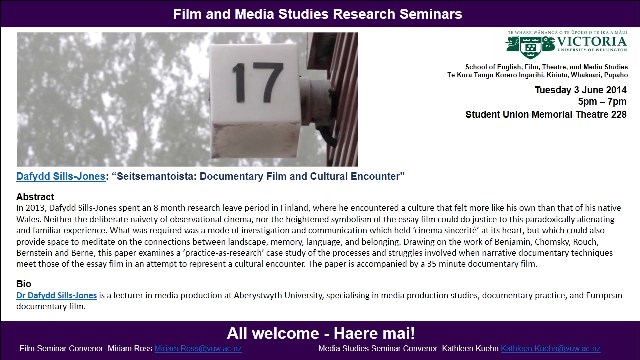
FHSS Learning and Teaching Seminar Series: Lori Leigh
Date: 26 May 2014
Time: 12.15 pm
Venue: HU LT220
Dr Lori Leigh, Theatre Programme, SEFTMS, will present a seminar on "How and why I use Improvisation in Teaching".Seminar - International Acclaim: The role(s) of International Film Festivals in supporting emerging Women's Cinema
Date: 22 May 2014
Time: 12.00 pm
Venue: Room 103, 81 Fairlie Terrace, Kelburn Campus
Dr Tess Van Hemert
Emerging filmmakers are a valuable part of many international film festivals, for the fresh perspectives they bring to audiencesand the hope that the host festival will be the first to programmea new discovery or emerging trend in international cinema. As the function of film festivals in discovering, circulating and bestowing acclaim on films and filmmakers becomes further understood by festival researchers and programmers, the question ofthe continuing underrepresentation and lack of visibility of women filmmakers on the mainstream festival circuit grows in urgency and importance. This seminar examines the role that international film festivals play in supporting the careers of emerging women filmmakers.
Dr Tess Van Hemert is a Teaching Fellow in Film at Victoria University of Wellington. She has previously worked as a Lecturer in Film at the Queensland University of Technology and JMC Academy, in Brisbane, Australia. Her current research focuses on International Film Festivals and specifically on their support of emerging filmmakers. Since 2012, Tess has also been part of the programming panel for the Brisbane International Film Festival.
Seminar - "Unfilmable: Cinema’s Spectres"
Date: 15 May 2014
Time: 12.00 pm
Venue: Room 103, 81 Fairlie Terrace, Kelburn Campus
Dr Laurence Simmons
If viewing a film is not to be simply synonymous with deciphering or even interpretation, then it must inevitably encounter the question of the unfilmable. If I can simply ‘see’ what I see when viewing a film, then in fact what I am doing is not ‘seeing’ at all but something else: decoding, unscrambling, processing. At a time when a peculiarly simplistic version of reading film is prevalent, this presentation will bear witness to the complex implication of the unfilmable within the viewing of film as its resource. It will be argued that filming as such occurs only as and in the experience of the unfilmable. The cinematic image is always present and yet never simply present: for it contains rolled up within it virtual dimensions of pastness and futurity. It is not just that a certain practice of cinema is spectral but that the evanescent yet more-real-than-life nature of spectrality is inherently cinematic. Film does not so much capture and reproduce the real so much as it already haunts reality. This presentation will focus on specific textual instances (from Hitchcock and Marker) and theoretical implications (from Derrida and Agamben) to find ways of bringing out the mysterious non-oppositional and spectral relation between film and the unfilmable.
Laurence Simmons is a professor in Media, Film and Television at the University of Auckland. He has published on a wide variety of topics under the general umbrella of critical, visual and cultural theory. His latest book examines the artist William Hodges who accompanied Cook on his second voyage to the South Pacific from a postcolonial point of view. This lecture, however, draws on his longstanding interest in critical theory (in particular deconstruction and psychoanalysis) and its application to contemporary cinema.
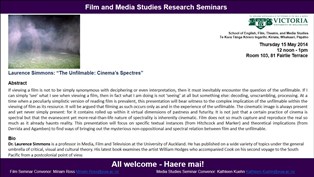
Seminar - "How and Why I Use Peer Feedback in Teaching"
Date: 12 May 2014
Time: 12.15 pm
Venue: HU LT220
Dr Anita Brady, Media Studies Programme, SEFTMS, will present at the FHSS Learning and Teaching Seminar Series on "How and Why I Use Peer Feedback in Teaching".Seminar - “Meaning, Mourning, Memory: Notes on the Silences in Holocaust Cinema”
Date: 8 May 2014
Time: 12.00 pm
Venue: Room 103, 81 Fairlie Terrace, Kelburn Campus
Dr Giacomo Lichtner
In spite of an ever-growing canon, Holocaust cinema remains strangled between the ethical call to avoid voyeurism and a necessity to communicate made ever more urgent by the passing of survivors and the proliferation of negationist discourses. Focusing on the overwhelming inability to represent aspects of the Holocaust experience such as dehumanisation and collective loss, this paper argues that - in spite of its long history - Holocaust Cinema continues to struggle with representational challenges as old as the first accounts of the camps.
Dr Giacomo Lichtner is a Senior Lecturer in History and Film at Victoria University of Wellington. He is a cultural historian of modern Europe and his research focuses especially on the role of historical cinema in interpreting and constructing popular memories of the 'long Second World War'. Giacomo has published widely on this topic, including Film and the Shoah in France and Italy (2008) and Fascism in Italian Film Since 1945: the Politics and Aesthetics of Memory (2013).
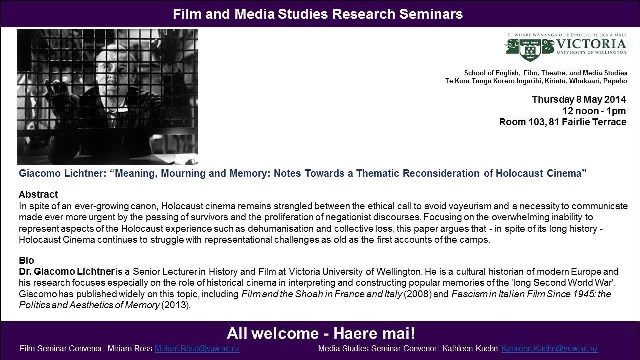
Seminar - The Desolations of Wandering: Charlotte Smith’s ‘Perpetual’ Sonnets
Date: 17 April 2014
Time: 12.00 pm
Venue: room 802, von Zedlitz Building, Kelburn
Ingrid Horrocks
In the last days of the Scandinavian journey that would become the basis of her great post-Revolutionary travel book, Mary Wollstonecraft wrote, "I am weary of travelling—yet seem to have no home—no resting place to look to.—I am strangely cast off." Wollstonecraft is not alone in depicting movement as troubling. "Forlorn," "unhappy," "helpless," "harassed," and even "terrified" women wanderers populate British writing of the late eighteenth and early nineteenth centuries, especially women’s writing. These are not travelers as we know them, adventuring out to explore the world, but unwilling pained figures, moving not because they choose to but because they have no choice. This paper comes out of my book project, Reluctant Wanderers: Women’s Textual Movements, 1784-1814, which examines what these early women wanderers can show us about the terrors of leaving home. At the same time, the book explores what is exciting and expansive about such journeys beyond the familiar.
While this study is about travellers, poetic speakers, and characters in novels who wander not because they choose to but because they have no choice, it is also about texts that wander as much as their human subjects: it is about sonnet sequences that seem unable to stop; novels that digress endlessly from plot, stray from prose into verse, or quote other texts obsessively; and travel narratives that seem incapable of reaching a homecoming. Wandering, I argue, can be productively understood as a formal trait of these texts as much as an activity that takes place within them. By reluctant wandering, then, I mean literal movement that resists its own forward progression—and texts which seek to represent that resistance formally. I am interested in finding ways of understanding digressions (wanderings) in writing we are only just learning to re-read, and asking what can be said about the formal aesthetics of texts that cannot or do not choose to chart a clear path forward. What is the relationship between wandering protagonists who cannot direct their routes and formally wandering texts, as manifested through length, repeated digression, and forms of intertextuality?
Here I focus on the example of Charlotte Smith’s Elegiac Sonnets (1784-1800), a sequence of ninety two sonnets developed and published over a sixteen year period. Smith played a central role in making the traditionally male persona and perspective of the wanderer available, and even well-suited, to women writers. Charting the darkening tropeic and formal resonances of wandering, I argue, provides a way to approach Elegiac Sonnets as an evolving, historically-situated, and potentially open-ended text. A strategic translation of the wanderer occurs in Smith’s 1790s sonnets, as Smith registers through this figure a profound sense of personal and political loss in the wake of the bloodying of the French Revolution and the declaration of war with France. "I delight to stray" is transformed to "desolate I stray." At the same time, the repetitive and self-referential form of this ‘perpetual’ sonnet sequence itself replicates the theme of deep literal and psychological homelessness evoked in its individual sonnets. Each new installment on the same theme works as a declaration of continued and deepening exile.
Seminar - The Art of Film: Indexicality and Aesthetic Relevance
Date: 17 April 2014
Time: 12.00 pm
Venue: Room 103, 81 Fairlie Terrace
Associate Professor Marc Furstenau
In 1938, Rudolf Arnheim predicted that "the film will be able to reach the heights of the other arts when it frees itself from the bonds of photographic reproduction and becomes a pure work of man, as animated cartoon or painting." With digitization, the cinema may be understood to have at last realized its aesthetic potential – precisely by overcoming its photographic basis – solving at a stroke the most persistent problem in film theory. Yet in most respects filmmakers have not taken advantage of the new graphic and painterly possibilities of digitization, and film theorists have tended to bemoan the loss of what is often described as cinema’s "indexicality," its putative link to "reality." In this presentation I will briefly outline the history of debates about the very possibility of film art. Roger Scruton, in a line of argument that can be traced back to Arnheim – and in one of the most infamous contributions to this debate – has argued that the cinema cannot be art given its photographic basis, and that its aesthetic potential could only be achieved by assuming the status of drama or painting. Using Alfred Hithcock’s Vertigo (1958) as an example, I will evaluate the validity of such a claim, and ask whether it is film’s unique status as a compelling reproduction of reality that counts as a criterion of aesthetic relevance, or if film art requires that this status be overcome.
Marc Furstenau is Associate Professor of Film Studies at Carleton University, Ottawa. He has published on cinema and semiotics, film theory, on the philosophical cinema of Terrence Malick. He is the editor of The Film Theory Reader: Debates and Arguments (Routledge, 2010) and co-editor of Cinema and Technology: Cultures, Theories, Practices (Palgrave, 2008). He is the former President of the Film Studies Association of Canada, and is co-editor of the Canadian Journal of Film Studies).
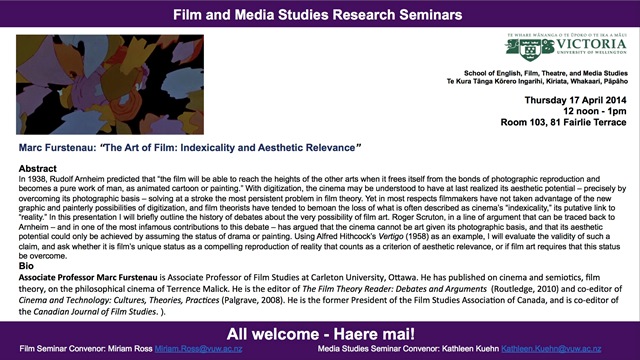
Seminar - Function Follows Forms: Dark Patterns in Contemporary Webdesign
Date: 10 April 2014
Time: 12.00 pm
Venue: Room 103, 81 Fairlie Terrace
Walter Langelaar
A recent study published by two Facebookers shows that not only is the company collecting data on 'self-censorship' behaviour of their users, the browser code that makes this monitoring possible is also capable of 'reading' what you type - before you even press the enter button. This talk will discuss several technological approaches to the current state of webmonitoring of users, and how these approaches can lead to designing so-called 'dark patterns' - user interfaces that are basically designed to trick you into displaying a certain behaviour. Drawing upon earlier projects related to this research, I will show several examples of how the use of simple form fields and other input methods in websites can actually represent a wide variety of usage, both to the server collecting the data and the unsuspecting user.
Walter Langelaar is a lecturer in Media Design at Victoria University of Wellington. His work in media arts and design ranges from artistic videogame modifications to critical reflections on Internet culture, and his installations and collaborative online projects have been shown in numerous venues, galleries and festivals like Transmediale and CTM, iMAL, DEAF, Ars Electronica, STRP and Medialab Prado. Before moving to Wellington last year, Langelaar ran the moddr_ medialab at Rotterdam-based arts venue WORM; Institute for Avant-Gardistic Recreation.
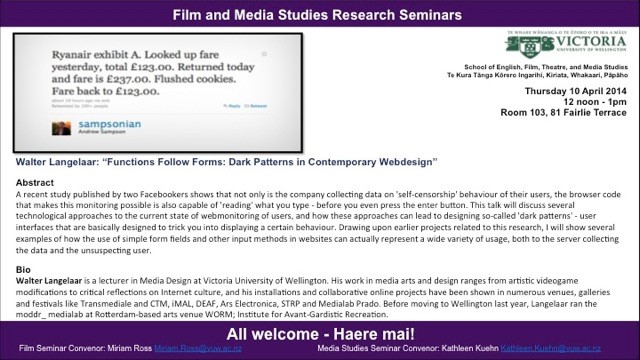
Seminar - A Short Performance from a Dramatic City
Date: 9 April 2014
Time: 4.10 pm
Venue: Stout Research Centre Seminar Room - 12 Wai-te-ata Road, Kelburn
Associate Professor David O'Donnell
With its challenging weather, geography and political climate, Wellington is undoubtedly a dramatic place to reside. Perhaps this is why Wellington has been acknowledged as New Zealand’s theatrical centre for several decades. Residents bent double by Lear-like storms gratefully tear open the monumental doors of Circa Theatre in order to purge their seething emotions, or perhaps merely to seek shelter. Yet Wellington’s theatre reputation is under siege. On Saturday 20 September 2013, Downstage Theatre closed its doors for the last time following years of failing finances and falling audience numbers. Auckland critic Natasha Hay – inspired by John Key’s comment “Wellington is dying” – published an article arguing that Wellington’s theatre industry is “undeniably in decay”. As the tattered velvet curtains flap in the nor’wester, the box office lights fizzle out, and the last Toi Whakaari graduate books a $29 flight to Auckland, Wellington’s “Creative Capital” brand lies rusting in the receding tide.
This talk takes you on a critical, creative, illustrated performance re-staging the heady heyday of Wellington theatre, from the point of view of someone who was there, drinking from the cracked cups in the green room, painting sets and plastering posters at 3 in the morning, rehearsing the routines, learning the lines, calling the cues, blowing the budgets, counting the koha. This journey brings us inevitably to the dreaded decay of the present day – or does it? Where is Wellington theatre going? Are there any batty bacchanaleans still wishing to binge on culture? Are any accomplices left lurking in the wings? Or could it be merely a trick of the light?
David O'Donnell is a theatre director and Associate Professor in Theatre. David has directed many premieres of New Zealand plays, most recently Te Karakia by Albert Belz, Collapsing Creation by Arthur Meek and West End Girls by Ken Duncum. He has been nominated six times as director of the year at the Chapman Tripp Theatre awards, winning in 2004 for directing David Edgar’s Albert Speer. David has published widely on New Zealand and Australian theatre, Māori and Pacific performance and community theatre. With Marc Maufort, he co-edited the book Performing Aotearoa (2007) and has been editor of the Playmarket New Zealand Play Series since 2010.
Seminar - Edward Lear's Travels in Nonsense and Europe
Date: 27 March 2014
Time: 12.00 pm
Venue: Room 802, von Zedlitz Building, Kelburn
Professor Peter Swaab
Edward Lear was a travel writer as well as a nonsense poet, and this talk explores affinities between the two genres of his writing.
Lear travelled far and wide, into regions where he was frequently thought odd. His narratives combine Pickwickian comedy, Byronic melancholy and social anthropology. Nonsense poetry also encounters unexpected locales, with their own flora and fauna and rules. Taking leave of the normal, it is a poetry of departures; narrating quests for love and adventure, it is a form of mock-epic; creating a world of its own, it is a British counterpart to French Symbolism.
The talk will discuss why questions of travel mattered so intensely to Lear, what was nonsensical about Victorian excursions into the wider world, and what was Victorian about the nonsense poetry of the age.
Peter Swaab is a Professor of English Literature at University College London. He is the editor of the Selected Nonsense and Travel Writings of Edward Lear and of the first ever editions of poetry and prose by Sara Coleridge. His other publications include an introduction to The Two Noble Kinsmen for the Penguin Shakespeare, a BFI Film Classic book on Bringing Up Baby and a co-edited book about the British film director Thorold Dickinson. His next project is a book on Sylvia Townsend Warner.
Seminar - Adventure at Home: Global Images and Domestic Culture in Postwar American Television
Date: 27 March 2014
Time: 12.00 pm
Venue: Room 103, 81 Fairlie Terrace
Dr Minette Hillyer
This paper considers Adventure, a television series made as a co-production between the American Museum of Natural History and CBS from 1953-56. The show promised a “series of experiments in TV…a series we might describe as a science non fiction show.” It seemed a good way for the Museum to profit from its substantial visual holdings, and to showcase its work to a national audience; it also presented the challenge of reconciling the Museum’s role as educator with the more populist appeal of television. Like previous encounters between Museum and moving image, then, it grappled from the outset to reconcile adventure with improvement.
The response? To domesticate adventure. Television tied Adventure – show and experience – to the everyday, not only through its regular appearance in the Sunday night schedule, but through the comparative, and illustrative use of adventures already captured on film. Film here became evidence of the scientific, the settled, the monumental, of the ‘what had happened’: the permanent record which television itself was not. Television, on the other hand, provided the opportunity for the show to take on a role of educator apparently appropriate to the age. While the show experimented with trips into space, and titillated with primitive dance, on the whole its efforts were directed toward the civic-minded engagement of television viewers with their (changing) world. Thus, Adventure presented the opportunity for viewers to inquire after their own place in the world through a steady emphasis on the relatable, yoking domestic technology to the project of knowing oneself. A series of adventurers – mostly American – acted as guides to the wider world, and omnibus subjects anthropomorphized or otherwise domesticated the natural, or just the foreign, comparing that which was evidently exotic with the everyday and local experiences available to viewers at home. The show thus participated in a wider cultural inquiry which was directed and shaped by the social and natural sciences, but staged through vehicles of a more popular culture, television prominent among them. Such inquiry considered the state of being American as it emerged in evanescence – in the fashions and problems of the contemporary age – and thus tied adventure to the American experience, framed as a quasi-populist inquiry into the self.
Dr Minette Hillyer is a lecturer in the Media Studies Programme within the School of English, Film, Theatre, and Media Studies at Victoria University of Wellington.
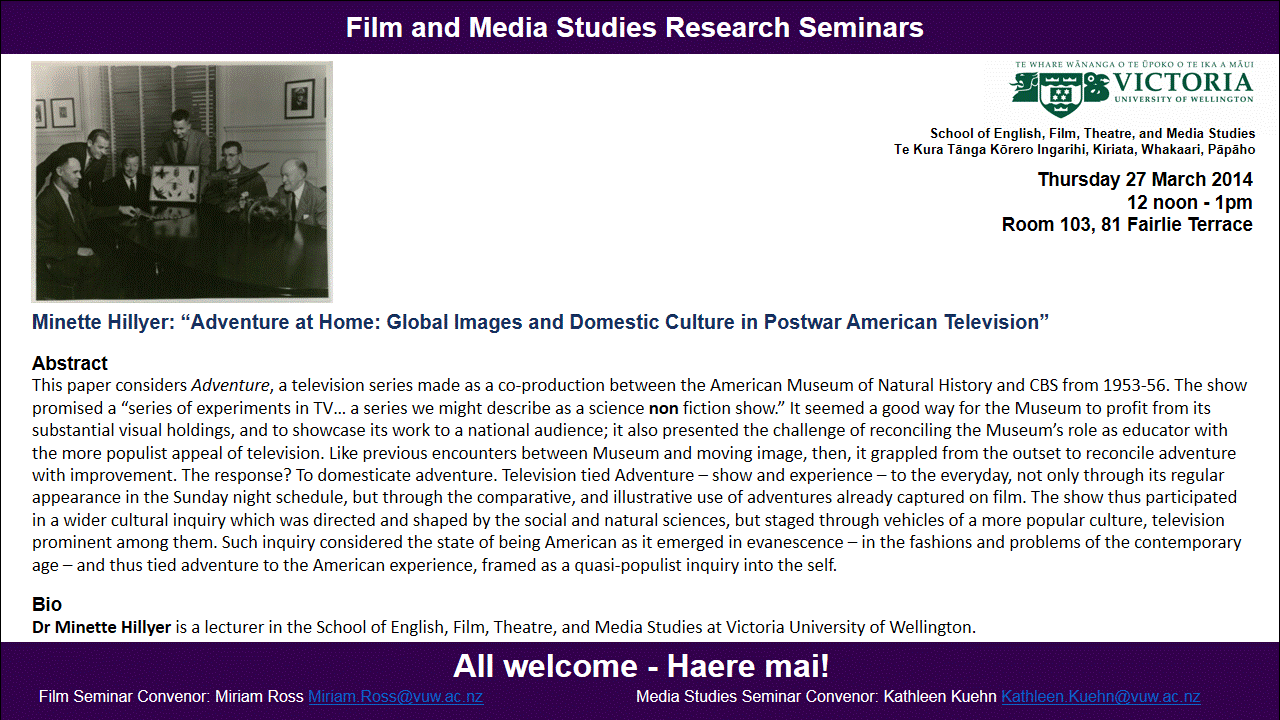
Seminar - Mirror Worlds: Transpacific Rivalry and Mimetic Revelation in American & East Asian Literature.
Date: 20 March 2014
Time: 12.00 pm
Venue: von Zedlitz Building, room 802, Kelburn
Associate Professor Matthew Packer
Mutual fascination and competition between America and China today—as between Japan and the US earlier—are confirming René Girard’s theory of mimesis that even human desires are imitative: people want what they see others wanting and rival one another and clash as their mirrored interests converge. Writers and filmmakers both sides of the Pacific are reflecting this wide-ranging idea, for which Girard has been dubbed "the new Darwin of the human sciences." The Japan that outdid America in the late twentieth century, claims William Gibson, was in large part the inadvertent creation of America. Similarly, suggests author Xiaolu Guo, today "China is better at being American than America is." But for better or worse? This presentation surveys a range of writers including Neal Stephenson and Haruki Murakami to consider in transpacific trends both the pitfalls of mimetic desire and its promise.
Dr Matthew Packer, Associate Professor of English at Buena Vista University, Iowa, is currently a Visiting Scholar at Victoria University of Wellington. He has published on a variety of American and contemporary writers.
Seminar - "'Liquid Modernity': The Craft Beer Scene in Wellington, New Zealand"
Date: 13 March 2014
Time: 12.00 pm
Venue: Room 103, 81 Fairlie Terrace
Dr Geoff Stahl
Recently, Wellington’s craft beer scene has emerged as yet another sign of the city’s maturing cosmopolitanism, a development that further manifests the reliance on, and often uncritical celebration of, a particular species of rarefied consumption. This singular moment also presents us with some provocative dilemmas about the ethics of entrepreneurial engagement with the city. Drawing upon Hartmut Häußermann’s notion of “culinary spaces” and Zygmunt Bauman’s various iterations of “liquid modernity,” this presentation will outline a selection of key issues relating to the ascendance of Wellington’s craft beer scene. In this talk, I will set out to explore the relationship between craft, “DIY,” culture and neoliberalism as they are uneasily and often unreflexively articulated together, a constellation of apparent contradictions and ambiguities that offers a localised version of the sort of artisanal economies that are becoming an increasingly central part of cities around the world.
Dr Geoff Stahl is a Senior Lecturer in Media Studies at Victoria University of Wellington. His publications include work on scenes and subcultures in Berlin, Montreal and Wellington. He is the editor of the forthcoming collection, “Poor, But Sexy: Reflections on Berlin Scenes” (Peter Lang, 2014)
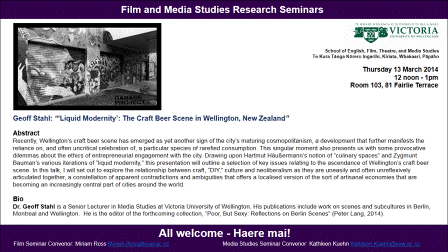
Seminar - 'The material sonnet: poetry and Presbyterianism in seventeenth-century Scotland'
Date: 31 October 2013
Time: 12.00 pm
Venue: Room 802, von Zedlitz Building, Kelburn Campus
Sarah Ross
English Programme
The Scottish presbyterian poet Elizabeth Melville is unique as a seventeenth-century woman writer who actively circulated her religious poetry in extensive and politicised manuscript networks—in her case, across the parishes of rural Fife during the early decades of resistance to King James VI and I’s religious policies. Melville’s sonnets to Andrew Melville, the leader of the Scottish Presbyterian movement and James’s bête noir, are preserved in a seventeenth-century manuscript copy of the History and Chronicles of Scotland, alongside bitterly political poems by Andrew Melville himself. Elizabeth’s and Andrew’s sonnets are highly intertextual, at the level of image, reference, and formal construction—and the contiguity of their material preservation speaks to a poetic and religious culture in which the religious sonnet acted as a currency of a dispersed religious community, variously banished, peripatetic, and imprisoned.
This paper draws on recent research in libraries and churchyards in Edinburgh and Fife, generously funded by an Australian Research Council project on The Material Cultures of Early Modern Women’s Writing. There are even a few photos.
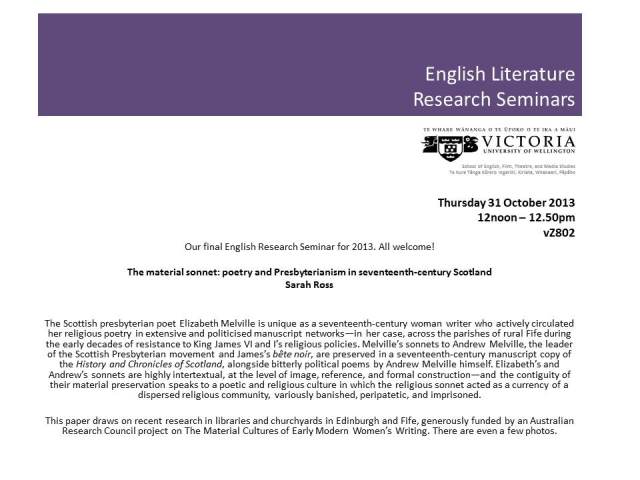
Seminar - 'Being Venice'
Date: 17 October 2013
Time: 12.00 pm
Venue: Room 103, 81 Fairlie Terrace
Miro Bilbrough
I will show a few clips from the film, Being Venice with a focus on the construction of subjectivity and emotional or human time in relationship to protagonist Venice. Screen scholar Yvette Biro calls this species of time, Tempus. The cinematic construction of Tempus is one focus of a Doctorate of Arts I am currently undertaking at University of Western Sydney where I am researching how to interrupt and transform feature film narrative with strategies of the poetic or the cine-poem. I will also touch on my journey as a filmmaker, one of whose spurs was Film Studies at Victoria University of Wellington with Russell Campbell in the late eighties, and reading Herman Melville’s Bartleby for English 101 with Damien Wilkins, a short story I later made into a film of the same name...
Being Venice will premiere at Paramount Cinema on Thursday 17 October 2013, as part of the 18th Italian Film Festival in Wellington.
Seminar - "Pan and the Edwardians"
Date: 17 October 2013
Time: 12.00 pm
Venue: von Zedlitz Building, room 802, Kelburn
Eleanor Toland
MA Candidate, English Programme
Between 1900 and the beginning of the First World War, there was an explosion of Pan imagery in British Edwardian fiction and poetry. Writers like Barrie, Forster, Kenneth Grahame and Saki used the Pagan god as a literary device. Pan, originally the god of shepherds, became a versatile fictional character, appearing as a nightmarish villain in Machen and a Jesus-analogue in The Wind in the Willows. My thesis will examine why the British took up the figure of a goat-god from Ancient Greece and how they used him as a shifting mirror for their own rapidly changing age. This talk will discuss the versatility of Pan as a symbol, while remembering the atavism and primitivism that underlined nearly every fictional Pan.
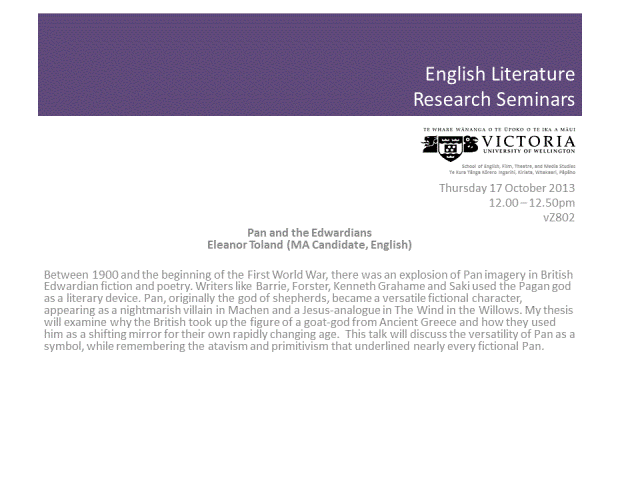
Seminar - 'Mobility and Colour in 1960s Bombay Cinema'
Date: 7 October 2013
Time: 12.00 pm
Venue: Room 103, 81 Fairlie Terrace
Associate Professor Ranjani Mazumdar
Jawaharlal Nehru University
This paper explores the intersection of the railways with colour stock and domestic tourism in the 1960s. Experiments with colour date back to 1937 with Imperial Films’ Kisan Kanya (1937). However the overall move to colour in India was slow and painful and it was only in the second half of the1960s that the industry made a full transition. In the absence of colour stock production in the country, the industry relied on imports from Technicolor and Eastman Kodak. The move to colour and the almost simultaneous arrival of lighter cameras and new sound technologies created a desire to travel and explore the landscape of India. The train thus became a significant presence in the films of this decade, emerging as the site where romance combined with the exploration of scenic and heritage sites. The expansion of railway passenger traffic in the 1960s gave rise to the typical “summer vacation” captured in several advertisements of that period. In 1965 almost 45 crore people (450 million) were on the move. It was during this decade that the drive to use posters and billboards at the railway stations of the country to publicize films was termed “railway publicity” by the film industry. The industry believed that railway publicity allowed them to target a mobile and expanding middle class audience. The train was literally in the image and outside of it as an imaginative force, propelling the transformation of cinema.
Ranjani Mazumdar teaches Cinema Studies at the School of Arts & Aesthetics, Jawaharlal Nehru University. She is currently Marie Curie Fellow in Indian Film at the University of Westminster, London (2013-2014). Her publications focus on urban cultures, popular cinema, gender and the cinematic city. She is the author of Bombay Cinema: An Archive of the City (2007) and co-author with Nitin Govil of the forthcoming The Indian Film Industry (2014). She has also worked as a documentary filmmaker and her productions include Delhi Diary 2001 and The Power of the Image (Co-Directed). Her current research focuses on globalisation and film culture, the visual culture of film posters and the intersection of technology, travel and design in 1960s Bombay Cinema.
This seminar is generously supported by Sekhar Bandyopadhyay and the New Zealand India Research Institute.
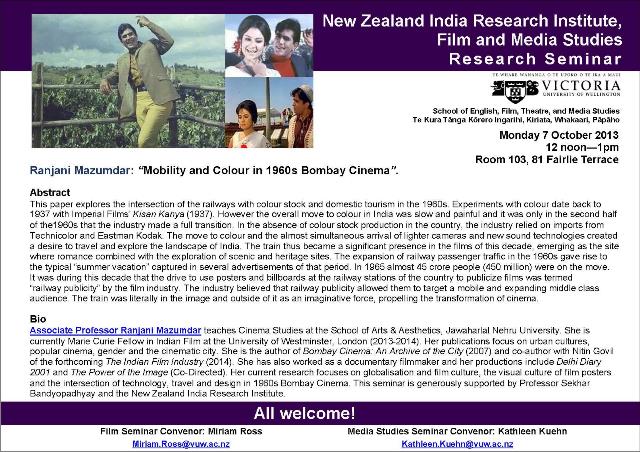
Seminar - 'ORO: excess and minimalism'
Date: 3 October 2013
Time: 12.00 pm
Venue: 77 Fairlie Terrace, Room 306
Sam Trubridge will discuss his latest project ORO: excess and minimalism - a multi-disciplinary performance project that was recently workshopped in Cardiff at World Stage Design 2013. This new work for The Playground NZ employs pervasive theatre forms integrated with proscenium theatre practices to produce a ground-breaking new performance experience that moves audiences through city sites to the grand spectacle of the baroque stage space.
Sam Trubridge is a designer, director, curator, performance artist and writer working in NZ and across the world in new performance forms and across various media. He directed and designed the The Playground NZ's first work The Restaurant of Many Orders (UK, NZ, Italy) and with sleep scientist Philippa Gander created Sleep/Wake for The Auckland Festival 2009. In 2010 he extended this collaboration with The Waking Incubator: a trans-disciplinary symposium with arts practitioners and sleep scientists. He directs the annual Performance Arcade on Wellington Waterfront.
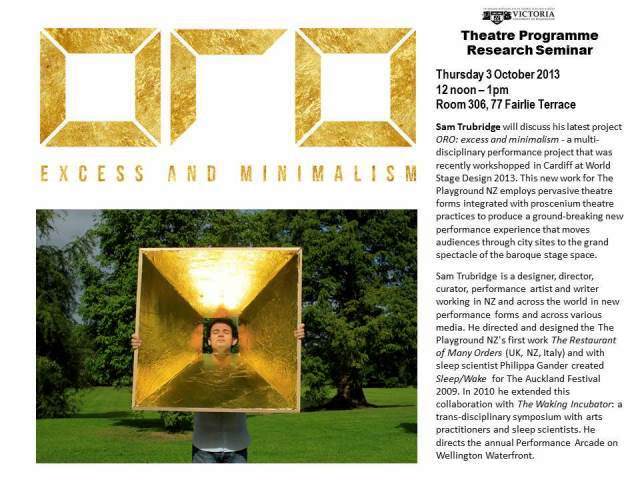
Seminar - Theorising 'Hope Labor'
Date: 26 September 2013
Time: 2.30 pm
Venue: Access Grid
Seminar - Theorising 'Hope Labor'
This is an online seminar. If you would like to attend please email Melanie Milicich stating the seminar name and Access Grid venue you would like to use.
Kathleen Kuehn
This talk introduces the concept of ‘hope labor’ (Kuehn & Corrigan, 2013) as un- or under-compensated work carried out in the present, often for experience or exposure, in the hope that future employment opportunities may follow. Drawing from interviews conducted with voluntary digital content creators (sports bloggers and consumer reviewers), I demonstrate how hope labor is indicative of contemporary capital-worker relations across various sites within the formal creative/cultural economy. While such work practices are certainly not new, I argue that hope labor presents an explanatory framework that is structurally, ideologically and epistemologically distinct from other perspectives that have theorised similar forms of ‘free labour.’ After contextualising its place in the lexicon of related terms – e.g., digital labour, creative labour, sacrificial labour, venture labour, playbor – I discuss how hope labor constructs a temporal relationship that functions to shift costs and risks onto the individual (i.e., the hope laborer). Rationalised within a meritocratic ideology, hope labor is normalised as a means of mitigating risk in precarious times. Upon considering hope labor’s immaterial dimensions, however, I raise the following questions: Is hope labor necessarily exploitative? And if so, what might a politics of resistance require?
Dr Kathleen Kuehn, Lecturer in Media Studies at Victoria University of Wellington. Her research focuses on the political economy of digital labor and cultural production, branding and consumer culture. She recently moved to New Zealand from the US and teaches courses on new/digital media, technologies and surveillance.
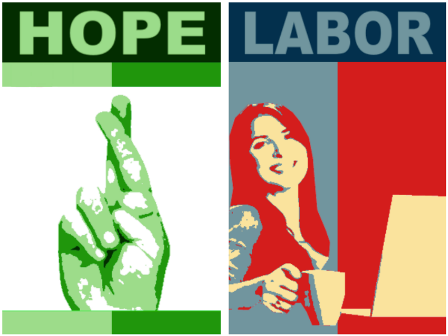
Seminar - 'I, Clodia'
Date: 19 September 2013
Time: 5.10 pm
Venue: Room 802, von Zedlitz Building, Kelburn Campus
Dr Anna Jackson
English Programme
The affair between the Roman poet Catullus and the aristocratic Clodia Metelli is well known – from his account of it. Both loving her and hating her, he gives a contradictory portrait of her. She is more beautiful – than a prostitute who isn’t beautiful at all; the rival she loves is a god – and, in another poem, stinks like a goat; she prefers Catullus himself to a god – but her word is no more reliable than the pattern of wind on water. These are taunting poems, clearly designed to provoke a response, and often written evidently in response to moves made by Clodia. I applied for an Arts Council grant to imagine the poems that might have been provoked by, or might have prompted, the poems we have by Catullus. But the project turned out to involve a bit more than this, as I’ll explain.
Anna Jackson has published five collections of poetry with Auckland University Press (most recently Thicket, shortlisted for the NZ Post Book Awards 2012). Grants and awards have included the 1999 Louis Johnson New Writers’ Bursary, the 2001 Waikato University Writer’s Residency, and, most recently, a Creative New Zealand grant to write “I, Clodia” – in Rome.
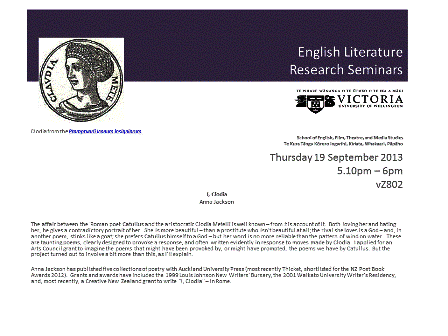
Seminar - Eighteenth Century Theatres and Social Assemblage Theory
Date: 19 September 2013
Time: 12.00 pm
Venue: Room 802, von Zedlitz Building, Kelburn Campus
Professor David Worrall
Nottingham Trent University
By around 1800 there were about 1 million theatre seats on sale annually in London. In other words, the number of seats on sale closely mirrored the city's population (c.1m-1.4m). This paper argues that built theatrical spaces are places of social emergence, spaces of capacity, linked to several types of social networks and markets. In the British Georgian period they occurred on a massive scale within discrete and quantifiable markets. The paper is a novel transposition of Manuel DeLanda's social assemblage theory into theatre history.
David Worrall is professor of English at Nottingham Trent University and currently ANU Research Fellow at the Humanities Research Centre. His new book, Celebrity, Performance, Reception: British Georgian Theatre as Social Assemblage will be published by Cambridge University Press in October 2013. David Worrall has held grants and Fellowships from the Leverhulme Trust, AHRC, British Academy, Huntington Library and Folger Shakespeare Library.
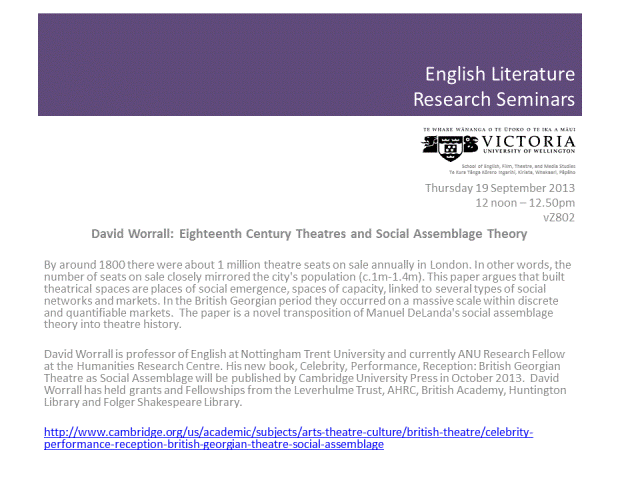
Seminar - 'I Don't Need the "Exposure,' I Need to Pay the Rent!' Hope Labor, Self-exploitation and the Politics of Resistance
Date: 12 September 2013
Time: 12.00 pm
Venue: 81 Fairlie Terrace, Room 103
Dr Kathleen Kuehn
This talk introduces the concept of ‘hope labor’ as an explanatory framework for understanding the motivation behind voluntary forms of online social production and, increasingly, work in the creative and cultural industries. Simply put, hope labor is the task of carrying out un- or under-compensated work, usually for experience or exposure, in the hope that future employment opportunities may follow. Drawing from interviews with digital content creators (sports bloggers and consumer reviewers), hope labor was originally conceived as a secondary motivation for unpaid digital labor - namely, online forms of user-generated content. This paper, however, extends the notion of hope labor to account for how 'free labor' is increasingly extracted within the formal economy, where writers, designers, filmmakers and other creative and cultural workers are regularly asked to trial their talents in the present as a future-oriented investment (think: Huffington Post, crowdsourcing campaigns, spec work, ‘prelancing,’ etc.). Bound by its own structural, ideological and epistemological specificities, I argue that hope labor constructs a temporal relationship between present and future work that shifts associated costs and risks onto the individuals themselves. After reviewing a number of contemporary examples, I turn towards the recent wave of highly publicised cases of ‘hope labor backlash,’ in which professional and aspiring creatives alike have openly resisted the compensatory promise of "experience and exposure" for free work. I ask what it means to resist hope labor in the so-called "new economy," and the role capital (economic, social and cultural) plays in privileging who can participate in these ‘discourses of refusal.’
Kathleen Kuehn is a Lecturer in Media Studies at Victoria University of Wellington. Her research focuses on the critical political economy of digital labor, creative production and consumer culture.
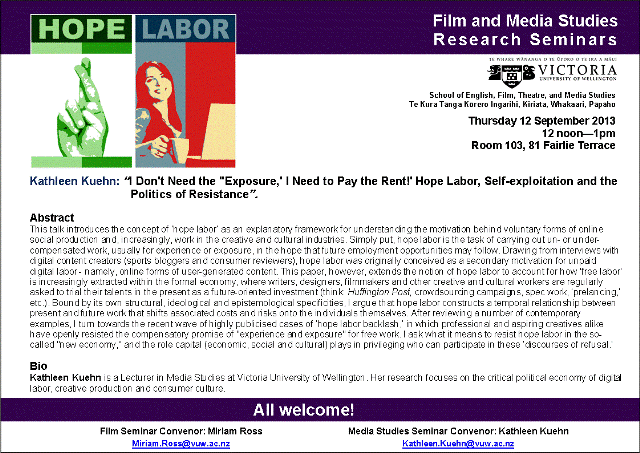
Seminar - Depicting Shakespeare
Date: 22 August 2013
Time: 12.00 pm
Venue: Room 802, von Zedlitz Building, Kelburn Campus
Professor Stephen Orgel
English Programme
The only drawing of a Shakespeare play surviving from Shakespeare’s lifetime is an illustration of Titus Andronicus, which shows the play in performance, on a stage. The visual arts imagined Shakespeare on stage until well into the eighteenth century, but thereafter Shakespearean illustration grew increasingly independent of the stage tradition, less concerned with realizing the plays in action than with devising an artistic style appropriate to Shakespearean poetry. Shakespeare became not a subject to be illustrated, but the inspiration for scenes of romance or fantasy, or for the realization of history. In production, by the nineteenth century, scene painters were providing an essential element in the theatrical experience—sometimes the plays themselves were rewritten to accord with the scenic invention. The ambiguous relation between the visual Shakespeare and the textual Shakespeare may serve as an epitome of what we have wanted from Shakespeare over the centuries.
Stephen Orgel is Professor of English at Stanford University. He has published widely on the political and historical aspects of Renaissance literature, theater, art history and the history of the book. His work is interdisciplinary, and is increasingly concerned with the patronage system, the nature of representation, and performance practice in the Renaissance. His most recent book is Spectacular Performances (2011). He is also the author of Imagining Shakespeare (2003), The Authentic Shakespeare (2002), Impersonations: The Performance of Gender in Shakespeare's England (Cambridge, 1996), The Illusion of Power (Berkeley, 1975), Inigo Jones (London and Berkeley, 1973, in collaboration with Sir Roy Strong), and The Jonsonian Masque (Cambridge, Mass., 1965). He has edited Ben Jonson's masques, Christopher Marlowe's poems and translations, the Oxford Authors John Milton, The Tempest and The Winter's Tale in The Oxford Shakespeare, Trollope's Lady Anna, and Edith Wharton's The Custom of the Country, The Age of Innocence and The Reef in the Oxford World's Classics. He is the general editor of Cambridge Studies in Renaissance Literature and Culture, and of the new Pelican Shakespeare. He has been awarded a Guggenheim Fellowship, NEH Fellowships, and ACLS Fellowships; he has been a Getty Fellow, a visiting fellow at New College, Oxford, and the Clark Lecturer at Trinity College, Cambridge. He is a Fellow of the American Academy of Arts and Sciences.
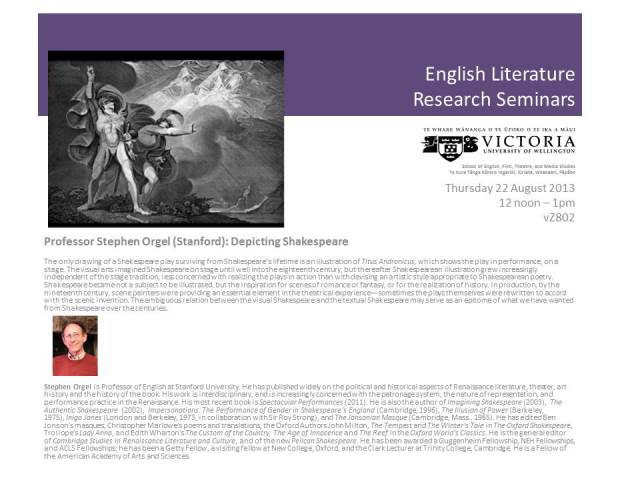
Seminar - "Media’s Role in Disaster Risk Reduction: The Third-Person Effect"
Date: 15 August 2013
Time: 12.00 pm
Venue: 81 Fairlie Terrace, Room 103
Dr Doug A. Van Belle
This semi-formal model shifts the conceptualisation of the politics of disaster risk reduction (DRR) out of the development-oriented frameworks that dominate the subject. The resulting model focuses on an interacting set of necessary causes that show when and how the mediated observation of distant disasters can create opportunities for the adoption of disaster risk reduction policy. This dynamic is called the Third-Person Effect and it also offers an explanation for the puzzle of why disaster-stricken communities often fail to adopt disaster risk reduction policies even when ample resources are made available from outside sources. It presents a new perspective on how and when exogenous actors might facilitate the adoption of disaster risk reduction policy. While the model is specific to disasters and disaster policy, it appears to be generalisable, with particular applicability to environmental policy and resource management policies such as fisheries management where stake holding and rational-choice collective action dynamics are significant factors.
Doug A. Van Belle is a Senior Lecturer in Media Studies at Victoria University of Wellington. He is the Editor-in-Chief for International Studies Perspectives, and has previously worked as a Distinguished Visiting Professor of Disaster Risk Reduction Program and the Latin American and Caribbean Center at Florida International University.
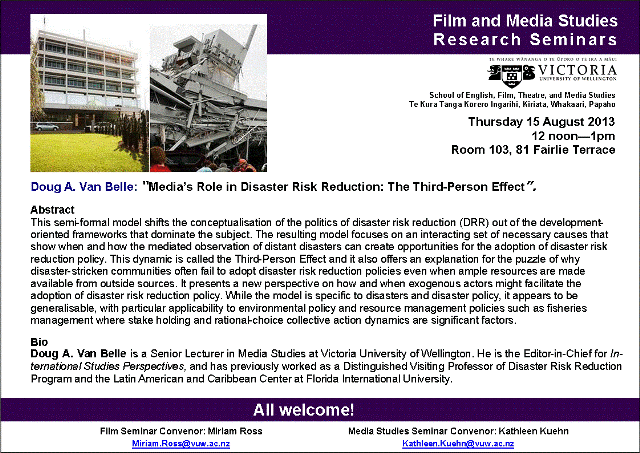
Seminar - “Representing Australia Past and Present: Immigration Nation’s Aesthetics of Literalism”
Date: 8 August 2013
Time: 12.00 pm
Venue: Room 802, von Zedlitz Building, Kelburn Campus
Marilyn Brune
Université de Lorraine
In 2011, Australian TV Channel SBS broadcasted a three-part documentary series on Australian history, Immigration Nation, which focused on the white Australia policy and the gradual shift, from the 1940s onwards, from restrictive immigration towards a policy of multiculturalism. As a documentary that addresses a sensitive issue in Australian society, Immigration Nation tries to reach a difficult balance between the discussion of problematic points in early twentieth-century Australian history and the representation of more positive images of the nation.
This paper discusses the documentary’s visual representation of Australia, and seeks to deconstruct its aesthetics of literalism. While Immigration Nation’s visual characteristics are partly defined by its format – that of a TV documentary –, it develops a specific image of Australia’s immigration policies through its focus on archival work as well as representation of history through images. Its visual representation of the past, the present, and the link between them articulates a very specific discourse about Australian history that is deeply embedded in the multicultural context of 2010s Australia.
Marilyne Brun is a lecturer in postcolonial studies at Université de Lorraine in Nancy, France. Her research interests include critical race theory, whiteness studies, Australian literature and history, and diasporic literatures. She has published articles on Australian literature and critical race theory.
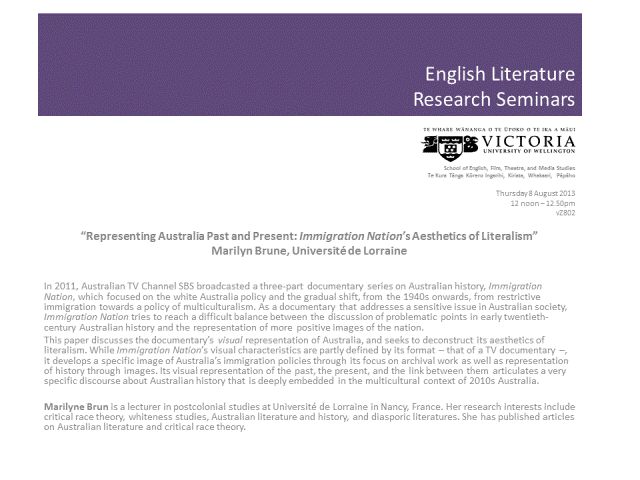
Seminar - “A little bit too sentimental”: evaluation and knowledge in conversations about popular music in rom-com soundtracks
Date: 1 August 2013
Time: 12.00 pm
Venue: 81 Fairlie Terrace, Room 103
Dr Lauren Anderson
Popular music is as inescapable a part of the contemporary romantic comedy as the “meet cute” and the happy ending. However, the ways audiences make sense of this ubiquitous formal element are rarely discussed. Theories and models of these interpretive processes, and popular music’s wider use in films, often emphasise audiences’ encounters with popular music outside the cinematic context. Rather than discussing audiences’ meaning-making processes in detail, however, these models rely instead on abstract figures of the audience. This paper outlines these theoretical figures, and demonstrates how audience research can move beyond the limitations inherent in such abstract approaches to more effectively reveal the complexities in the ways audiences hear and relate to popular music in film soundtracks.
Lauren Anderson currently lectures in Film Programme at Victoria University of Wellington. Her research has explored audience relations to popular music in film. She is half of the NZ team for the recently launched World Hobbit Project, in which researchers from approximately 40 countries will investigate audience reception of Peter Jackson’s Hobbit trilogy.
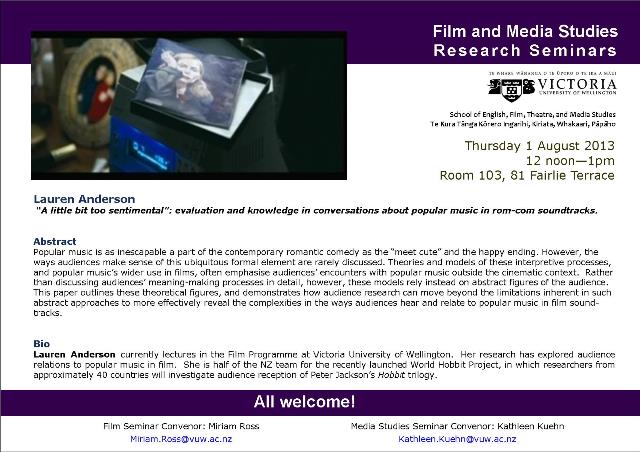
Seminar - Ropata Purana: Rēweti Kōhere’s Version of Robert Burns
Date: 25 July 2013
Time: 12.00 pm
Venue: von Zedlitz Building, room 802
Dr Nikki Hessell
English Programme
Tai Ahu
School of Law
Rēweti Kōhere, the renowned Ngāti Porou translator, educator, journalist and minister, was extremely attached to the work of Robert Burns. He included translations of Burns’s poetry and commentary on the lines in articles that he wrote for the newspaper Te Toa Takitini in the 1920s and early 1930s, and noted “He hemonga noku a Purana, he tangata tino tau ki te whakatakoto i te korero” [“I have a heartfelt connection with Burns, he was an expert at expressing his words”]. This presentation will explore some of the linguistic features of Kōhere’s engagement with Burns as well as some of the implications for how we read the original Burns poems once we have encountered them in te reo Māori.
Seminar - Kiss-Ins, Marriage Equality and Public Space
Date: 18 July 2013
Time: 12.00 pm
Venue: 81 Fairlie Terrace, Room 103
Dr Anita Brady
Media Studies Programme
This paper considers the politics of kissing in campaigns for marriage equality. Drawing primarily on Lauren Berlant and Michael Warner’s analysis of how heterosexual culture structures queer sex out of public discourse, it considers whether the “kiss-in” unsettles the heterosexual hegemony that Warner argues underpins campaigns for “gay marriage.” It focuses, in particular, on kiss-ins staged in Chick-fil-A restaurants in the United States in 2012 as part of National Same-Sex Kiss Day (NSSKD), and argues that the organisers of NSSKD imagined a performance of same-sex intimacy thoroughly in keeping with the limits of heteronormative culture. However, the paper suggests that the inherent contingency of “the kiss” as a gesture of intimacy might nonetheless offer the political possibility of a queer disruption to public space.
Anita Brady is a lecturer in Media Studies at Victoria University of Wellington. Her most recent publications examine Adam Lambert and mediated “outness,” the transgendered nature of New Zealand identity, and celebrity same-sex kissing. She is currently working on a history of same-sex kissing in the media.
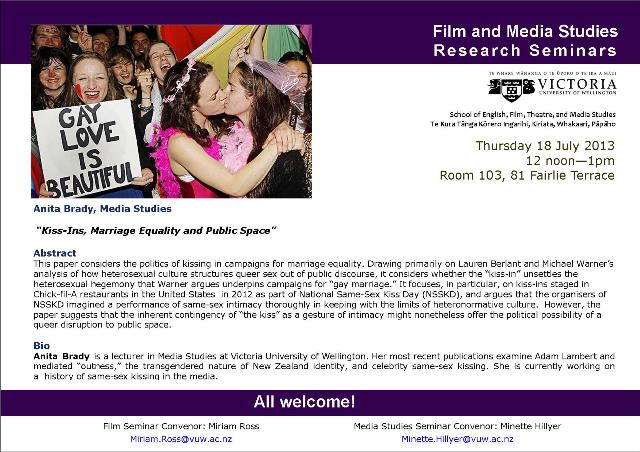
Seminar - British women and journalistic identity at the fin de siècle
Date: 13 June 2013
Time: 12.00 pm
Venue: von Zedlitz Building, room 802
Dr Elizabeth Grey
Massey University
This seminar will outline on-going research into women’s journalism in Britain at the turn of the twentieth century, which in 2012 led to the publication of the collection, Women in Journalism at the Fin de Siècle: Making a name for herself (Palgrave Macmillan). The seminar will discuss the multiple motivations of female journalists, their varying responses to the conflicting dictates of anonymity and celebrity, and the range and extent of their contribution to a dynamic industry. It will also discuss how the British periodical press itself enabled, generated, constrained, and shaped women's writing and their complex construction of multiple identities, at a key historical period.
A series of questions animate this research, questions that are just as relevant now as at the turn of the twentieth century.
• What does literary fame mean, particularly, for a woman?
• What strategies might women journalists pursue in the search for name and fame in the period?
• How might the transformations in journalism be used to women’s advantage?
• How might women writers manipulate both their writing and their publicity to secure both fame and financial success?
• Might their strategies be perceived to be ‘selling out’?
Elizabeth Grey's areas of research interest include communication apprehension, the teaching of oral communication competencies at tertiary level, and written and oral communication demand in scientific and business workplaces. She also undertakes research in nineteenth-century women's poetry and journalism. She has written a book on Victorian women’s poetry, and has recently completed a book project on women’s journalism in the nineteenth century.
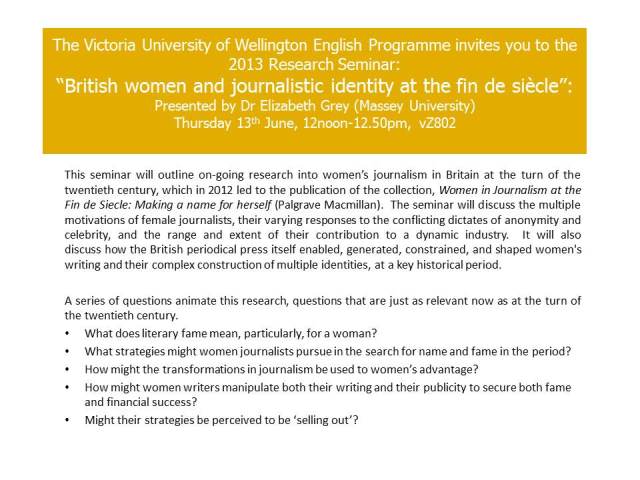
Seminar - Movie Maps: Promoting Film-Tourism through the Development of Mobile, Digital Mapping Tools
Date: 30 May 2013
Time: 12.00 pm
Venue: Buchanan Room, 2nd Floor, Cotton Building, Kelburn campus
Dr Alfio Leotta
Film Programme
This seminar examines smart phone applications that match geo-data of film locations with visual and textual information about relevant screen productions. In particular, it assesses how these mobile and digital movie maps can be used to promote film-induced tourism by allowing users to find film-locations. Recently there has been a widespread recognition of the economic and cultural potential of film-induced tourism, defined as tourist visitation to sites where movies and TV shows have been shot. The various functionalities of film-location phone apps seem to cater particularly for the needs of film-tourists.
The first film-location app, Scene Seekers, was released in 2009. The original version of Scene Seekers was only able to match the title of the film with the gps map of the locations. Gradually subsequent digital movie maps introduced a number of other functionalities such as background information about the film and the locations, location photos, film stills and so on. Tourism stakeholders are progressively investing more resources in the development of such applications that are becoming a key (and yet unexplored) aspect of film-induced tourism.
This seminar represents the first attempt to study such a new phenomenon. The development and introduction of digital movie maps will be likely to have a an impact on the growth of film-tourism, particularly in countries like Britain and New Zealand that have invested in the promotion of film locations as potential tourist destinations. Furthermore, the analysis of the relationship between mobile media, film and film locations will contribute to theoretical debates about media convergence. From a film studies perspective, finally, it is also necessary to assess how the convergence between film and mobile screens exemplified by the development of smart phone movie maps, will contribute to redefine the notion of film spectatorship and in particular the relationship between viewers and film space.
Alfio Leotta's primary research interests focus on the relation between film and tourism, the history of New Zealand cinema, and New Italian Cinema. My book Touring the Screen: Tourism and New Zealand Film Geographies examines the representation of landscape in a number of film productions shot in New Zealand which have subsequently been used as marketing tools to attract tourists to the country.
Seminar - Screening Short Films
Date: 23 May 2013
Time: 12.00 pm
Venue: Room 103, 81 Fairlie Terrace
Stefanie Reis
Freelance producer and curator
Diversity is one of the strongest and most obvious characteristics of the Short Film category. Short Film is not a genre but an art form that includes all genres: experimental, documentary, fiction, animation, installation, etc. The short form can be a laboratory for visual and narrative explorations and experiments that are harder to play with in a feature film environment. Each short film is different and filmmakers decide where they want their work to be seen. A short film might find its place online rather than at Cannes and a screening in a local pub or on the street might be as rewarding as an international festival invitation. This presentation will provide information on the institutionalized structures for shorts that exist in Europe. Stefanie Reis will give an overview of different festivals and insights into the selection criteria used when curating a short film programme.
Stefanie Reis studied Cultural Studies with a focus on Film and Philosophy. She has been programming short films at festivals since 2002 and was a World Sales Agent for international shorts at KurzFilmAgentur Hamburg from 2007-2012. She is currently travelling New Zealand and producing a piece on Short Film in New Zealand for French/German broadcaster Arte TV. Stefanie works as a freelance producer, curator and author of long and short formats.
Seminar - Onscreen Indigeneity: working notes on the cultural politics of Māori TV
Date: 16 May 2013
Time: 12.00 pm
Venue: Room 103, 81 Fairlie Terrace
Dr Sue Abel
Department of Film, Television and Media Studies, University of Auckland
Dr Jo Smith
Media Studies Programme, Victoria University of Wellington
Launched in 2004, Māori Television has attracted a broad audience while having a specific mandate to revitalise Māori language and culture. This seminar presents working notes on how Māori Television negotiates the tensions and dynamics between the needs of a specific Indigenous group and a more general appeal to New Zealand national culture. The presentation is in two parts. The first part discusses the pleasures that Māori Television offers its Pākehā viewers, and the extent to which Māori Television programming informs Pākehā of Māori experiences of colonisation. The second part of the presentation focuses on Māori Television programming as a form of "Indigenous insistence" that has the potential to voice another social order: one that invites its audience to think anew its relationship to place, community, politics and popular culture. This research is supported by a Royal Society Marsden fund (2012-2014).
Sue Abel is Senior Lecturer at the University of Auckland. Her position (based 50% in the departments of both Māori Studies and Film, Television and Media Studies) was created to acknowledge the importance of scholarship on indigeneity and media. Her publications to date have largely focused on Māori and media, but a recent research trip to Canada to explore Canadian indigenous media has provided plenty of material for further writing.
Jo Smith is Senior Lecturer in the Media Studies Programme at Victoria University of Wellington. Her work examines the socio-political power of media technologies with a primary focus on how colonial histories inform contemporary media practices. She is co-editor of a special issue on Taika Waititi’s feature film Boy for the New Zealand Journal of Media Studies (with O. Ripeka Mercier) and has articles in a range of journals including Arena, Continuum, Transnational Cinemas, Settler Colonial Studies and AlterNative: an International Journal of Indigenous Peoples.
Seminar - Ephemeral Exhibition and Immersive Space: Disney’s World of Color
Date: 2 May 2013
Time: 12.00 pm
Venue: Room 103, 81 Fairlie Terrace
Professor Kirsten Moana Thompson
Film Programme
This paper will focus on the unusual theatrical and exhibition dimensions of Disney’s “World of Color,” a new outdoor entertainment spectacle which screens nightly at its Island of Adventure theme parks on ephemeral materials: the water spray and light produced by 1000 variable fountains, each of which are illuminated a different colour, choreographed in time to music and alternating with jets of fire. It will trace how this show innovates a new form of theatrical exhibition, combining older art forms with contemporary computer-controlled light and colour design and immersive effects. It will also explore ideas of translucency, transparency and opacity in light of their key material history in cel animation, and briefly consider their relationship to new media technologies today.
Professor of Film Studies at Victoria University of Wellington, Kirsten Moana Thompson is the author of Apocalyptic Dread: American Film at the Turn of the Millennium and Crime Films; Investigating the Scene (2007), as well as essays on animation. She is currently working on a monograph on animation and colour.
Seminar - Character and Childhood in Children's Literature: Case Studies in Classical Reception
Date: 26 April 2013
Time: 12.00 pm
Venue: von Zedlitz Building, room 802
Dr Elizabeth Hale
University of New England, Australia
This talk looks at what Classical Reception Studies (the study of the transmission and reception of classical antiquity) has to offer the study of children's literature. I will consider ways that representations of classical antiquity (its literature, tropes, topoi and genres) contribute to ideas about childhood and youth, and to the formation of character in novels for young readers. The talk will refer to a range of children's novels and stories from the nineteenth and twentieth centuries, including school stories, domestic fiction, and fantasy.
Elizabeth Hale teaches children's literature and media, and creative writing at the University of New England, in Australia. Her research is interdisciplinary, incorporating classical reception studies, gender studies, and childhood studies. She is working on a book, 'Parables of Talent in Children's Novels: from Tom Brown to Pollyanna,' which explores changing formulations of talent and genius in children's literature.
Seminar - Glamourous objects, feminism and the politics of time
Date: 11 April 2013
Time: 12.00 pm
Venue: 81 Fairlie Terrace, Room 103
Sarah Elsie Baker
School of Design, Victoria University of Wellington
Glamour is often understood as a capitalist technology of allure and as a device with which women are objectified. The consumption of a glamorous aesthetic has also been theorised as representing a refusal to be imprisoned by gender norms and as a form of escape from everyday life. In this paper I explore the charm of glamorous material objects and consider what an exposition of glamorous qualities can offer a feminist politics. I suggest that glamour works as an imaginative resource by both triggering a sense of the already enjoyed and provoking idealised visions of the future. Rather than viewing these imaginings as insular escapism or meaningless fantasy, I take seriously the desires that they represent. While remaining aware of the danger in celebrating a device so central to capitalism, I argue that by recognising and understanding the allure of glamorous objects feminists may be able to enrich the feminist project, as well as make its values more relevant to wider constituencies of women.
Sarah Elsie Baker is a lecturer in Design Culture and Context. She has published in the areas of consumer culture and domestic space. Her book 'Retro Style: Class, Gender and Design in the Home' will be published by Berg in 2013.
Seminar - Textile Shakespeare: Folds and Gloves
Date: 21 March 2013
Time: 12.00 pm
Venue: von Zedlitz Building, room 802
Dr Hester Lees-Jeffries
St Catherine's, Cambridge
This paper presents some work in progress from a major new project, 'Textile Shakespeare'. It uses gloves and folds (especially ruffs) as two points of entry into early modern literary and material culture, with a particular focus on works by Shakespeare. It suggests that textile objects - the way in which they were made, used, and thought about - might be useful analogues for ideas about performance texts and dramatic construction, for example. Shakespeare's father was a glover: might this matter? What might it mean when the Ghost in Hamlet promises that he 'could a tale unfold'? Why might textiles more generally be 'good to think with' in relation to Renaissance literature? No specialist knowledge of Shakespeare (or early modern textiles) will be assumed, and there will be lots of pictures…
Hester Lees-Jeffries graduated BA from Canterbury in 1996 and MA (Hons.) in 1998. In 1999 she went to Cambridge as a Commonwealth Scholar; she completed her PhD in 2002. Her first book, England's Helicon: fountains in early modern literature and culture was published by Oxford UP in 2007; her second book, Shakespeare and Memory, will also be published by Oxford this summer; she has published numerous articles on Shakespeare, Jonson, Spenser, and Sidney. She teaches Shakespeare and early modern literature in Cambridge, where she is a fellow of St Catharine's College.
Seminar - Community, Labour and Exploitation in CNN’s iReport
Date: 21 March 2013
Time: 12.00 pm
Venue: Room 103, 81 Fairlie Terrace
Dr Michael S. Daubs
Media Studies Programme
In November of 2011, Jack Womack, a senior vice president at the US-based cable news station CNN, announced the network would lay off approximately fifty workers, in part because “new technology in desk-top editing and user-generated content and social media have made some editing and photojournalism positions redundant.” Within days of this announcement, CNN re-launched their citizen journalism website iReport.com. The site had been in operation for five years, collecting user-generated content in exchange for the promise to “take part in the news with CNN.” This ostensible democratisation of media production, however, is not always the primary motivation for user participation. Indeed, many people simply want to share with a small circle of friends or family while others seek feedback and recognition from a community of other digital media enthusiasts. The recent rebranding of the iReport website as a social network indicates CNN’s recognition of the role of community in encouraging user production. While the iReport site still incorporates democratisation-based rhetoric, newly-incorporated social networking elements emphasise participation within a community and disguise the generation of labour as socialisation, community participation or play. By associating iReport with this community-driven ethos, CNN is able to guarantee the production of specialised content and capitalise on the immaterial labour of online iReport communities while maintaining its traditional gate-keeping role.
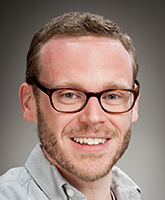
Michael S. Daubs is a Lecturer in Media Studies at Victoria University of Wellington. He received his PhD in Media Studies from the University of Western Ontario in 2011. His research has focused on user-generated content and the appropriation of user-generated aesthetics, texts, and labour by traditional media institutions. Current research projects involve the use of digital media by activist movements such as Occupy Wall Street as well as mobile broadband regulation and application development. His latest publication, “Network Neutrality, Mobile Networks, and User-Generated Activism”, can be found in the 2012 book Regulating the Web: Network Neutrality and the Fate of the Open Internet.
Seminar - Performance Practice and/as Research
Date: 14 March 2013
Time: 12.00 pm
Venue: 77 Fairlie Terrace, Room 305
A moderated discussion with Megan Evans and Binge Culture Collective
Moderator: James McKinnon
In their introduction to Research Methods in Theatre and Performance, Baz Kershaw and Helen Nicholson note how the explosion of myriad new forms of theatre and performance in the last century has exerted a reciprocal effect on theatre and performance studies: "a new spirit of research and pedagogic innovation […] has emerged […]. Old research methods have been re-adapted and fresh ones invented, often responding to developments in twenty-first-century postemodernized, mediatized, and globalised cultures" (1). Performance studies, that is, does not imply "researchers studying performers"; rather, acknowledging how performance opens up new ways of knowing and challenges traditional epistemologies, it adopts the strategies and perspectives of performance to develop new methods of inquiry. Yet to a considerable extent, conventional categories and stereotypes (e.g., the aloof professor, the precious artiste) persist, both among the general public, and indeed even within the institutions that train and evaluate researchers and performers.
The VUW Theatre Programme invites you to join us for a discussion about performance and/as research with a panel of local performance researchers, who will discuss the intersections of "performance" and "research" in their work. Among other things, we will address methods of inquiry, kinds of objectives, paths and purposes of dissemination, public service – and the evolving role and purpose of theatre-based tertiary degree programmes.
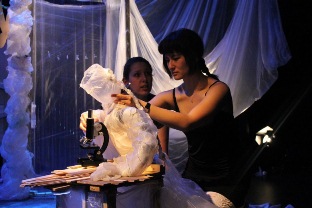
Megan Evans is a senior lecturer and programme director of the VUW Theatre Programme. Her research focuses on Asian and Intercultural performance. Her recent Fringe Festival production, Madam X and Mister Q, adapted a Chinese novel and integrated many Asian performance techniques. A particular research interest on this project was the attempt to capture the radical narrative instability of the source material for the stage.
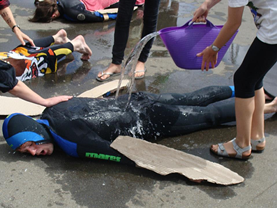
Binge Culture Collective was founded in 2008 by Rachel Baker, Joel Baxendale, Simon Haren, Claire O'Loughlin, Fiona McNamara and Ralph Upton, and has been described as "one of the country's most exciting, direct and original theatre companies" (NZ Herald). Their work interrogates the expectations and constitution of theatre artists, and their audi-ences, the notion of "community" as it applies in and outside performance, and the nature of mimetic representation.
Seminar - Sergei Eisenstein's Odessa Steps Montage
Date: 7 March 2013
Time: 12.00 pm
Venue: Room 103, 81 Fairlie Terrace
Dr Richard J Meyer
Seattle University
In his presentation, Dr Meyer will be discussing the infamous Odessa Steps Montage. One of the most influential sequences in film history, it was created by Sergei Eisenstein for his film Battleship Potemkin (1925). The montage, which was copied by numerous filmmakers, became an icon of film history and the sequence itself came to symbolise the 1905 Revolution. Eisenstein studied the editing and directing of DW Griffith and the work of German expressionist film directors. The talk will include examples of the sequence and its subsequent use in other films.
Richard J. Meyer is a visiting scholar at the New Zealand Film Archive and teaches film at Seattle University. He was the Distinguished Fellow of Film and Media Studies at Arizona State University in 2007 and the Distinguished Fulbright Professor at I’Universita’ del Piemonte Orientale Amedeo Avogadro in Italy for the spring 2005 trimester. Dr Meyer is Edmund F. and Virginia B. Ball Professor of Telecommunications Emeritus at Ball State University in Muncie, Indiana and Visiting Professor at the Center for Journalism and Media Studies at the University of Hong Kong.
Seminar - Hotel Pro Forma’s jesus_c_odd_size: a performance of encounters
Date: 15 November 2012
Time: 4.00 pm
Venue: Room 802, von Zedlitz Building, Kelburn Parade.
Kim Skjoldager-Nielsen
Stockholm University
In the year 2000 and again in 2002 the internationally acclaimed Danish performance theatre company Hotel Pro Forma did a performance-exhibition about Jesus and the biblical figures surrounding him. The first production was at a university for communication, culture and the arts in Malmö, southern Sweden, the second one in an old church, now museum for contemporary arts in Copenhagen, Denmark. The paper I will present will focus on the Copenhagen production and explore its form as a nonlinear wandering between scenic localities and sculptural acts spread out in the church building. My analysis will be based on video clips and my own experiences as a visitor. I will pay particular attention to the encounters with the performers, real people of our time framed as persons from the Bible. How may we perceive of the staging of the performance and its encounters in terms of a spiritual experience? I will draw on concepts such as experiential metaphysics, immanent transcendence, body and limps in the event, the liminal, proxemics, and the gaze, and I will discuss what kind of spirituality it might actualise. Finally, I will attempt to put it into perspective by contrasting it to my experience of Māori pōwhiri here at Victoria University using the anthropologist Anne Salmond’s “ritual of encounter” as a connecting concept.
Kim Skjoldager-Nielsen is a Danish PhD student and research fellow with the Institute for Musicology and Performance Studies, Stockholm University, Sweden, and currently a visiting scholar with the Theatre Programme at Victoria University of Wellington. His PhD project is about the staging of spiritual identity in Scandinavian and Māori ritual and theatre. Kim is also co-convener of the Performance and Religion working group under the auspices of the International Federation of Theatre Research.
Seminar - “Wordsworth and Poems on the Renaming of Places”
Date: 1 November 2012
Time: 12.00 pm
Venue: von Zedlitz Buidling, Room 802
Nikki Hessell
English Programme, Victoria University of Wellington
This paper is part of my new book project on translations of Romantic poems into the indigenous languages of the colonies. It examines a translation of Wordsworth’s “The Farmer of Tilsbury Vale” into the southern Indian dialect of Malayalam, using this translation and its focus on place names as a lens through which to reinvestigate Wordsworth’s poems of 1800. Wordsworth’s obsession with place names in the year after he and Dorothy moved to Dove Cottage has been well-documented; what has been less thoroughly explored is the connection between this obsession and colonial naming practices of the period.
Seminar - ‘I see our ne’re to be re-entered Paradise’: women’s elegy and the garden state in the English revolution
Date: 18 October 2012
Time: 12.00 pm
Venue: Room 802, von Zedlitz Building
This paper emerges out of a larger project on women’s use of poetry to imagine the political state before, during and after the English revolution of 1642-1660. It focuses on Hester Pulter and Lucy Hutchinson, two women on opposing sides of the political spectrum who use elegy to give voice to loss that is simultaneously personal and political.
The royalist Hester Pulter’s elegies on the death of her twenty-year-old daughter merge into several elegies that she composes on Charles I; and Lucy Hutchinson’s elegies on her husband, a parliamentarian colonel, mourn the loss of her spouse and of the republican cause. Both women rewrite in their elegies the tropes of country house poetry and of rural retirement—in particular, the garden poetry of Andrew Marvell in which, it has been argued, the girl in the garden is an emblem of all that is private, enclosed, retired, and safe. Pulter’s and Hutchinson’s girls, in contrast, are emblems of irruption, fear, and loss. Not only this, but their girls speak, becoming in Pulter’s case a nymph complaining and in Hutchinson’s a lamenting Eve who is forever excluded from her garden Paradise.
Sarah Ross is a senior lecturer at Massey University, looking forward to taking up a post at Victoria University of Wellington in January 2013. Her book on Women, Poetry, and Politics in Seventeenth-Century Britain is currently under consideration at Oxford University Press. She is the editor of Katherine Austen’s Book M (ACMRS, 2011) and the author of several articles on women, poetry, and manuscript culture in early modern Britain.
Seminar - Te Reo o Te Kāinga: The Tautoko FM Audience Research Project
Date: 11 October 2012
Time: 12.00 pm
Venue: Room 103, 81 Fairlie Terrace
Joost de Bruin and Te Atawhai Kumar
In her doctoral thesis on Māori language broadcasting, Jo Mane concludes that audience research can assist indigenous radio stations in gaining a better understanding of how the needs of their listeners can best be met. Using audience research as part of operations can play a role in facilitating the achievement of Māori aspirations for broadcasting. This presentation reports on an audience research project that was carried out in collaboration with the Māori radio station Tautoko FM. For this project, we consulted Māori language experts in the Hokianga region and conducted interviews with ten groups of people actively involved in learning the Māori language. The aim of these interviews was to assist Tautoko FM in the development of a new language learning show, provisionally titled ‘Te Reo o Te Kāinga’. In a context in which, according to a recent report by the Waitangi Tribunal, the Māori language is approaching a crisis point, Māori radio is a vital component of strategies to advance the survival and renewal of Māori language.
Joost de Bruin is a senior lecturer in Media Studies at Victoria University of Wellington. He teaches in the areas of popular culture, audience studies and television studies. His research interests include global television formats, media audiences and young people and media.
Te Atawhai Kumar (Ngāpuhi, Te Rarawa) has an MA degree in Māori Studies from Victoria University of Wellington. Her thesis, entitled ‘Kia Māia Ki Te Kānga o Tā Koutou Ahi’, focuses on ahi kā, the occupation and use of land in the Hokianga region.
Note: Tea and coffee will be available before the seminar.
Seminar - Taboos and Taxidermy: Adapting "Mother Savage" for the German Stage
Date: 4 October 2012
Time: 12.00 pm
Venue: Room 305, 77 Fairlie Terrace
Bronwyn Tweddle
Theatre Programme, Victoria University of Wellington
My bilingual production of Travelling Light Theatre Company’s (UK) work Mother Savage for the Studiobühne Essen in early 2012 developed into a dialogue with Brechtian theatre techniques. The production utilised a Brechtian aesthetic, and was an extended examination of Gestus, the socially-determined action, in that the 90 minute piece, which is based on a Guy de Maupassant short story, was told predominantly through silent gesture. Production choices, such as extended silence and drawn-out dramaturgical tempo, toyed with the boundaries of performer and audience comfort. Thematically, the piece also hit the hot buttons of both the company and audience members, which highlighted certain taboo areas in discussions of German history and identity. Mother Savage (Mutter Furie) also extend my ongoing research into methodologies of directing physical theatre, by exploring through practice the question of how to make another company’s physical theatre work your own.
Bronwyn Tweddle is a professional theatre director and dramaturg, and a Senior Lecturer in the Theatre Programme at Victoria, which she joined in 2001. She is the Vic co-ordinator of the Masters of Theatre Arts in Directing co-taught with Toi Whakaari: NZ Drama School. Recent professional directing credits include: Gary Henderson's Mo and Jess Kill Susie (2010) and Heiner Müller's Quartett (2006 - 2009), both of which toured throughout Europe, Frank Wedekind's Lulu (2005) and the premiere productions of two new Kiwi plays, Shoes (2008) and Serendipity (2009). Tweddle regularly writes for international journals, such as Performance Research and local journal Illusions. She has been production dramaturg for numerous professional productions, including the multi-award-winning Albert Speer (2004) and has created five bilingual play adaptations, including the subject of this paper and a bilingual [Hungarian/Romanian] version of Chekhov's The Cherry Orchard in Romania (2012). She was an Executive Board member of Playmarket: NZ’s Playwrights' Agency and Script Development Service from 2002 -2012 and has recently joined the Executive Board of DANZ (Dance Aotearoa New Zealand).
Seminar - While His Guitar Gently Weeps: Memory and the Biopic
Date: 27 September 2012
Time: 12.00 pm
Venue: Room 103, 81 Fairlie Terrace
Radha O’Meara
Media Studies Programme, Massey University
Carolyn Stevens
Japanese Studies Centre, Monash University, Melbourne
In George Harrison: Living in the Material World (2011), Scorsese creates a homage not only to the ‘great man’, but also to the memories of the 1960s, 1970s and 1980s as seen through the eyes of those who shaped the era, represented through a palimpsest of contemporary media, memoirs and interviews. Although the documentary offers the authenticity of ‘insider’ accounts, it might be seen more usefully as a bio-pic, which chronicles broader historical movements through an individual’s story, and a meta-memoir, which self-consciously encourages the audience to reflect on their own achievements, failures and legacies. This presentation will discuss the way in which the film can be seen as a work that refocuses the fans’ gaze from Harrison’s life back on themselves.
Radha O’Meara is a lecturer in Media Studies at Massey University. Her research primarily focuses on narrative in film and television.
Professor Carolyn Stevens is an anthropologist and Director of the Japanese Studies Centre at Monash University in Melbourne. Her research primarily focuses on Japanese popular culture.
Note: Tea and coffee will be available before the seminar.
Seminar - Travels in Hyper-Reality: Concepts of space in Orhan Pamuk's 'The New Life' and 'My Name is Red'
Date: 26 July 2012
Time: 12.00 pm
Venue: Room 802, von Zedlitz Building
John Wall
University of Balamand, Lebanon
Pamuk’s stated influences are Dostoevsky and Flaubert. To these great archeologists of subjectivity he has added the spatio-temporal warps of Borges, the self-sustaining narratives of the Arab and Iranian worlds and the metamorphoses of Sufi mysticism. In their eclecticism, Pamuk’s are exemplary postmodernist texts and are, accordingly, amenable to clever deconstructive explorations of intertextuality. However, it is possible to argue that there is something characteristically modernist in this writer, especially in his concern with space—that of the image, the text and , ultimately, the geopolitical. Like Joyce, Yeats and Eliot, as well as a number of modernist painters, Pamuk is interested in the kinds of spaces that are simultaneously real yet uninhabitable, due mainly to their virtuality. Pamuk’s work then is a performative reminder of the centrality of the virtual in the dynamic placing of the human body and its passions. It would seem, from his sources, that Pamuk sees this as the job of the writer.
Seminar - Tamil Migrant Workers, Screen Encounters and Film Studies
Date: 26 July 2012
Time: 12.00 pm
Venue: Room 103, 81 Fairlie Terrace
Vijay Devadas
Department of Media, Film and Communication, University of Otago
Drawing on field research in Singapore, this talk explores the ways in which cinema is implicated within a specific sociality, that is, how it intertwines and is entangled with the everyday lives of Tamil migrant workers from South India. The field research shored up a complex assemblage of encounters, attachments: focusing on three interfaces, the paper argues that screen encounters are part of a larger assemblage of things, objects, subjects, events and discourses that opens up the cinematic experience; opens up in the sense of not limiting the cinematic experience to the film text itself and to the sensorial, emotional, affective registers that are part of our filmic experience but also relating cinema to other modalities of life, technologies, forms of power, everyday practices, rhythms, intensities, spaces, bodies and temporalities. Further, and perhaps more importantly, the field research articulates the multiple, complex relationships between scholars and their subjects (films as texts, films in their historical and cultural contexts, and for this talk, films, people and their socialities) that demands that scholars, similarly, embrace multiplicity and look elsewhere (and write ‘otherwise’) so that we challenge the text-context, formalist-interpretive, film-theory binaries that preoccupy Film Studies. A number of scholars in the discipline are advancing the need to forge a new cartography for conceptualising the screen encounter, to which this work contributes: collectively emphasising the need to rethink the screen encounter beyond the screen itself, as an assemblage that endlessly mutates, spreads and connects with other intensities.
Vijay Devadas is Senior Lecturer in the Department of Media, Film & Communication, University of Otago. He recently co-edited Indigenous Media in Aotearoa (Uni. of Minnesota Press, 2013) and is now completing a co-authored book on key concepts for Media Studies with Palgrave. He is editor of the international journal borderlands and publishes on cinema, broadcast, and new media in relation to the war on terror, nationalism, democracy and sovereignty. He is currently co-editing a special issue of the New Zealand Journal of Media Studies themed Aotearoa 2011: Politics, Capital, Culture and co-authoring 'The Meaning of John Key'.
Note: Tea and coffee will be available before the seminar.
Seminar - Lodestone or Lead Weight?: How ‘Shakespeare’ Means at the 2012 New Zealand International Arts Festival
Date: 21 June 2012
Time: 12.00 pm
Venue: Room 203, 83 Fairlie Terrace
James McKinnon
Theatre Programme, Victoria University of Wellington
Shakespeare’s plays served many generations of Pākehā colonists as a cultural compass, orienting them to their symbolic and geographical “North”: Britain. But how will Shakespeare serve contemporary Aotearoans – Pākehā, Māori, and otherwise – as they navigate the 21st century? Shakespeare remains New Zealand’s most performed playwright, and the only one with festivals dedicated to producing his work. But Britain’s magnetic pull is not what it once was, and Shakespeare now polarizes in a different sense, as became apparent in recent debates over whether his role in the secondary school curriculum should be diminished or eliminated. Will New Zealanders come to view Shakespeare as a relic of the colonial past, or claim him as an integral part of their “own” culture? Will they continue to look overseas for examples of “authentic” Shakespeare, or chart their own course? And in defining their relationship to Shakespeare, how will they redefine themselves?
The intriguing constellation of local and international Shakespeare performances occasioned by the 2012 New Zealand International Arts Festival in Wellington offers a unique opportunity to explore how “Shakespeare” informs the ongoing negotiation of New Zealand identities. Audiences witnessed productions of Henry V and The Winter’s Tale by renowned English group Propeller; two responses to Hamlet, including Pan Pan’s widely-acclaimed The Rehearsal, Playing the Dane, and a solo show by local actor Michael Hurst called Frequently Asked Questions: To Be or Not to Be, Etc.; and the world premiere of the Maori Troilus and Cressida, which was also touted as New Zealand’s contribution to the 2012 London Cultural Olympiad. My paper will analyze these performances and their local reception – situated as carefully as possible in their cultural and material context – as evidence of how contemporary New Zealanders use Shakespeare to construct, reinforce, challenge, and destabilize competing notions of “New Zealand” identity.
James McKinnon lectures in Theatre at Victoria University of Wellington. His research focuses on how contemporary artists and audiences exploit and contest the authority of Shakespeare, Chekhov, and other canonical authors, through various sorts of adaptation and appropriation. More recently, he has explored the implications of adaptive dramaturgy in tertiary theatre classrooms. His presentation on “Mapping Chekhov in Canada” was featured in the early career scholars panel at the 2011 ADSA conference in Melbourne.
Seminar - Seeing Through the Eighties (Again): Politicising Nostalgia in Contemporary Popular Culture
Date: 31 May 2012
Time: 12.00 pm
Venue: Room 103, 81 Fairley Terrace
Dr Hannah Hamad
School of English and Media Studies, Massey University
Writing in 2001, Andrew Hoskins asserted that "never before has our relationship with the past – some judgment of it, celebration, commemoration or denial of it – been so much a part of public culture." This paper accordingly examines the proliferation of depictions of the 1980s in a spate of recent popular film and television (e.g. the BBC‘s 'Eighties Season' [2010]; time travel police drama Ashes to Ashes [2008-2010]; and Thatcher biopic The Iron Lady [2011]), arguing that this backwards-looking turn in mainstream moving image culture can be productively understood in relation to striking discursive parallels to be drawn between the present and the recent past of the represented period. Revisionist attempts to recuperate this much maligned decade in recent social, political and cultural history have sought to negotiate this discourse by eliciting nostalgic affect from audiences. I aim to interrogate what is at stake in this negotiation, and the political efficacy of articulating the present through the distorting prism of cultural nostalgia for the 1980s.
Hannah Hamad is a Lecturer in Media Studies at Massey University. She is the author of several articles on Hollywood stardom, and postfeminist media culture, and the forthcoming monograph Postfeminism and Paternity in Contemporary Popular Cinema: Framing Fatherhood (Routledge, 2013).
Seminar - Colonial Literature and the Native Author
Date: 30 May 2012
Time: 4.10 pm
Venue: Stout Research Centre, 12 Wai-te-ata Road, Kelburn
Marsden Scholar Seminar Series 2012
Jane Stafford
English Programme, School of English, Film, Theatre, and Media Studies
Victoria University of Wellington
This paper discusses the effect of the British literary empire on the native writer. Educated in the literary language of empire, but with an awareness of their indigenous or native persona, the native writer writes as both subject and author, the world these writers inhabited was not just the local – the kainga at Waiomatatini, provincial society in Ontario, Manicktollah Street, Calcutta. It was also literary, textual and above all global. In this context, is a new kind of writing produced, or does the native author conform to the models of the coloniser? And does the global literary collapse differences between such disparate subjects?
Seminar commences at 4:10pm, with tea and coffee available from 3:45pm onwards
Seminar - The 1926 General Strike, MacDiarmid, Scottish Modernism, and Communist Memory
Date: 24 May 2012
Time: 12.00 pm
Venue: von Zedlitz Buidling, Room 802
Dr Dougal McNeill
School of English, Film, Theatre, and Media Studies
Victoria University of Wellington
John McIlroy uses the term “the suppression of Communist memory” to discuss the work of forgetting that went on inside the Communist Party of Great Britain following its disastrous ‘class against class’ phase of 1928 – 1933. McIlroy’s phrase has a wider applicability. If, in the traditions of classical Marxism, we are used to thinking with Lenin’s idea of the mass workers’ party as the ‘memory of the class’, the experience of the Stalinised Communist parties involved a reversal of this project, as generations of militants were trained in habits of conscious, and politically-minded, forgetting. Literary tributes produced within the Communist movement negotiated these demands for forgetting in complex, occasionally tortured, sometimes revealing ways.
The ‘suppression of communist memory’ plays out in particular ways in cultural history, too. Scottish Modernism – most importantly MacDiarmid’s A Drunk Man Looks at the Thistle and Gibbon’s A Scots Quair – produced a series of texts intimately concerned with the lessons and significance of the Strike. And yet these works’ political aspect has been largely downplayed or ignored by later generations of criticism, guided as they are by either apolitical frames for receiving Modernism or cultural nationalist senses of Scottish writing.
This paper attempts order to carry out a work of historical recovery. Dropping Cold War-era worries over allegiance, we can explore MacDiarmid’s complexities instead. Attention to these details reverses standard accounts of Scottish Modernism. The specific, and detailed, interventions both MacDiarmid and Gibbon make into their contemporary political field are key to understanding their aesthetic ambition.
Seminar - Multiculturalism and a Nation’s Grand Narrative
Date: 22 May 2012
Time: 5.10 pm
Venue: Hunter Lecture Theatre 119
Professor Vijay Mishra
Murdoch University
In a short monograph (Fear of Small Numbers, 2006), Arjun Appadurai referred to multiculturalism as a majoritarian theory which addressed a principle of ‘containment’ made necessary by the ‘fear of small numbers’. The point Appadurai makes is that ethnic groups that live within the borders of national polities give rise to a sense of uncertainty, which can ‘drive projects of ethnic cleansing that are both vivisectionist and verificationist in their procedures.’ The first echoes the ‘What do we do with them now?’ project that governed Nazi thinking; the second is a starker form of the redistribution dilemma faced by multicultural welfare states. That these ‘projects’ remain in the background requires a socially concerned and critically self-aware reader to be conscious of a fundamental fact about national sovereignty: ‘No modern nation, however benign its political system and however eloquent its public voices may be about the virtues of tolerance, multiculturalism, and inclusion, is free of the idea that its national sovereignty is built on some sort of ethnic genius’ (Appadurai, 10). This paper looks at the grand narrative of the nation which is the product of its ‘ethnic genius’, its place in western modernity, its links to the idea of a ‘national fantasy’, its continued force as the ground for liberal values, and its dialogic relationship with a multicultural definition of the nation as a multiplicity of narratives in the making. The overall argument and supporting documentation draws upon my recently published What Was Multiculturalism (Melbourne University Press, 2012).
Vijay Mishra, a VUW undergraduate in the sixties, is Professor of English Literature and Australian Research Council Professorial Fellow at Murdoch University. His most recent works include ‘Understanding Bollywood’ (The Wiley-Blackwell Handbook of Global Communication and Media Ethics), ‘The Gothic Sublime’ (The New Blackwell Companion to the Gothic) and What Was Multiculturalism? (Melbourne University Press).
Seminar - Glamour & Grind: the working lives of film crew
Date: 17 May 2012
Time: 12.00 pm
Venue: Room 103, 81 Fairlie Terrace
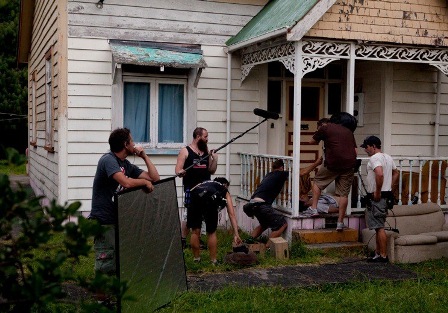
Ass. Prof. Deborah Jones
Victoria Management School, Victoria University of Wellington
This seminar will introduce Glamour & Grind, a Marsden-funded study which looks at working lives in the film industry. In the last few years there has been an explosion of critical research on what is called ‘creative labour’. Critical scholars have highlighted the precariousness, high-intensity demands and inequalities that characterise many traditional and emergent forms of creative work, along with its joys. It is argued that such work is characterised by ‘complicated freedoms’, ‘bulimic careers’ and by oscillations along ‘a pleasure-pain axis’. I will review key arguments in this literature, especially in relation to film work, and will discuss our study in this context. Glamour & Grind is an exploratory qualitative study which examines the experience of film work through life-history interviews. We have used the terms ‘glamour’ and ‘grind’ as a heuristic framework for an empirical investigation of lived tensions in the careers of New Zealand film crew workers as they unfold over time. In the seminar I will present some stories of their experience and discuss some of the theoretical issues we are exploring in analysing our data.
Deborah Jones is an Associate Professor in the School of Management at Victoria. She has degrees in English Literature and Language and Management Studies. Her research draws on critical theory in relation to issues of work, organisation and identity, especially gender, ethnic and national. She has studied the film industry in New Zealand from the point of view of working lives, and also of cultural policy and national identity. She was Principal Investigator in a project on the working lives of film crew, Glamour and Grind. Other current film-related projects include an analysis of The New Zealand Film Commission submission and report, the ‘Hobbit wars’, and Peter Jackson as a national icon.
Seminar - Adolescent Realism As A Literary Slipstream: Discovering You're A Werewolf
Date: 10 May 2012
Time: 12.00 pm
Venue: von Zedlitz Building, room 802
Caoilinn Hughes, doctoral candidate
English Programme, Victoria University of Wellington
Adolescent Fiction, which emerged in the 1970s as a sub-category of Young Adult Fiction, presents teenage protagonists predominantly contending with adolescent issues of self-discovery, rites of passage, sexuality, agency, socialization and separation anxiety. As late twentieth and early twenty-first century Adolescent Fiction has come to be strongly associated with romantic fantasy genres (vampires) and supernaturalism (wizards), this paper argues that these fantastical or non-realist genres have become the ‘mainstream’ in Adolescent Fiction; whereas, realist Adolescent Fiction has become a slipstream genre itself, where the processes of self-discovery and social estrangement the protagonists endure demonstrate the strangeness and surreal-ness of adolescent experience. This paper argues that realism in adolescent fiction is a slipstream genre itself; in its irreverence, its heightened metaphysical awareness, its embodiment of the uncomfortable, transitionary space of adolescence, and in its estrangement of social systems. The adolescent realism of contemporary New Zealand writers Paula Boock and Bernard Beckett demonstrates that there can be no more appropriate a parody of the mainstream werewolf novel than the aggressive, hair-sprouting everyday teenagers who are all too aware of moon. The paper will look at Bernard Beckett’s No Alarms (2002) and Paul Boock’s Out Walked Mel (2000) as examples of adolescent novels that use realism as a slipstream genre to present and problematize the strange, subversive adolescent individual struggling with societal assimilation; within the family, the educational system, and the sexual, political and legal expectations made of adolescents. The analysis of these realist adolescent novels will demonstrate the cognitive dissonance at the heart of the adolescent experience and of the adolescent slipstream genre.
Caoilinn Hughes has a First Class Honours Degree in English from The Queen's University of Belfast and a Masters Degree (with Distinction) in Twentieth Century Irish Theatre & Culture, aslo from Queens. Her PhD in English at Victoria consists of writing a Young Adult Sci-fi novel about the inventor of time travel, and a thesis on the use of Realism in New Zealand YA Literature.
Seminar - Scandalous Images: Still Photography in Post-Boom Italian Film
Date: 3 May 2012
Time: 1.00 pm
Venue: Room 103, 81 Fairlie Terrace
Dr Sally Hill
Italian Programme, Victoria University of Wellington
Commercial and popular photographic images helped create, document and market some of the most infamous scandals in Italy during and after the economic boom of the late 1950s and early 1960s, reshaping public and private notions of what could and should be seen and shown. Yet most critics have largely neglected the influence of such images on Italian cinema and literature. In this work in progress, I argue that still photography played a significant role in shaping how some of Italy’s most important writers and filmmakers of the period conceptualized the country's transformation into a capitalist “society of spectacle” and the transition from a neorealist to a postmodernist aesthetic. Focussing here on Federico Fellini and Michelangelo Antonioni, I analyse their use of photographers and still photographs in two of their best-known films, La dolce vita (1960) and Blow-Up (1966). Despite the many differences between the two, I argue that both demonstrate the influence of what I will call a “paparazzo gaze”.
Sally Hill is a Senior Lecturer in the Italian Programme at Victoria University of Wellington. Her research interests and publications focus on twentieth-century Italian literature, cinema and visual culture, and the history and theory of interactions between the visual arts and literature, with a particular interest in photography. She also works on migrant writing, Italian women writers, and representations of disability. She is completing revisions to a book manuscript on the influence of photography in post-war Italian literature and an edited volume (with Giuliana Minghelli) entitled “Stillness in Motion: Italy, Photography and the Meanings of Modernity.”
Seminar - It’s About Time: Three Case Studies in Sustainable Scenography in the Pacific
Date: 26 April 2012
Time: 12.00 pm
Venue: Room 305, 77 Fairley Terrace
David O’Donnell and James Davenport
Lecturers, Theatre Programme, School of English, Film, Theatre, and Media Studies
Victoria University of Wellington
The urgent need to consider more sustainable practices in theatre production is being recognised by organisations in the USA such as Electric Lodge Performing Arts Centre, the Green Theater Initiative and the Broadway Green Alliance. However there are considerable costs in setting up such ventures, and in the smaller theatre economies of island nations on the Pacific rim, many wasteful practices continue to dominate in theatre production. Yet issues of sustainability in the face of climate change are particularly pertinent to Pacific nations, with atolls such as Tuvalu gradually disappearing due to rising ocean levels.
In this presentation we explore models for more sustainable theatre production, giving examples from our own experiences as theatre practitioners working in different locations around the Pacific. We examine three contrasting performance projects that we have worked on in recent years: a film, The Land has Eyes, (Rotuma, 2004, written and directed by Vilsoni Hereniko, assistant director James Davenport); a play, Heat (New Zealand, 2008, written by Lynda Chanwai-Earle, director David O’Donnell); and a conference TEDx (Honolulu, 2011, designer James Davenport). Not only does each project utilise innovative approaches to sustainable scenography, the scenographic materials used actively reflect and engage with the dramaturgy and themes of each work.
In examining these projects, we make extensive use of visual documentation (photographs, maps and plans). In each example, the sustainability of the scenography reflects and enhances the themes of the diverse performance texts, creating performative critiques of unsustainable methods of production. By close analysis of the interaction between text and technologies in the Pacific, we will present methodologies for sustainable theatre practice of the future.
Seminar - New Zealand-Domiciled Screen Production: Institution, Industry, and Cultural Identity
Date: 5 April 2012
Time: 12.00 pm
Venue: Room 103, 81 Fairley Terrace
Dr Trisha Dunleavy
Media Studies Programme
This seminar presents some key findings from a newly released book which examines the five decades of film and TV production in New Zealand, taking a particular interest in the ‘high-end’ of the production spectrum through its case studies of feature films and long-form TV dramas. Whilst this book acknowledges the influences of internationalism and of major foreign-funded projects upon the development of this country’s film and television industries, its central interest is ‘New Zealand-domiciled’ screen productions, a term through which we distinguish those whose conception, narratives, financing, development, and completion are all centred on New Zealand culture, creative personnel, and institutions. This book has extended the scope of existing literature on New Zealand screen production in two ways. First, it examines New Zealand’s film and television industries side by side, a revealing juxtaposition because of the differences and commonalities between them. Second, this book emphasises the facilitation of film and TV production, aiming to generate better understandings of the institutional and commissioning considerations, along with the industrial and creative processes, from which New Zealand’s feature films and TV dramas come.
Dr Trisha Dunleavy is Senior Lecturer in Media Studies at Victoria University of Wellington. This book, which she authored in collaboration with Dr Hester Joyce, is entitled New Zealand Film and Television: Institution, Industry, and Cultural Change and was published by Intellect Books (Bristol) in association with Chicago University Press. This research project and publication was facilitated by investment from Victoria University of Wellington (The Research Trust) and La Trobe University Melbourne.
Seminar - “Keeping it real”: Discourses of Authentic Identity from Hollywood to High School
Date: 22 March 2012
Time: 12.00 pm
Venue: Room 103, 81 Fairlie Terrace
Felicity Perry
PhD candidate, Department of Film, Television and Media Studies, University of Auckland
Authenticity is a key cultural rubric in the contemporary West. Texts aimed at young people frequently direct viewers to “keep it real”, to “be themselves”, and to avoid “putting up a front”. This seminar considers how students at an urban high school in Aotearoa New Zealand conceive of being “real”, exploring what they deem to be authentic identity and its expressions.
This seminar examines how the students conceive of authentic identity as both stable and fluid, as both anchored in bodily experience and as produced at the moment of recognition by others. It asks, how do the students reconcile the work they undertake to embody a subject position with their understanding of “true” identity as “effortless”? How do they resolve the tension produced through their positioning of identity as inseparable from the gaze of others and their notion that to live for others is inauthentic? That is, how do the students utilize both constructionist ‘surface’ and essentialist ‘depth’ discourses of identity?
The students use the figures of the ‘tryhard’ and the ‘clone’ to demonstrate their own authenticity. How might the students’ conceptualization of authenticity and use of these figures aid the positioning of authentic identity as performative, produced through its enactment?
Felicity Perry has recently submitted for examination her PhD thesis, conducted through the Department of Film, Television and Media Studies at the University of Auckland. Her thesis examines the way students at an urban non-uniformed school in Aotearoa/New Zealand use dress – and dress-related discourses – to both construct and express their identities.
Seminar - Marginalia: The Littoral Figure in Poetry, Chiefly Victorian
Date: 22 March 2012
Time: 12.00 pm
Venue: von Zedlitz Building, room 802
Professor Herbert Tucker
University of Virginia
The pensive solitariness with which Victorian poetry went to the seashore - in distinct contrast to the holiday jollity that Victorian popular culture discovered there - kept faith with a very long tradition of maritime poetics. In their alienated marginality, seaside poems both expressed an emergent understanding of the human condition and exercised verse's privileged means of making such an understanding felt, as a matter of sensed experience. Brisk survey of the littoral tradition, numerous close illustrations from a dozen poets.
Herbert Tucker is John C. Coleman Professor of Nineteenth-Century British Literature at the University of Virginia. His publications include Epic: Britain’s Heroic Muse (Oxford 2008), Tennyson and the Doom of Romanticism (Harvard, 1988), as well as many other collections and chapters on British literature.
Seminar - Rainbows and Wonder: Richard Dawkins’s Misreading of Keats
Date: 15 March 2012
Time: 1.00 pm
Venue: von Zedlitz Building, Room 802 (vZ 802)
Heidi Thomson
English Programme
Much good literature celebrates the awareness of the limitless experience of wonder by equating it with a state of ‘Negative Capability’ which Keats attributes to Shakespeare’s character in particular: ‘when a man is capable of being in uncertainties, Mysteries, doubts, without any irritable reaching after fact and reason.’ This applies to both writing and reading. Not surprisingly, Keats wrote a sonnet about re-reading King Lear which combines a phoenix rebirth through fire with a humble attempt to try and figure something out again: ‘for, once again, the fierce dispute / Betwixt damnation and impassion’d clay /Must I burn through; once more humbly assay / The bitter-sweet of this Shaksperean fruit’ (5-8). Richard Dawkins underestimates the labour and pleasure of reading. C. P. Snow’s ill-fated use of the term ‘Two Cultures’, despite his qualified discussion of it in the actual lecture, has set up a tradition of mutual exclusivity between science and literature, and Dawkins’s references to poetry confirm the split once more. This lecture does not question Dawkins’s enthusiasm for science or poetry, but it demonstrates that Dawkins’s understanding of poetry in Unweaving the Rainbow: Science, Delusion and the Appetite for Wonder is limited and often entirely mistaken. Reading deserves the attention and care of an ideal scientific experiment: encompassing, with attention for detail, tentatively conclusive, and mindful of a coherence of sorts.
Seminar - "Creative Commons and Open Scholarship"
Date: 8 March 2012
Time: 12.00 pm
Venue: Room 103, 81 Fairlie Terrace
Jane Hornibrook
Creative Commons Aotearoa, the Royal Society of New Zealand
'Open access' involves a wide range of copyright practices, from the most restrictive use statements to placing work in the public domain. The debate is no longer just about the ability to freely 'access' materials, but about the ability to share or adapt them. Creative Commons is an infrastructure that scholars and publishers can use to observe open access in respect to sharing or allowing reuse.
This session is an opportunity to learn about Creative Commons, find out how licences operate, and where to source the best reusable content. You can also hear about current developments in the world of open access across a range of sectors and discuss their implications for New Zealanders.
Jane Hornibrook is the Public Lead of Creative Commons Aotearoa, at the Royal Society of New Zealand. Her background is in literature, publishing and disruptive technologies.
Symposiums
Symposium: Periphery and Place: The Geographies of Screen Production in Australia and New Zealand
Date: 2 September 2013
Time: 9.30 am
Venue: Hunter Council Chamber, Hunter Building, Kelburn Campus
Keynote Speaker: Professor Tom O’Regan (University of Queensland)
The Periphery and Place symposium will provide a platform for researchers and industry professionals to debate the relationship between place and screen production in Australia and New Zealand. More specifically the title of the symposium invites participants to address the following question: are we still engaging with a centre-periphery model of screen production or are we moving towards an acentric, global dispersal of film and television making? The centre-periphery model that has informed the colonial histories of both Australia and New Zealand is gradually giving way to the contemporary decentralisation of media production and the corollary internationalisation of funding and distribution. Similarly, the emergence of indigenous screen content characterised by a different history of engagement with place is also redefining the flows of cultural production, funding and distribution. The day-long symposium will address these issues and invite debate on how we can move forward our understanding of periphery and place in screen industries.
If you wish to attend please notify Alfio Leotta (Alfio.Leotta@vuw.ac.nz). Attendance is free, but registration is requested.
The keynote speaker: Professor Tom O’Regan (University of Queensland)
Professor O’Regan has been a key figure in the development of cultural and media studies in Australia. He was elected to the Australian Academy of the Humanities in 2002 and was, from 2002–2003, Australia’s UNESCO Professor of Communication. His most notable works include "Australian National Cinema" (1996); "The Film Studio: Film Production in the Global Economy" (2005) with B. Goldsmith and "Local Hollywood: Global Film Production and the Gold Coast" (2010) with B. Goldsmith and S. Ward.
The programme (![]() PDF, 68 KB) of this one-day-symposium is subject to minor changes.
PDF, 68 KB) of this one-day-symposium is subject to minor changes.
For further information, please contact the symposium committee
Alfio Leotta, Miriam Ross, and Minette Hillyer
Gothic Symposium
Date: 15 June 2013
Time: 10.00 am
Venue: Room 802, von Zedlitz Building, Kelburn Campus
Speakers include Anna Jackson, Tim Jones, Eden Lackner, Jenny Lawn, Katie Magana and Erin Mercer.
All welcome to attend.
All welcome to present papers too – whether you have a twenty minute paper to present or a ten minute introduction to some work in progress. Please email Anna Jackson if you would like to attend and if you would like to give a paper of any description.
Remembering Margaret Mahy: A Saturday Symposium
Date: 22 September 2012
Time: 9.00 am
Mahy’s biographer Tessa Duder, film-maker Dave Gibson, and writer Elizabeth Knox join a dozen writers and academics from around the country in a day-long series of talks and discussions covering everything from Mahy's work in the "Ready to Read" primers through to her sophisticated novels for Young Adults.
When: Saturday 22 September 2012, 9am
Where: Rutherford House Lecture Theatre 2, Pipitea Campus, Bunny Street, Wellington
Registration Cost: $30.00
Registration includes morning and afternoon tea. BYO lunch or try a nearby café.
NOTE: Your registration is not valid until you have successfully completed the entire process and received a printable confirmation page and an email confirmation.
Seminar - The Orphan in the Text
Date: 13 February 2012
Time: 9.00 am
Venue: von Zedlitz Room 802
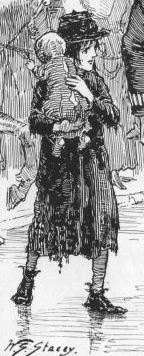
A one day symposium at Victoria University
Maria Holmgren Troy will speak about “The Orphan American Dream”:
Orphans in American Literary History and Criticism
Proposals for 20 minute papers welcome
Send to anna.jackson@vuw.ac.nz
Theatre Productions
Play: Noah's Flood
Date: 26 July 2015
Time: 12.30 pm
Venue: Old Government Buildings, Annex, Lecture Theatre One
The so-called "mystery" plays were a quintessentially medieval phenomenon. They retell Biblical stories in human, even farcical, terms. But they embrace the transcendental as well. We (members and friends of the English Programme at Victoria) shall be performing Noah's Flood as part of Victoria's contribution to Wellington's 150th Anniversary celebrations. The performance will last for only 30 minutes, but in these minutes you will have a unique theatrical experience. Families are welcome. Children will enjoy the play.
Admission Free.
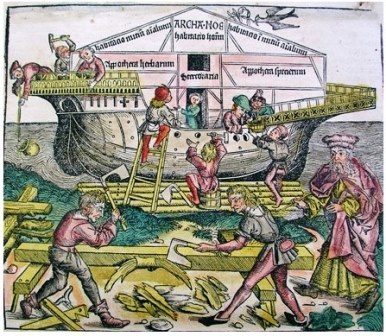
Play: Page Turners
Date: 25–26 July 2015
Time: 11.00 am
Venue: National Library of New Zealand Te Puna Mātauranga o Aotearoa, Corner of Molesworth and Aitken Streets, Thorndon
Meet Te Rauparaha, Robin Hyde, Nancy Wake, James K. Baxter, and Carmen Rupe as they regale you with tales from their distinctly Wellington lives.
This year marks 150 years since Wellington became the capital city of New Zealand. As part of the 150th birthday celebrations, the National Library is presenting Page Turners, a free theatrical event in which five famous Wellingtonians from the past present their stories before the backdrop of an enormous, operating pop-up book.
Page Turners will be performed (for free) three times daily during the National Library's Open House weekend, 25-26 July, at 11am, 1pm, and 3pm.
Directed by Jane Yonge, THEA 204 Admin Tutor - Looking forward to seeing you there!
Production - The Two Noble Kinsmen by William Shakespeare and John Fletcher
Date: 7–11 October 2014
Time: 7.00 pm
Venue: Studio 77, 77 Fairlie Terrace, Victoria University of Wellington
Bookings: theatre@vuw.ac.nz
Cost: $15 waged/$8 unwaged
A love to fight for. A love to drive you mad. A daughter lost in the woods. An imperfect win.
Victoria University of Wellington’s THEA 301 tackle Jacobean tragicomedy in the Wellington premiere of Shakespeare and Fletcher’s rarely performed The Two Noble Kinsmen.
This little known Shakespeare play is based on Chaucer’s The Knight’s Tale. Two cousins, Palamon and Arcite, fall in love at first sight with the fair lady Emilia. The pair’s friendship is tested when it is decided they must fight to the death for the love of Emilia. Meanwhile the daughter of a Jailer falls in love with one of the cousins, Palamon, but loses herself in the woods in the fight to allure her man. In the end one man gets his bride, but is there really a winner?
The director, Lori Leigh, asserts that “The Two Noble Kinsmen is a gorgeous play. Received ‘with great applause’ as it states on the title page of the quarto, the play is Shakespeare and Fletcher’s coming-of-age postmodern fairy tale of friendship, rivalry, and heart-breaking love in its various forms.”
The Two Noble Kinsmen will be the graduating production for many of the 21 cast members at Victoria University. This group of 300-level theatre students have spent the trimester studying Shakespearean staging conventions, verse speaking, and dramaturgy. “The research and now the rehearsals for this show have been long and hard,” says company member Charlotte Pleasants, who plays First Queen. ”But, because we’ve put in (and are still putting in) that effort till 10 o’clock at night, we all have confidence that it will result in a truly fantastic piece of theatre.”
This production of The Two Noble Kinsmen will be part of Shakespeare’s Globe Centre New Zealand’s 2014 Shakespeare Lives, a celebration of the 450th anniversary of Shakespeare’s birth including performances of the entire canon filmed for YouTube.
Come join us for an evening filled with knights, sword-fights, Amazons, and our own special spin on Morris Dancing.
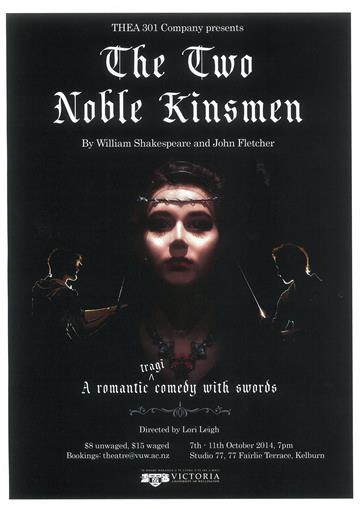
Wild Man
Date: 20–24 May 2014
Time: 7.00 pm
Venue: Studio 77, 77 Fairlie Terrace
Wild Man
Deforestation and natural disasters surround the mystery of the Wild Man.
Third year Theatre students at Victoria University of Wellington are staging a performance that provokes a gripping realisation that the world only has a limited amount of resources. With current trends, future generations will be left to deal with the environmental issues that have been caused by mass deforestation. The performance draws attention to the cultural and environmetnal issues that are caused by deforestation.
“The environment in China is already a catastrophe as they face enormous environmental challenges”
Wild Man, Gao Xingjian
This exciting production is the seventh time director, Course Co-ordinator and Asian Theatre specialist, Dr Megan Evans has brought to life a piece of Asian Theatre. Evans states that “Gao’s challenging script questions human beings’ relationships with each other, and even more compellingly, their relationships with the environment”.
What: Wild Man, by Gao Xingjian, translated and adapted by Bruno Roubicek
When: Tuesday 20 to Saturday 24 May 2014, 7pm
Where: Studio 77, Fairlie Tce, Kelburn
Bookings: theatre@vuw.ac.nz or 04 463 5359
Tickets: $15 waged/ $8 unwaged, pay on the door by cash only
Production - PocaHAUNTus: shapeshifting history into Herstory
Date: 12–15 February 2014
Time: 7.00 pm
Dates: 12-14 February 2014 at 7.00pm
15 February 2014 at 2.00pm and 7.00pm
Venue: Studio 77, 77 Fairlie Terrace, Victoria University of Wellington
Bookings: www.fringe.co.nz
Cost: $18/$14/$12
Victoria University of Wellington, Theatrecomrades and Fringe Festival present
"PocaHAUNTus: shapeshifting history into Herstory"
Written and Performed by Melissa Billington
Directed by Sally Richards
How does Pocahontas Haunt Us? With her innocence sullied. With her people, her place, her paradigm plagued, pursued and nearly eradicated by the insidious virus of separatism, competition, deceit and disease.
Melissa Billington, 13th lineal descendant of Pocahontas, arrives on our shores with stories of madness, murder, mayhem, marriage and mothers.
PocaHAUNTus explores how truth is relative by taking on the truths, or stories, of what we often see as opposites–female and male, past and future, indigenous and "civilized", natural and commercial/industrial, clothed and naked, sane and crazy. The myriad voices of the people in the stories are swiftly 'moved between' by one actor, thus making an art-form of the schizophrenic mindset that hears voices and yet is imprisoned (instead of liberated) by them. With an aim to bridge these seeming opposites, to take the poison of ancestral patterns and transmute it into potion for the present and future generations, Melissa plays with the premise that performance is performative in the western world, yet transformative in most indigenous cultures.
NB. There will be a question and answer session with the audience and the company after performances on Friday and Saturday nights.
For more information, images or inquires please contact:
Sally Richards 027 555 9699
"I am at home in the blood of my ancestors—the murderers and the drunkards, the mothers and the victims, the victorious and the thwarted, the mad and the rich, the poor and the lost, the tribal and the anarchist.
I am at home in the All, in the None, in the space between." – Melissa Billington, Writer and Performer
"This work takes a long journey, across seas, rivers and mountains. It is a journey Melissa embarked on generations ago, I joined ship as it passed this shore with questions in my luggage, academic games to play on our voyage." - Sally Richards, Director, PhD student
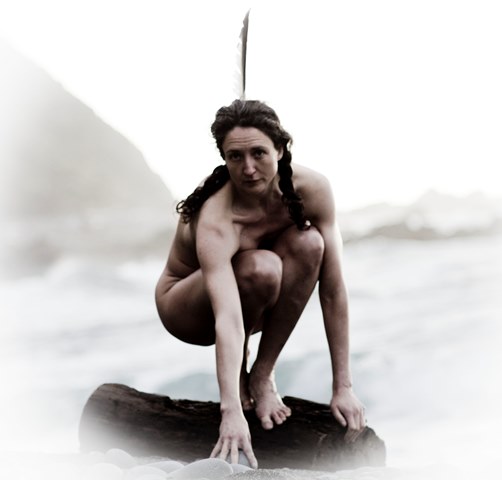
Creative Team
Melissa Billington – writer, solo actor/performer, costume designer
BA Theatre Arts, Cornell University
Film, commercial and theatre actor 20 years
Work for theatre includes Medea Redux, Winter, The Vagina Monologues, and Damage
Work for film includes 30 Days of Night, Avatar and The Hobbit
Sally Richards – director, dramaturge, producer, designer
Master of Theatre Arts: Directing at Toi Whakaari: NZ Drama School and Victoria University of Wellington
Bachelor of Theatre with Honours from James Cook University of North Queensland
Currently PhD candidate at Victoria University of Wellington, School of English, Film, Theatre, and Media Studies. PhD examines the directing of solo performance.
Theatre director, producer, teacher and actor for over 20 years in New Zealand, Ireland and Australia
2007 Fringe Awards for Best Solo for Porcelain Grin
Theatre directing credits include Medea Redux, Actor, Dog, Brimstone and Treacle, Falling in Like, The Vagina Monologues, Dolores, Winter and Poster of the Cosmos
Stephanie Sinclaire – dramaturge
30 years in theatre and film as Associate Artistic Director and later Artistic and Managing Director of the Kings Head Theatre, London. Founder of Dragonfly Films and Dragonlady Theatre and Film. Producer/ Writer/ Director for theatre and film.
David Allen – AV specialist
David Allen has been in the acting scene for 17yrs as a professional, performing on TV, Film, independent theater, long form improv, and sketch comedy. His career has spanned from New York, Los Angeles, London, San Francisco, and now New Zealand(being a resident actor of the former 6 O'clock swill in Wellington). He studied in Los Angeles at San Francisco State University which led him to an acting scholarship at Academy of Drama in London. He has written, directed and produced two short films, has a Zombie sock puppet web series currently in production and a feature film collaboration in the works starting preproduction post Fringe Fest.
Production - Mystery Play
Date: 15–19 October 2013
Time: 7.30 pm
Venue: Studio 77, Fairlie Tce, Kelburn
The Cycle Players present
Mystery Play
A live experiment in humanising the holy.
This year the students of Victoria University’s Theatre Programme ‘Company’ course have formed the theatre company The Cycle Players, and are devising live performance using medieval liturgical dramas as their inspiration, and molding them into something new.
Come along to partake in this experiment in creating community through humanising the holy and playing with the sacred.
What: Mystery Play, devised by The Cycle Players of THEA 301
When: Tuesday 15 to Saturday 19 October 2013, 7.30pm
Where: Studio 77, Fairlie Tce, Kelburn
Bookings: theatre@vuw.ac.nz or 04 463 5359
Tickets: $15 waged/ $8 unwaged, pay on the door by cash only
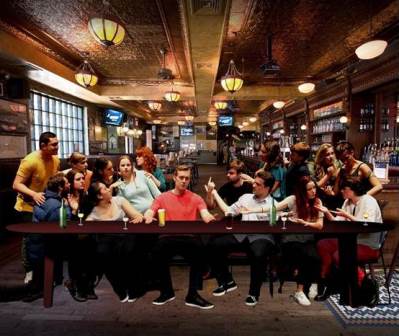
Production - "Growing Pains"
Date: 25–28 September 2013
Time: 7.00 pm
Twelve short plays and extracts directed by students.
The twelve students of the Theatre Programme's THEA 304 Directing course present what they have learnt of theatre directing in a series of 10-minute plays and extracts, performed in the original Drama House theatre studio, 93 Kelburn Parade. Under the tutelage of Senior Lecturer Bronwyn Tweddle and mentorship of local directors and Theatre graduates Uther Dean and Robin Kerr, the twelve new directors tackle a wide variety of plays, from Shakespeare to Chinese opera to modern musicals. Each evening will showcase six of the twelve pieces, so you must reserve seats for two nights to see all twelve!
When
Season One: Wednesday 25 and Friday 27 September 2013, 7pm
Season Two: Thursday 26 and Saturday 28 September 2013, 7pm
Where
Meet at Studio 77 Foyer, 77 Fairlie Terrace
Performed at Drama House, 93 Kelburn Parade
Reservations
theatre@vuw.ac.nz or (04) 463 5359
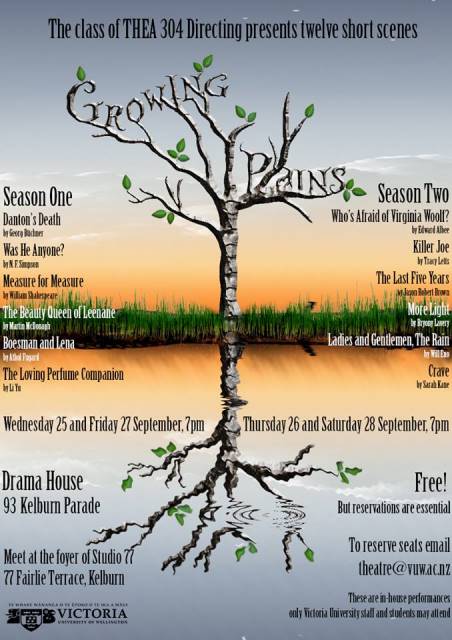
Production - Merely to be Normal
Date: 17–27 July 2013
Time: 7.00 pm
Venue: Studio 77, 77 Fairlie Terrace, Kelburn
Merely to be Normal is the culmination of an artistic journey of four years of Theatre study for the six young theatre practitioners, and they are eager to open a conversation about the work with the audience. Audience will be invited to chat with the directors before and after the show each evening, and they are also opening up their rehearsal room through an online blog.
Taking its name from an Albert Camus quote, each Merely to be Normal evening will remind the audience that theatre is a place to explore what it means to be a human, and will take them on a journey through different theatrical forms. From absurdism to a violent satire, British in-yer-face theatre to Kiwi comedy, Merely to be Normal is home to an eclectic range of plays.
Merely To Be Normal (THEA 406 Advanced Directing productions)
Season One: Wednesday 17 - Saturday 20 July @ 7.00pm
(Komachi, The Lost Babylon and Existence)
Season Two: Wednesday 24 - Saturday 27 July @ 7.00pm
(Ohio Impromptu + Rough for Theatre 1, Fold and The Zoo Story)
Studio 77, 77 Fairlie Terrace, Kelburn
Tickets: $15 full price, $8 concession. One ticket is for the three plays on that night. Collect your tickets at the door, cash only.
Bookings: theatre@vuw.ac.nz or 04 463 5359
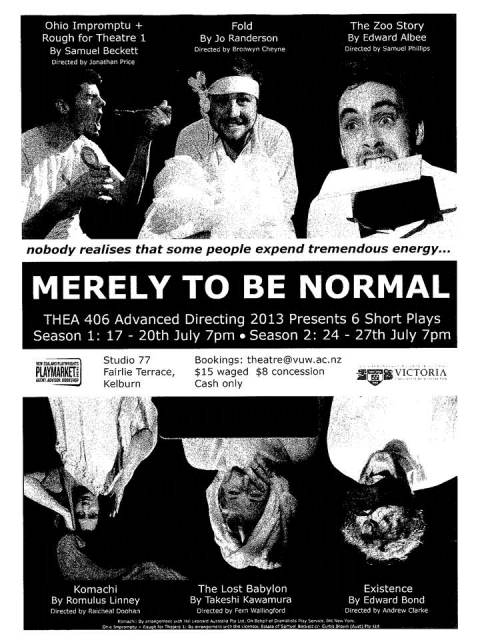
Production - The Kick
Date: 28 May – 1 June 2013
Time: 7.30 pm
Venue: Studio 77, 77 Fairlie Terrace, Kelburn
Join the Theatre Programme in the English-language premiere of a contemporary German play based on a true murder case. For the past ten weeks the students of the THEA 302 ‘Conventions of Drama and Theatre’ course and the THEA 308 ‘Scenography: The Scenographic Imagination’ course have been rehearsing, designing and discovering the disturbing content of The Kick, translated and directed by German theatre expert Bronwyn Tweddle.
The real-life events took place in Potzlow, a small village near Berlin, where residents suffer from widespread unemployment, alcoholism, broken family relationships and a disintegrating society in the wake of German reunification. The shadow of the former East German regime silences any who wish to speak out, causing violence and mistreatment to go unreported.
Playwrights Andres Veiel and Gesine Schmidt spent several months researching and interviewing in Potzlow. Every word in the play is direct testimony from the perpetrators, witnesses and media, creating an authority and authenticity in the work similar to news broadcasts. Through performance Victoria theatre students are themselves exploring the causes of extreme violence and the silence surrounding it, through the verbatim theatre form.
Under the mentorship of theatre designer and lecturer James Davenport, the Scenography students creating all the production design are on a similar quest for truth.
The Kick is an honest and heart-wrenching story, which presents the raw facts about violence in which a whole community is complicit. Join us at Studio 77 to discover what happens when nobody speaks out.
Bookings: Email theatre@vuw.ac.nz
Ticket prices: $15 waged / $8 unwaged. Pay by cash only at the door.
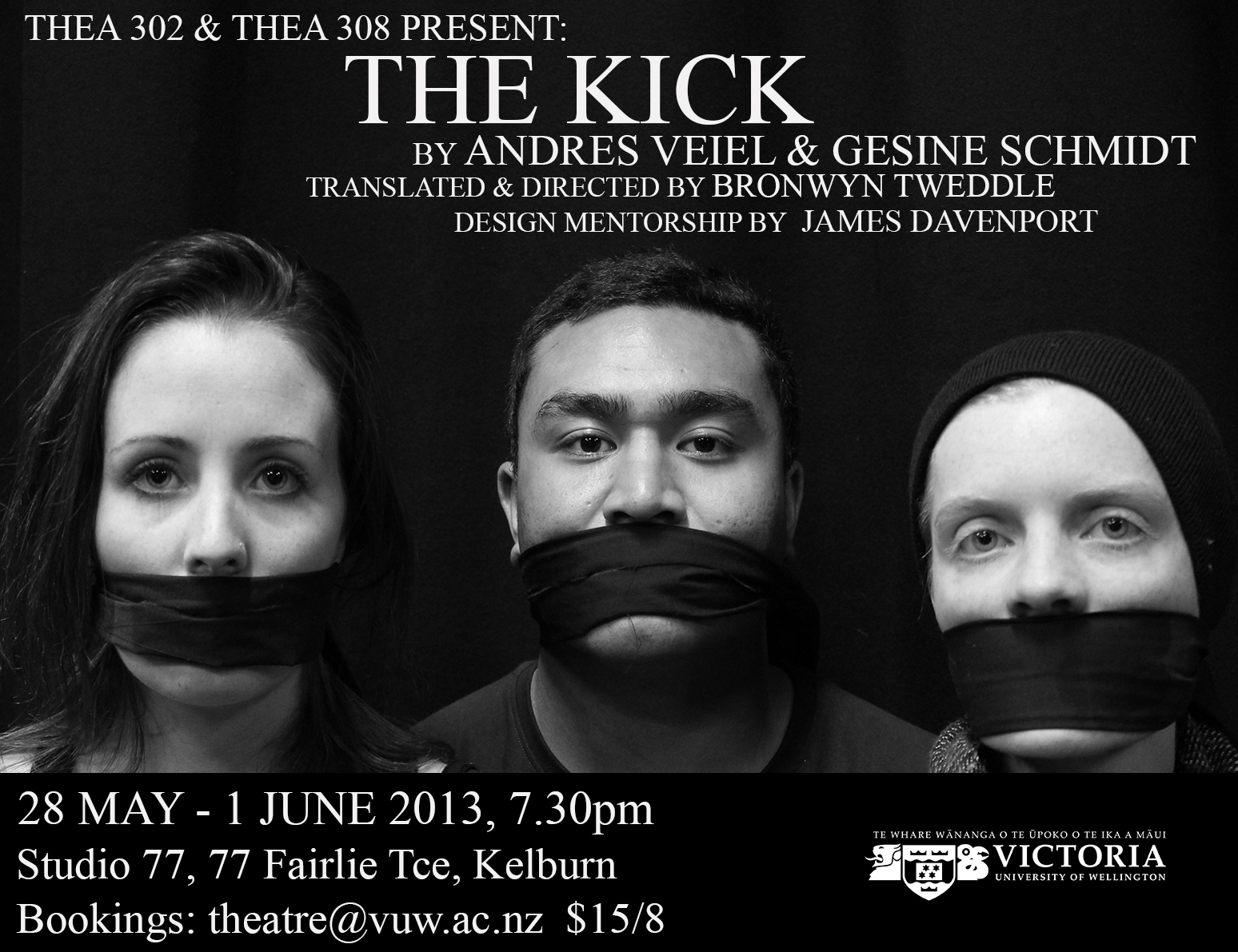
Production - The Water Station
Date: 14–18 May 2013
Time: 7.30 pm
Venue: Studio 77, 77 Fairlie Terrace, Kelburn
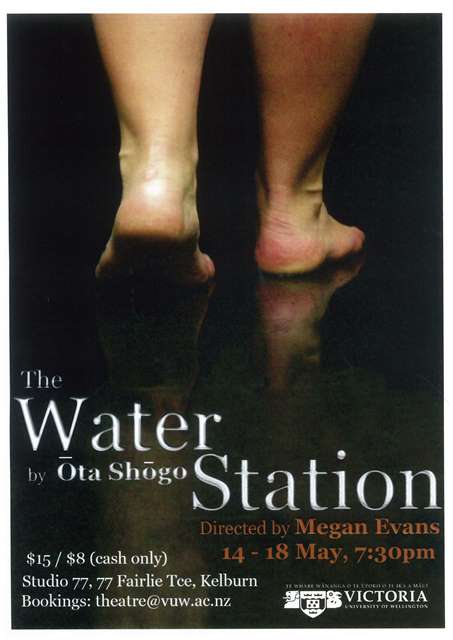
The Water Station, a language-less poetic work by acclaimed Japanese playwright Ōta Shōgo, is directed by Dr. Megan Evans and designed and performed by THEA 323 Intercultural Performance Practices students.
Since its premiere in 1981, international audiences have been captivated by this breath-taking exploration of human need and belonging, and now Wellington audiences have the chance to experience it.
The Water Station runs from Tuesday 14th to 18th of May, at Victoria University’s Studio 77, and promises to be a unique theatrical experience on the Wellington arts calendar.
Production - Adrift
Date: 17–20 October 2012
Time: 7.00 pm
Venue: Commencing from Churchill Park, Seatoun. At carpark entrance, corner of Hector and Dundas streets, Seatoun
"Listen, the mighty being is awake"
There have been over 150 recorded shipwrecks in Cook Strait.
Since Wellington Harbour's discovery by the explorer Kupe, its beauty and mystique have drawn people into the relative safety of its waters. But the waters surrounding our city hold a violent past.
Join the THEA 323 ensemble at the campfire and wind your way along Seatoun Beach. This innovative piece of site specific theatre will take you on a journey, discovering the stories of the sea, the people who love it and those who are forever changed by its ferocious beauty.
Bookings: Phone 463 5359 or email theatre@vuw.ac.nz
Production - Camino Real
Date: 9–13 October 2012
Time: 7.00 pm
Venue: Studio 77, 77 Fairlie Terrace, Kelburn (Gate 10, Victoria University of Wellington)
Join the ensemble of THEA 303 in the crazy fiesta that is Camino Real. A poetic serio-comic that will take you through a carnival of temptation, desperation and dream-like exaggeration.
Tennessee Williams, one of the most admired playwrights of the 20th century is renowned for his realist style as seen in A Street Car Named Desire. Camino Real liberates Williams into colourful surrealist style.
This is the graduation show for the cast, the culmination of three years of study, integrating practical creative work alongside critical and historical study. The students of THEA 303, under the direction of Dr Lori Leigh have taken one of Williams’ most vibrant plays and made it their own. As well as taking on multiple acting roles, they have fashioned innovative production elements, such as music, projection and costume to create a visual and aural aesthetic.
Bookings: Phone 463 5359 or email theatre@vuw.ac.nz
Production - Business as Usual
Date: 26–29 September 2012
Time: 7.00 pm
Venue: Studio 77, 77 Fairlie Terrace, Kelburn (Gate 10 of Victoria University)
Join 12 of Wellington’s up and coming theatre directors in 2 nights of tasty, sneak peak samples of established works by well known innovative playwrights.
Season 1: Wednesday 26th & Friday 28th September @ Studio 77, 7pm
The Misandrist by Jean Betts directed by Bronwyn Cheyne
Unveiling by Vaclav Havel directed by Esther White
Orpheus Descending by Tennessee Williams directed by Xanda Eves
Gross Indecency by Moisés Kaufmann directed by Genevieve Krefft
The Hand on the Rail by Bruce Mason directed by Nicola Morine
Lovesong by Abi Morgan directed by Anna Robinson
Season 2: Thursday 27th & Saturday 29th September @ Studio 77, 7pm
Eat Your Heart Out by Nick Hall directed by Chris Swney
Who’s afraid of the Working Class by Various directed by Annaliese Booth
Memento by Angie Farrow directed by Kathryn Harris
Buyer’s Market by L.B. Hamilton directed by Bop Murdoch
Night by Harold Pinter directed by Andrew Clarke
Rosencrantz & Guildenstern are Dead by Tom Stoppard directed by Sam Phillips
Bookings: Phone 463 5359 or email theatre@vuw.ac.nz
Production - On the Edge
Date: 18–28 July 2012
Time: 7.30 pm
Venue: Studio 77, 77 Fairlie Terrace
Victoria University of Wellington Theatre Programme
and
THEA 406
present
On the Edge
A series of fast paced, provocative and engaging theatre pieces by young up-and-coming directors
New takes on classics, and weird and wonderful avant garde plays, make up the two short seasons of On The Edge, brought to you by the five young directors. The seasons are diverse, featuring playwrights such as award winning local, Miria George, controversial Englishman Mark Ravenhill and classic Russian dramatist Anton Chekhov.
Absolutely fresh, unquestionably wild and showcasing the very individual mindsets of each director, On the Edge will afford audiences a glimpse at the future of Kiwi theatre and a chance to witness the early work of what might become big names in the industry.
The directors are bringing a fresh new take on theatre, creating something that will leave an imprint on the Wellington creative scene. To follow the young directors on their journey, and find out more about On The Edge follow us on Facebook.
Season one runs from 18 to 21 July and includes The Bear by Anton Chekhov translated by Michael Frayn and Yesterday an Incident Occurred by Mark Ravenhill.
Season two runs from 25 to 28 July and includes He Reo Aroha by Jamie McCaskill and Miria Geogre, and what remains by Miria George and Naomi in the Living Room by Christopher Durang.
7.30 PM, Wed 18 July – Sat 21 July (Season 1), Wed 25th July – Sat 28th July (Season 2)
Studio 77, 77 Fairlie Terrace, Kelburn Wellington
Tickets: $8 unwaged / $15 waged, book at theatre@vuw.ac.nz or phone (04 463 5359)
Production - Summerfolk
Date: Tuesday June 5th - Saturday June 9th, 7pm
Time: 7.00 pm
Venue: 77 Fairlie Terrace
Summerfolk
Produced by THEA 301 & 308, Directed by David O'Donnell & Rachel Lenart
"If you had a grudge against me you'd tell me, wouldn't you?"
The warm summer air turns to poison for a group of wealthy holiday-makers when their dirty laundry is hung out to dry. As the season thickens with wine and whispered secrets, the Basovs' idyllic retreat becomes a prison of stifling excess. And some want out.
A revolution can happen anywhere. Directed by David O'Donnell and Rachel Lenart, Victoria University's Theatre 301 & 308 takes Maxim Gorky’s razor-sharp satire and presses it against New Zealand’s bach culture, to lay bare the beating heart of our ultimate success symbol.
Bookings can be made by emailing theatre@vuw.ac.nz with "Summerfolk booking" as the subject and the amount of tickets you would like in the email content.
Ticket prices: $15 waged. $8 unwaged
Production - Shitshow
Date: 15–19 May 2012
Time: 8.00 pm
Venue: Studio 77, 77 Fairlie Terrace
Presented by The Unconventionals & THEA 308
Inspired by Alfred Jarry's Ubu Roi
8pm, 15-19 May 2012
$8 / $15 Waged / Unwaged
Tickets available NOW from theatre@vuw.ac.nz
Click Here for further information
Production - Summer Shakespeare 2012
Date: 9 February – 3 March 2012
Time: 12.00 pm
Venue: The Dell
Summer Shakespeare 2012 presents
the Victoria University of Wellington Season of
Twelfth Night
Directed by Melanie Camp
The Dell, Wellington Botanic Gardens. BYO Picnics highly recommended.
“If music be the food of love, play on”
A night of frivolity, live music, food and wine, Melanie Camp’s production of one of Shakespeare’s most loved comedies is set by the seaside in the 1920s and promises to be a sassy, mischievous affair of colourful costumes and lively music. From raucous comedy to swooning romance, Twelfth Night swings through the many moods of love and life with wit and laughter.
Twelfth Night is directed by Melanie Camp, a student in the Master of Theatre Arts programme, co-taught between Victoria University and Toi Whakaari New Zealand Drama School. It features a vibrant cast of talented actors, including graduates and students of the Victoria University Theatre Programme and Toi Whakaari New Zealand Drama School. As well as a selection of New Zealand’s next generation of top actors, this well-rounded cast also includes more experienced performers including Todd Dixon, Ross Young and Kirsty Hamilton.
Gladstone Vineyard, Wairarapa 9-11 February, 5:30 pm
The Dell, Wellington Botanic Gardens 17 February-3 March, 7 pm (no show Mondays)
Matinee performances, Sunday 19 and 26 February, 4pm
Tickets $15 Full/ $10 Concession
Bookings through Downstage Theatre: Phone: 04 801 6946/ bookings@downstage.co.nz
Door sales on the night (eftpos available)
www.summershakespeare.co.nz
For more information on Summer Shakespeare, please click here
University Community Events
Poetry Reading - Truth or Beauty
Date: 26 November 2014
Time: 7.00 pm
Venue: Meow, 9 Edward Street, Wellington
A public poetry reading featuring trans-Tasman poets including:
Jordie Albiston (Australia)
Amy Brown (Australia)
Toby Davidson (Australia)
Joan Fleming (Australia / New Zealand)
Anna Jackson (New Zealand)
Harry Ricketts (New Zealand)
Jack Ross (New Zealand)
Erin Scudder (Australia / New Zealand)
Robert Sullivan (New Zealand)
Jessica Wilkinson (Australia)
Organised by Anna Jackson, Angelina Sbroma and Helen Rickerby.
Workshops
Media Workshop - Understanding anti-media campaigns
Date: 17 July 2014
Time: 2.00 pm
Venue: Room 103, 81 Fairlie Terrace
Martin Barker
From time to time, in very many countries, and over a long, long time, particular media – or particular kinds and contents of those media – have aroused public fears and started powerful moral campaigns, sometimes calling for and leading to censorship. It has happened with just about every medium you can think of: for example, plays (probably the earliest – in the mid-17th century); ‘sensational’ novels (the next big eruption); periodical publications (eg, the Penny Dreadfuls of the 19th century); films; comicbooks (one of the widest ever campaigns, in the 1950s); television, from time to time; pop and rock music; videogames; and perhaps most recently internet porn. These have been attacked from many different angles, sometimes failing, sometimes leading to restrictions, sometimes to outright banning.
In this workshop, we will think together about the questions which are raised by such campaigns, and the concepts and theories – helpful or unhelpful – which can be used to address them. We will also take a look at some of the languages which swirl through and around them, and think about what might be learnt by thinking of them as ‘concepts’ and ‘theories’. So, I suggest we begin by compiling a working list of concrete cases that you have some awareness of – think about their similarities and differences – and try to pull out for closer examination their implicit claims about how those media might ‘work’ on their audiences. Such implicit claims ought at least to be thought about, whether or not we want in the end to contest them.
So, come to the workshop with a list in your pocket of:
a) Specific campaigns, and their targets: what you feel you know about them, what you don’t know about them but feel it would help to know;
b) The key claims you believe the campaigners are making about the dangers of their ‘objects’;
c) Which side you find yourself on.
We’ll build our discussions from this starting point and see where it takes us.
I’ve been researching such anti-media campaigns for over thirty years, and have come to realise how varied and complex these campaigns are, for all their sometimes surface similarities. But I don’t want this workshop to turn into a space for me to tell you things I have done, and conclusions I have come to. Maybe we will leave some time at the very end for questions and answers about these, but I leave this up to you.
Martin Barker is Emeritus Professor at Aberystwyth University, and currently Visiting Professor, Deakin University, Melbourne. Across his research career he has addressed many areas, including: racism in Britain; comicbooks; theories of ideology; moral campaigns over the media; and specific topics such as adaptations of The Last of the Mohicans, the cycle of Iraq War films (2006-10), and the rise of livecasting to cinemas. However in the last twenty-five years he has particularly focused on researching film audiences, including undertaking research for the British Board of Film Classification, and leading the two world projects considered in this presentation.
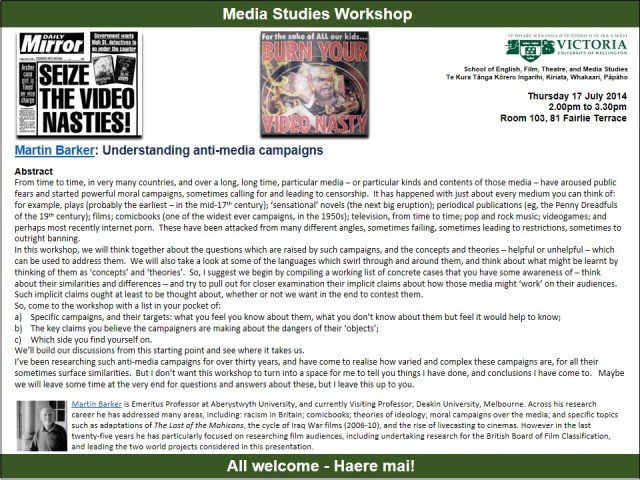
Workshop - Vertical Media
Date: 4 November 2013
Time: 9.30 am
Venue: 77 Fairlie Terrace, Kelburn Campus
This workshop explores the creative possibilities that hand held devices offer for moving-image culture with particular emphasis on the opportunity for new vertical (portrait) framing. Alongside practical workshop activities, Miriam Ross and Maddy Glen, from Victoria University of Wellington, will discuss their Vertical Cinema project; Dave Neal, creator of Alicewinks will discuss his vertical animation work; and Matt McGregor from Creative Commons New Zealand and Thomasin Sleigh from DigitalNZ will discuss licencing of and access to existent content.
Attendance at the workshop is free but space is limited. Please get in touch with Miriam Ross before 27 October in order to register.
The programme (![]() PDF, 97.63 KB) of this one-day-workshop is subject to minor changes.
PDF, 97.63 KB) of this one-day-workshop is subject to minor changes.
